




Brock University acknowledges the land on which we gather is the traditional territory of the Haudenosaunee and Anishinaabe peoples, many of whom continue to live and work here today. This territory is covered by the Upper Canada Treaties and is within the land protected by the Dish with One Spoon Wampum Agreement. Today, this gathering place is home to many First Nations, Métis and Inuit peoples and acknowledging reminds us that our great standard of living is directly related to the resources and friendship of Indigenous people. brocku.ca/indigenous/
The following table illustrates the financial results of the University presented on a funding basis as well as in accordance with accounting standards for not-for-profits (NFPS). A reconciliation between the two presentations can be found starting on page 62.
Figure 1
(1) Calculated using financial information from 13 other comprehensive universities. Certain 2022 metrics have been updated due to revisions in certain universities’ financial statements.
Brock’s tuition is slightly below the average; however, grant revenue per student continues to be well below the sector average. Naturally, Brock operates more efficiently given the below-average government funding, and this is seen in the lower personnel costs per student. As seen across the sector personnel cost per student are trending upward due to inflation and pressures from collective agreements. Interest and investment income metrics are in line with Brock’s financial health metrics, as detailed below.

Dear Brock community,
Lesley Rigg, President and Vice-Chancellor
I hope you enjoy this opportunity to look back at another wonderful year at Brock.
This annual report is a fantastic way to celebrate all that we’ve accomplished together this year, and sets the stage for Brock’s 60th anniversary, which we’ll celebrate starting in September.
Among our many successes this year, our continued commitment to offering an exceptional experience for our students stands out.
A key part of that experience is the innovative academic programming we offer our students – programming like that offered by the Yousef Haj-Ahmad Department of Engineering, which started accepting undergraduate students this year.
It’s also been a tremendous year for our researchers, who among other things secured an historic high of Natural Sciences and Engineering Research Council of Canada (NSERC) funding supporting work on everything from climate change to the development of self-healing, long-lasting silicone polymers.
And of course we continued to partner with individuals and organizations in a wide range of areas in support of community needs, just as we have since 1964.
Brock is a fantastic place to learn and work. The Brock community, the Brock team, is what makes this place so very special. And it’s important that we take the time to celebrate our accomplishments.
Congratulations on another great year at Brock!


Dear Brock community,
Mark Arthur, Chair of the Board, Brock University
As Chair of Brock University’s Board of Trustees, I’m pleased to introduce this year’s annual report.
This report is a wide-ranging look at all that Brock has achieved this year and celebrates the University’s strong commitment to the student experience, impactful research and innovative teaching and learning.
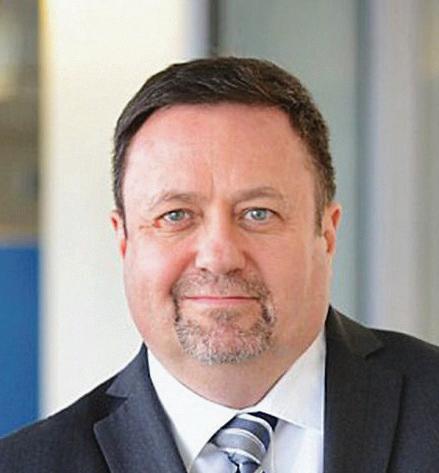
I want to take this opportunity to thank all members of the Brock team for their hard work and dedication to making Brock such an exceptional institution. You are the reason we’re able to accomplish so many great things each year.
I’m incredibly proud of our achievements this year and look forward to continued success as we head into Brock’s 60th anniversary year.
Don Cyr, Chair of Senate, Brock University In the realm of research, notable achievements include a grant of over $2.4 million for researchers at Brock University’s Cool Climate Oenology and Viticulture Institute (CCOVI), aimed at strengthening Canada’s grape and wine industry. Additionally, Brock researchers secured a $3.5-million grant from the Canada Foundation for Innovation for the Clean Agriculture for Sustainable Production Field Infrastructure project, which will establish a research farm near Brock’s main campus to develop agricultural innovations in collaboration with scientists from other institutions and industry.
Brock University, like all Ontario universities and the broader post-secondary sector, confronts challenges stemming from ministerial restrictions on tuition increases and funding, compounded by rising costs due to inflation. Moreover, while the University has been approved for the same number of international students as in the prior year, federal restrictions on international student visas may pose obstacles to recruiting such students. In recent years, revenue from international tuition has bolstered the financial sustainability of many universities, while enriching the educational experience and contributing economically to regions like Niagara.
Despite these challenges, the University Senate collaborated once again with the administration and the Board of Trustees to pass a motion endorsing the 2024-25 budget, aligning it with the institution's academic policy. However, the motion acknowledged that ongoing reductions in the coming years could jeopardize the high quality of Brock University’s academic programs and research.
The University Senate remains committed to rigorous program review, ensuring excellence across all levels of education. This year, several new and ongoing agreements were approved for collaborative programming and transfer credits with various Ontario colleges, offering innovative pathways for students transitioning from college to degree programs at Brock.
In a global assessment of university sport management research, Brock University ranked first in Canada and ninth overall. Furthermore, Brock University is poised to launch a new PhD program in Applied Behavior Analysis, housed in the Department of Applied Disabilities Studies. This program, the first of its kind in Ontario and only the second in Canada, marks a significant milestone in the University's academic offerings.
Finally, the Yousef Haj-Ahmad Department of Engineering is preparing to welcome its inaugural class of undergraduate students in September 2024. The launch of this engineering degree program, long anticipated and planned at Brock, is especially fitting as the University approaches its 60th year of celebration.
The University was incorporated in 1964 through The Brock University Act (the Act), a Statute of the Province of Ontario. The University is governed by the Act. The governance, conduct, management and control of the University’s property and the conduct of its business affairs is vested in the Board of Trustees (the Board), while the Senate is responsible for the educational policy of the University. This bicameral system of governance is shown below.
• Réjeanne Aimey, Community Trustee
• Mark Arthur, Community Trustee, Chair of the Board
• Anteneh Ayanso, Faculty Trustee
• Greg Berti, Community Trustee
• Don Cyr, Faculty Trustee, Chair of Senate
• Jonathan Davey, Community Trustee
• Arti Freeman, Community Trustee
• Allie Hughes, Community Trustee
• Nyarayi Kapisavanhu, Community Trustee
• Kristian Knibutat, Community Trustee
• Laura Lane, Staff Trustee
• Brian Lang, Community Trustee
• Kevin Magee, Community Trustee
• Dan Malleck, Faculty Trustee
• Anne McCourt, Community Trustee, Vice-Chair of the Board
• Marleen McMaster, Community Trustee
The Board consists of 26 members including 17 community trustees elected by the Board, one graduate and one undergraduate student, three faculty members (including the Chair of Senate), and two staff members elected by their respective constituencies. The Chancellor and the President and Vice-Chancellor are ex officio members of the Board.
• Matthew Melnyk, Staff Trustee
• James Maxwell-Barillas, Student Trustee
• Hilary Pearson, Chancellor
• Lesley Rigg, President and Vice-Chancellor
• JoAnna Roberto, Community Trustee
• Christine Sawchuk, Community Trustee
• Stephanie Thompson, Community Trustee
• Robert Welch, Community Trustee
• Rakha Zabin, Student Trustee
• Debbie Zimmerman, Community Trustee
As of the time of preparation of this report, the Senate consists of 71 members, including 38 elected full-time teaching staff and professional librarians, two members of the Board, six undergraduate students and two graduate students elected by their respective constituencies. There are also 23 ex officio members of the Senate.
Members ex officio
• Hilary Pearson (Chancellor)
• Lesley Rigg (President and Vice-Chancellor)
• Tim Kenyon (Interim Provost and Vice-President, Academic)
• Jennifer Guarasci (Interim Vice-President, Administration)
• Brian Power (Vice-Provost and Associate Vice-President, Academic)
• Suzanne Curtin (Vice-Provost, Graduate Studies and Dean, Faculty of Graduate Studies and Postdoctoral Affairs)
• Robyn Bourgeois (Vice-Provost, Indigenous Engagement and Co-Chair, Aboriginal Education Council)
• Rajiv Jhangiani, (Vice-Provost, Teaching and Learning)
• Peter Berg (Dean, Faculty of Mathematics and Science)
• Carleigh Charlton (Designate for BUSU President, and Vice-President, University Affairs, BUSU)
• Barry Wright (Dean, Goodman School of Business)
• Ingrid Makus (Dean, Faculty of Social Sciences)
• Michelle McGinn (Acting Vice-President, Research)
• Carol Merriam (Dean, Faculty of Humanities)
• Peter Tiidus (Dean, Faculty of Applied Health Sciences)
• Mary-Louise Vanderlee (Interim Dean, Faculty of Education)
• Geraldine Jones (Registrar and Associate Vice-President, Enrolment Services) (non-voting)
• Nicole Nolan (Interim University Librarian)
• Mark Arthur (Chair, Board of Trustees)
• Brad Clarke (Associate Vice-President, Students)
• Christopher Yendt (Alumni Association Representative)
• Thomas Winger (President, Concordia Seminary)
• Rakha Zabin (President, Graduate Students’ Association) (non-voting)
Note: Faculty of Applied Health Sciences (FAHS); Goodman School of Business (GSB); Faculty of Education (FOE); Faculty of Humanities (FOH); Faculty of Mathematics and Science (FMS); Faculty of Social Sciences (FOSS); Faculty of Graduate Studies and Postdoctoral Affairs (FGSPA); and Brock University Student Union (BUSU).
Full-time teaching staff/professional librarian representatives
• Anteneh Ayanso (GSB)
• Julia Baird (FOSS)
• Michael Berman (FOH)
• Irene Blayer (FOH)
• Alison Braley-Rattai (FOSS)
• Christine CarpenterCleland (FMS)
• Liz Clarke (FOSS)
• Rosemary Condillac (FOSS)
• Maureen Connolly (FAHS)
• Don Cyr, Chair (GSB)
• Drew Dane (FOSS)
• Fayez Elayan (GSB)
• Bareket Falk (GSB)
• Amy Friend (FOH)
• Kimberley Gammage (FAHS)
• Samantha Hajna (FAHS)
• Nicholas Hauck (FOH)
• Nota Klentrou (FAHS)
38
• Kelli-an Lawrance (FAHS)
• Jingyu Li (GSB)
• Dan Malleck (FAHS)
• Tim Murphy (FOSS)
• Michael O’Sullivan (FOE)
• Marcel Oestreich (FOSS)
• Unyong (Howard) Pyo (GSB)
• Monica Rettig (Library)
• Brian Roy (FAHS)
• Larry Savage, Vice-Chair (FOSS)
• Michael Savage (FOE)
• R. Angus Smith (FOH)
• Kirsty Spence (FAHS)
• Tek Thongpapanl (GSB)
• Dawn Trussell (FAHS)
• Francine Vachon (GSB)
• Terrance Wade (FAHS)
• Michelle Webber (FOSS)
• Shannon Welbourn (FOE)
• Dawn Zinga (FOSS)
Representatives of the Board of Trustees
• Kristian Knibutat
• Kevin Magee
Undergraduate student representatives
• Mark Chrabalowski
• Mohammed Isam
• Nabiha Ghafoor
• Alyan Hassan
2
6
• Oguejiofor (Daniel) Tochukwu
• Lillian Zabeneh
Graduate student representatives
• Larissa Lobo
• Samrath Singh
2
The University’s current strategic plan entitled “Niagara Roots – Global Reach,” referred to throughout the text of this document as the “Institutional Strategic Plan,” was implemented in 2018 and guides the institution until 2025. Led by the Office of the President, the strategic planning process has begun to develop a revitalized strategic plan aiming to help the institution deliver on its mission of supporting students and faculty in the discovery of knowledge through exemplary scholarship, teaching, services and community outreach with the goal of releasing the plan in line with the celebration of Brock’s 60th. The current Institutional Strategic Plan, including the Guiding Values, can be viewed at brocku.ca/strategic-plan/
Brock University is a dynamic, comprehensive university that makes a positive difference in the lives of individuals in our Brock community, the Niagara region, Canada and the world through leadership, innovation and excellence in learning, teaching, research, scholarship and creativity across disciplines.
Brock flourishes through the scholarly, creative and professional achievements of our students, faculty and staff. Although we share a common purpose, we recognize and honour knowledge pursued through diverse perspectives and approaches. Our academic mission is to nurture and support our students and faculty in the discovery of knowledge through exemplary scholarship, teaching and service.
We provide undergraduate, graduate and professional education of the highest quality. Our graduate programs enhance Brock’s growing reputation for excellence in teaching, research, creativity and innovation. We provide a transformative experience for our students inside and outside the classroom by helping to develop their full potential as educated and engaged citizens in local and global communities. Brock graduates go out into the world as leaders, with a track record of entering fulfilling careers across all disciplines.
Brock University works to enhance the economic, social, cultural and intellectual lives of the communities around us – Niagara, Ontario,
Canada and globally – and to demonstrate the vital ways in which we contribute to the well-being and betterment of society in the 21st century.
The Institutional Strategic Plan establishes four strategic priorities, along with associated goals and action items, to advance Brock’s vision over the next seven years.
Strategic priority: Offer a transformational and accessible academic and university experience
To be a destination of choice for undergraduate, graduate and part-time students, we must ensure an academic and university experience that positively transforms our students’ abilities, understanding and impact on the world. We teach future-ready students and equip lifelong learners with a zest for knowledge, skills and competencies that will enable them to achieve their full academic, professional, career and life potential. Core to our student experience is the development of engaged citizens who are resilient, involved, career-ready and versatile.
Strategic priority: Build research capacity across the University
Our research focus is central to our identity. Brock will invest in building a world-leading research institution that is grounded in scholarly excellence and strong graduate and post-graduate programs. We will leverage our strengths within and across disciplines to enhance research impact.
Strategic priority: Enhance the life and vitality of our local region and beyond Brock is committed to working with the communities in Niagara, Ontario, Canada and the world. Through local and global connections, we increase opportunities for the residents of Niagara. By responding to the needs of society and supporting its growth and development, we strengthen community vitality and vibrancy.
Strategic priority: Foster a culture of inclusivity, accessibility, reconciliation and decolonization
At Brock, we believe that a diverse and welcoming learning community is built upon the foundation of exceptional students, faculty, staff and alumni. This requires that Brock be attractive and welcoming to people of all identities, and accepting of the unique histories and experiences of Indigenous people within the Canadian state.
Our strategic priorities set the University on the path towards greater national and global recognition for its engagement and relevance to students and communities through enhanced innovation and excellence in teaching, learning, discovery, creativity and the application of knowledge across disciplines.
Strategic Focus and Priorities
O er a transformational and accessible academic and university experience Build research capacity across the University
Enhance the life and vitality of our local region and beyond
Foster a culture of inclusivity, accessibility, reconciliation and decolonization
Integrity and respect Freedom of thought and expression coupled with academic responsibility
(1) The colours in the graphic include Brock’s brand standards and those from the Indigenous Medicine Wheel, the Pride Flag and the Dish with One Spoon Wampum Agreement Flag.




Faculty of Applied Health Sciences (FAHS) Goodman School of Business (GSB) Faculty of Education (FOE) Faculty of Humanities (FOH) Faculty of Mathematics and Science (FMS) Faculty of Social Sciences (FOS



Figures represent the number of students in each Faculty of Major on Nov. 1 of each Academic Year (as per PFIS-USER submissions). In addition, figures also include new-entry enrolments as of Feb. 1 for certain programs. Starting in the 2024-25 Budget Report these headcount figures no longer include Continuing Teacher Education enrolment. The prior year figures have been adjusted for comparability.




Source: AppDetails BrockDB on Feb. 26, 2024. (students who applied to Brock for more than one program are only included once).






We can talk about revenue and expenses, but it is really our people and their accomplishments that make Brock University “BU.”


STRATEGIC PRIORITY:
Offer a transformational and accessible academic and university experience.
To be a destination of choice for undergraduate, graduate and part-time students, we must ensure an academic and university experience that positively transforms our students’ abilities, understanding and impact on the world. We teach future-ready students and equip lifelong learners with a zest for knowledge, skills and competencies that will enable them to achieve their full academic, professional, career and life potential. Core to our student experience is the development of engaged citizens who are resilient, involved, career-ready and versatile.

• Deliver high-quality programs that meet the interests and needs of students and support them to achieve their potential in life.
• Expand Brock’s lifelong learning opportunities for our students and members of the community.
• Provide an engaging campus experience that meets students’ needs and affords social, cultural and recreational opportunities.
• Offer globally oriented learning and experience opportunities.
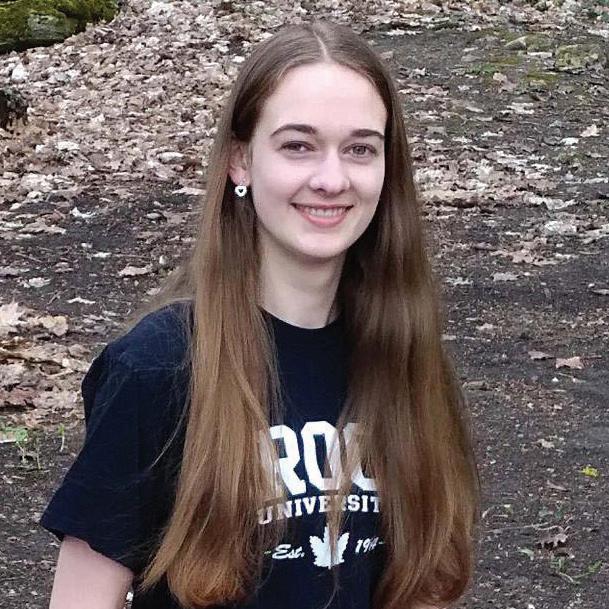
Brock Business professor named 3M National Teaching Fellow
Brock University Marketing Professor Kai-Yu Wang has been awarded a 2023 3M National Teaching Fellowship. With only 10 given out nation-wide each year, the award is considered one of Canada’s most prestigious post-secondary teaching excellence awards. Wang, who is also Chair of the Marketing, International Business and Strategy Department in the Goodman School of Business, says it feels unreal to receive recognition for the extremely competitive award. Wang says. “This award means a lot to me personally and I hope it can encourage my colleagues in business in their own teaching.”
brocku.ca/brock-news/2023/05/brockbusiness-professor-named-3m-nationalteaching-fellow/
STARS program invites high school students to earn university credits
The University’s Strategic Transition for Accomplished and Recognized Students (STARS) program allows Niagara high school students enrolled in less than six Grade 12 U or M courses to register concurrently in one credit at Brock University, free of charge. For Ada Fast, who learned about the program while exploring her high school’s guidance resource website, the studies represented a chance to begin her post-secondary journey. “When I was in STARS, I was able to interact with university students, share their enthusiasm about the material and feel like I belonged here,” she said. “I knew that when I started my full-time studies at Brock, I would be ready.”
brocku.ca/brock-news/2023/05/starsprogram-invites-high-school-students-toearn-university-credits/


Brock explores future of AI with advisory group, academic integrity study
Brock experts are gathering critical data to help navigate the new technological landscape of artificial intelligence (AI) and provide insight for post-secondary institutions. Rahul Kumar and Michael Mindzak, researchers with AI expertise and Assistant Professors in the Department of Educational Studies, are representing Brock in the Canada-wide Artificial Intelligence and Academic Integrity Study (AIAI Study), building on a previous study in spring 2022. Led by the University of Calgary, with partner institutions including Brock, Toronto Metropolitan University and University of Saskatchewan, the current study aims to answer key questions about the future of AI and text-based tools.
brocku.ca/brock-news/2023/07/brockexplores-future-of-ai-with-advisory-groupacademic-integrity-study/
Brock course recognized with prestigious teaching award
Brock University was celebrated for an immersive course in the Faculty of Humanities providing students with a opportunity to gain expertise with rare historical texts. The Modern Language Association of America (MLA) awarded the prize to Professor of English Leah Knight and Head of Archives and Special Collections David Sharron for the course MARS 4P01: Sources and Methods in Medieval and Renaissance Studies. The award recognizes outstanding coursework developed in partnership between faculty members and academic librarians in language and literature. In the course, each student studies one rare book exclusively for the duration of the course, investigating topics ranging from botany, poetry, cultural histories and early examples of biographies. brocku.ca/brock-news/2024/01/brock-course-recognized-withprestigious-teaching-award/

Biological Sciences student wins top spot at Brock 3MT competition
A group of 12 graduate students went head-to-head on March 28, 2024, for a chance to represent Brock at the Three Minute Thesis (3MT) provincial finals in May 2024. First-place winner Zoe Gagnon (BSc ’23) captivated the audience and judges with her presentation of “The role of semaphorin 3A on hippocampal plasticity in the adult mouse brain,” taking home the People’s Choice award. “It’s a great feeling as it confirms that the audience is understanding the complex research I’m putting out there,” said Gagnon. “Trying to contextualize protein biochemistry so people can understand and get excited about it in three minutes was one of the biggest challenges.” brocku.ca/brock-news/2024/04/biological-sciences-student-wins-topspot-at-brock-3mt-competition/
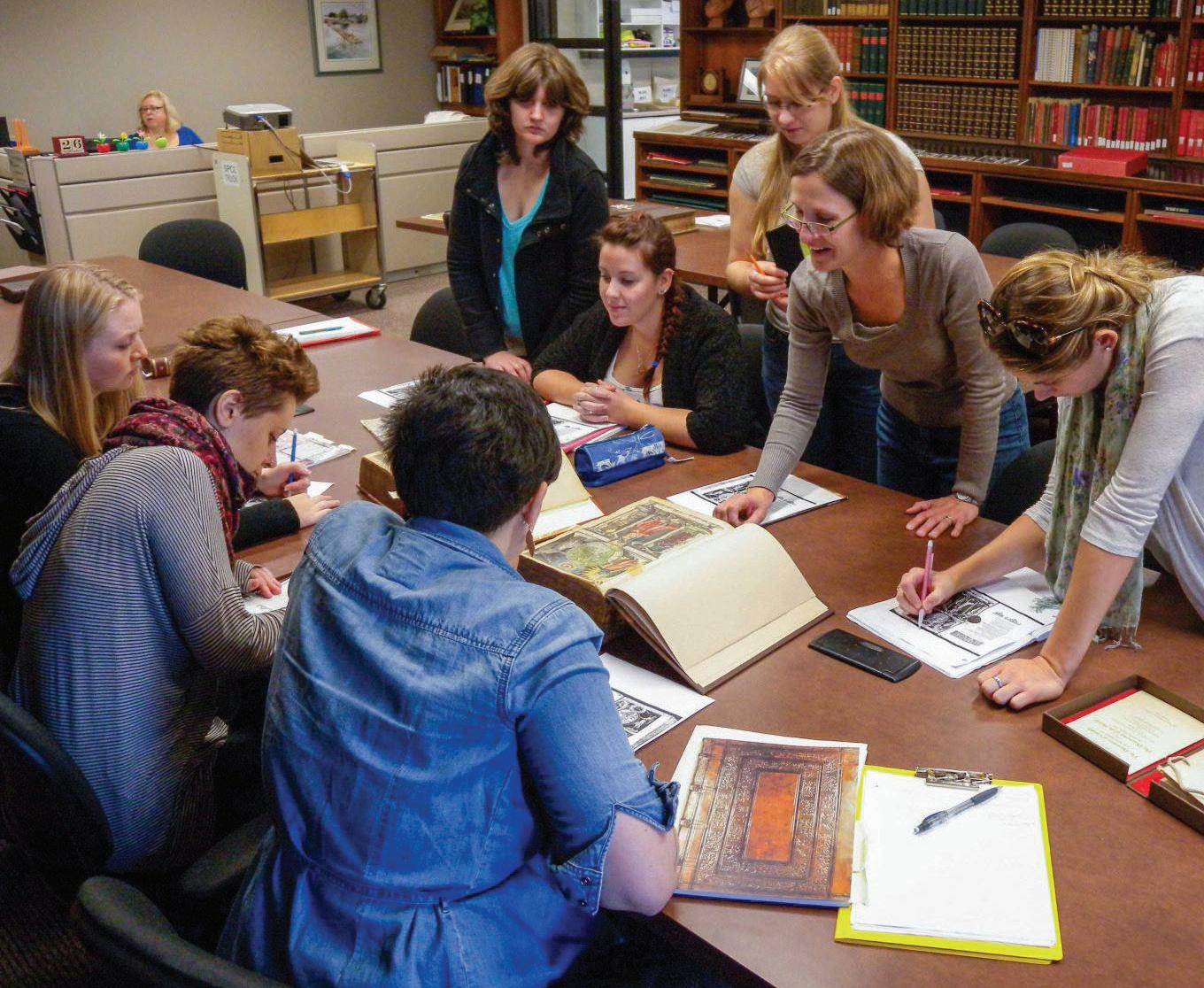
Brock’s business school receives prestigious accreditation extension
The Association to Advance Collegiate Schools of Business (AACSB), the longest-serving global accrediting body for business schools, has extended the accreditation of Brock University’s Goodman School of Business. Announced June 29, 2023, by the organization, the accreditation places Goodman among an elite group, with less than six per cent of business schools worldwide obtaining accreditation. Goodman was the third business school in Ontario to join AACSB when the School was first accredited in 2002. Goodman Dean Barry Wright says the recognition is something everyone at the School can take pride in achieving. "Having our AACSB accreditation extended reaffirms that Goodman is truly recognized by others as a leading business school,” he said. brocku.ca/brock-news/2023/06/brocks-business-school-receives-prestigiousaccreditation-extension/

Brock grad students finish first in biomechanics challenge
A group of Brock University graduate students took top spot for the first time in a biomechanics challenge hosted by 3D motion capture equipment provider Movella. This year, 81 teams from 28 countries were asked to create a coaching model for cross-country skiers by analyzing data collected from eight athletes who completed laps at varying degrees of difficulty while wearing Movella’s XSens sensor-equipped suits. Teams were given two weeks to analyze the data and prepare a presentation to share with judges. As in previous years, Assistant Professor of Kinesiology Shawn Beaudette offered the experiential education opportunity to students in his Advanced Biomechanics Research Methods class. brocku.ca/brock-news/2023/05/brock-grad-students-finish-first-inbiomechanics-challenge/
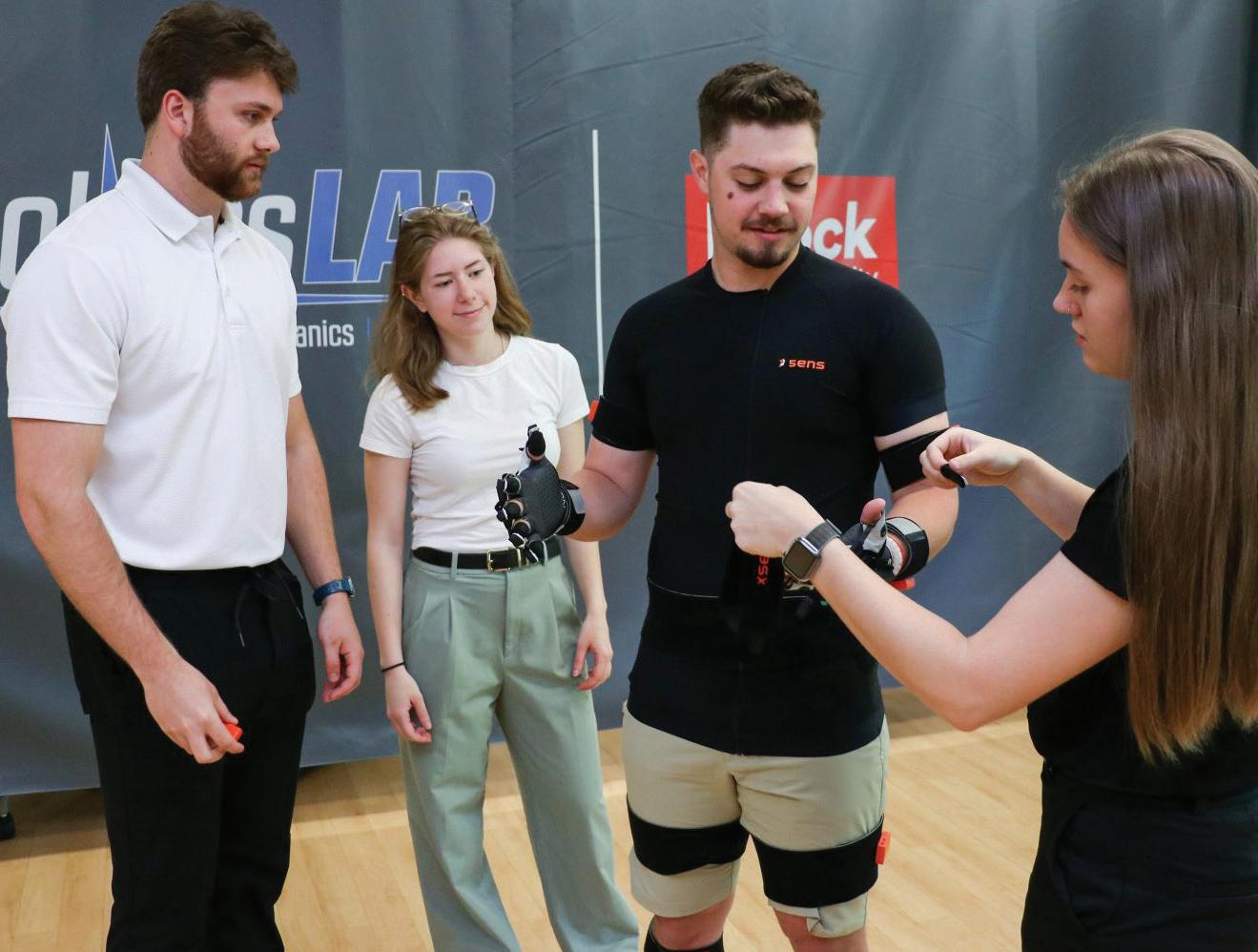

Education student receives prestigious Prime Minister’s Award
Brock Bachelor of Early Childhood Education (BECE) student Ala Mohamed, wants to make sure that no child is left behind, advocating for children of all abilities and needs to be included and supported in their education and beyond. Mohamed was recently recognized with the Prime Minister’s Award for Excellence in Early Childhood Education, receiving a Certificate of Achievement for her work with YWCA Hamilton. The award honours Mohamed’s deep commitment to inclusion for children with exceptional needs. “I love motivating families and being there for them when they need it most – when they have faced challenges based on the needs of their children and are looking for quality child care that will provide the support they need,” she said. In her role as Children’s Services Manager at YWCA Hamilton, Mohamed works with the Ministry of Education, City of Hamilton and community partners to oversee various programs providing quality child care to the community. brocku.ca/brock-news/2023/11/education-student-receivesprestigious-prime-ministers-award/
Brock students make their mark at national convention
A group of GAME students hit the road to share their Brock experience and award-winning game with the world. The fourth-year Brock students were invited to attend the sold-out Anime North 2023 convention after their game, Mousu, beat out 100 other teams to win first place in the People’s Choice category at the 2023 Level Up Student Showcase. Anime North 2023 is Canada’s largest convention celebrating anime, manga, games and other elements of Japanese culture. Exhibiting at a three-day convention was an important experiential learning opportunity, allowing the students to hone vital skills needed for a successful career in the digital gaming industry. brocku.ca/brock-news/2023/05/game-students-make-theirmark-at-national-convention/

In an assessment of university sport management (SPMA) research contributions across the world, Brock University ranks No. 1 in Canada and ninth overall out of the 62 universities included in the assessment. Published annually by the University of North Texas' Sports Innovation Project, this year's ranking considered the number of research publications produced over the past decade within three of the world's flagship sport management journals. Brock SPMA faculty are leading the advancement of knowledge in areas such as digital marketing, enhanced governance practices in sport, and improved systems of people and culture. They have produced impactful findings related to issues that address equity, diversity and inclusion across various sport sectors. brocku.ca/brock-news/2023/07/brock-top-canadian-university-forsport-management-research/

New summer workshop puts students at centre of creative process
Brock arts students have been honing their creative skills and working alongside professional theatre artists through a new summer workshop series presented by the Department of Dramatic Arts (DART). The inaugural DART Summer Institute of Performance Research ran from May 29 to July 7, 2023, at the University’s Marilyn I. Walker School of Fine and Performing Arts (MIWSFPA). Conceptualized by DART Chair and Professor Jennifer Roberts-Smith, the workshop allowed students to be at the centre of the creative process as professional theatre-makers, artists and DART faculty explored performance ideas, working scripts and scenic possibilities for future work. brocku.ca/brock-news/2023/07/new-summerworkshop-puts-students-at-centre-of-creativeprocess/
Inaugural event celebrates undergrad Math and Science research
From predicting professional hockey outcomes to printing 3D models of crystal structures, undergraduate Brock students showcased their work at the recent Faculty of Mathematics and Science Undergraduate Research Symposium. Nearly two dozen students exhibited posters outlining their research and discussed their projects with faculty members and peers during the event in August, 2023. One of the student participants, Kristen Rose, a second-year Mathematics and Statistics student, shared her work in which she used regularized linear regression to predict professional hockey game outcomes and, in particular, how many goals topscoring players will score in their next game. brocku.ca/brock-news/2023/08/inaugural-event-celebratesundergrad-math-and-science-research/

Prestigious biotech research program opens doors for Brock student
Fourth-year Brock Biochemistry student Luka Lamaj was among an elite group of aspiring biotechnology leaders selected to participate in a prestigious undergraduate student research program in the summer of 2023. Lamaj spent three months in Cambridge, Mass., immersed in DojoHouse, a program run by Nucleate, a biotechnology nonprofit that hosts eight ambitious undergraduate students from across North America each year. Of the eight students accepted into DojoHouse, Lamaj was the only student from Canada with other participants coming from U.S.-based Ivy league schools such as Harvard, Princeton and Yale.
brocku.ca/brock-news/2023/10/prestigiousbiotech-research-program-opens-doors-forbrock-student/

Brock teacher candidate making women’s pro hockey history
Victoria Bach’s childhood dreams became a reality when she stepped on the ice in February 2024 in Toronto, making her debut in the newly launched Professional Women’s Hockey League (PWHL). The Indigenous athlete and Brock University student is simultaneously pursuing her other goal of becoming a teacher. “I have a lot of thanks to give to Brock. I chose the right university for my path, and I couldn’t be happier with my decision,” said Bach, who hopes to inspire youth through her career, both on and off the ice. In addition to her intense athletic training, Bach is completing her final semester in Brock’s Consecutive Teacher Education program in the Faculty of Education (FOE), balancing classes with practices. brocku.ca/brock-news/2024/01/brock-teachercandidate-making-womens-pro-hockey-history/

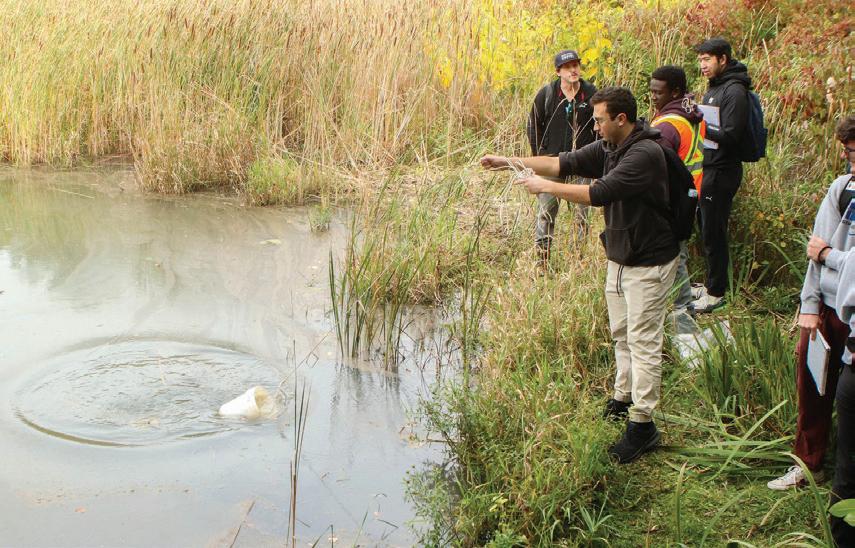
Brock will welcome the first class of undergraduate students into its innovative Yousef Haj-Ahmad Department of Engineering in fall 2024. The Integrated Engineering program takes key concepts from traditional engineering fields – such as mechanical, software and electrical – and brings them together into a single coherent program where students learn about each field as well as the connections between them. Unlike other engineering programs, the Yousef Haj-Ahmad Department of Engineering will provide students with a diverse and broad set of skills, preparing them to tackle some of society’s greatest challenges. brocku.ca/brock-news/2023/12/yousef-haj-ahmad-department-ofengineering-set-to-welcome-first-class-of-undergrads-in-2024/



The Faculty of Graduate Studies and Postdoctoral Affairs (FGSPA) has launched 10 graduate microprograms (GMPs) in Education, Professional Kinesiology and Public Health. GMPs allow students to gain graduate-level experience without the commitment of a master’s degree.
brocku.ca/brock-news/2024/03/brock-launches-graduate-microprograms/
With behaviour analysis set to become the newest regulated health profession in Ontario, Brock is launching a new PhD program in Applied Behaviour Analysis (ABA). Housed in the Department of Applied Disability Studies, the PhD in ABA will be the first of its kind in Ontario and will offer comprehensive training in behaviour analysis, including applications of the science with different populations across diverse settings. brocku.ca/brock-news/2023/11/brock-launches-ontarios-first-phd-inapplied-behaviour-analysis/
A new online graduate degrees pathway launching at Brock is aimed at students pursuing careers in health professions education. Offered jointly by the Department of Health Sciences and the Department of Educational Studies, the new Master of Public Health and Master of Education (MPH-MEd) consecutive degrees pathway will allow students to complete both master’s degrees in an exclusively online format within two years.
brocku.ca/brock-news/2024/01/new-brock-consecutive-masters-degreepathway-focuses-on-health-education/
Derek Foster, Associate Professor in the Department of Communication, Popular Culture and Film dug into conspiracy theories, propaganda and other languagebased public manipulation tactics to prepare for his new course, Language and Public Communication, which tackles the ways language is used to manipulate others from public relations to fake news.
brocku.ca/brock-news/2023/07/new-brock-course-to-explore-languageof-public-manipulation/
A new Brock course in environmental chemistry is teaching students how to measure the impact of human disturbances on ecosystems and what can be done to mitigate its effects. Through a mixture of in-class lessons, laboratory analysis and fieldwork, students are learning to use chemistry-based instruments and techniques to detect and quantify contaminants in the environment and how they move through different environmental cycles.
brocku.ca/brock-news/2023/11/environmental-chemistry-course-seesstudents-assess-climate-change-effects/
A new Brock Faculty of Social Sciences course taking place in summer 2024 will dive into the phenomenon of tourism driven by anime fandom. Offered asynchronously online by the Department of Geography and Tourism Studies, the course will examine anime culture, the development of anime tourism destinations and the impact of anime tourism. It will also explore the geography, history, culture and mythology of Japan.
brocku.ca/brock-news/2024/03/new-summer-course-to-explore-animetourism/

Build research capacity across the University
Our research focus is central to our identity. Brock will invest in building a world-leading research institution, grounded in scholarly excellence and strong graduate and postgraduate programs. We will leverage our strengths within and across disciplines to enhance research impact.
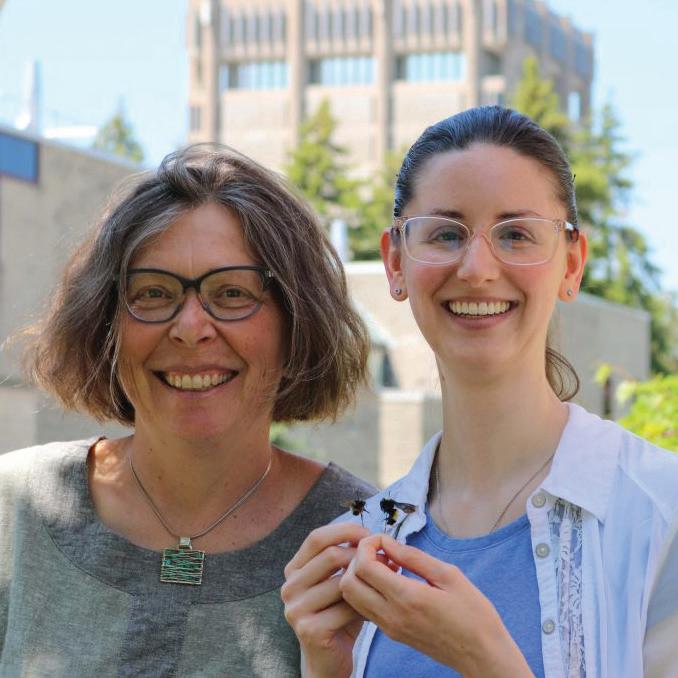
Brock researcher finds two rare bumble bee species on campus Professor of Biological Sciences Miriam Richards (left) and Master of Biological Sciences student Jocelyn Armistead hold two rare bumble bees collected on Brock's campus. The bumble bees –Bombus terricola and Bombus pensylvanicus – were collected on Brock property and are listed as “special concern” under the Committee on the Status of Endangered Wildlife in Canada. “If we want to know if a species is doing well or not in an environment, we need to collect information,” says Richards, “A species can go into decline but with insufficient data, we may never know before it's too late.”
brocku.ca/brock-news/2023/06/brockresearcher-finds-two-rare-bumble-beespecies-on-campus/
• Nurture a culture of research and creative excellence.
• Invest in research infrastructure and support to ensure sustainable and accessible research services for the Brock scholarly community.
• Enhance transdisciplinary research and high-impact research practices.
• Build awareness of Brock University as a centre of research excellence.


Brock study explores tool to protect Niagara grape growers against weather-related losses Conditions that are too cold, too hot, too dry or too wet can impact the yield and quality of crops. With Niagara’s grape and wine industry in mind, new Brock University research aims to help local farmers mitigate the financial impact brought on by suboptimal weather conditions. Professor of Finance Don Cyr teamed up with Professor of Economics Joseph Kushner and Oenology and Viticulture student Mingtian Zhang to explore how Niagara’s grape growers could benefit from purchasing weather derivatives – contracts that anticipate seasonal weather trends likely to occur and offer growers some sense of protection.
brocku.ca/brock-news/2024/01/brockstudy-explores-tool-to-protect-niagaragrape-growers-against-weather-relatedlosses/
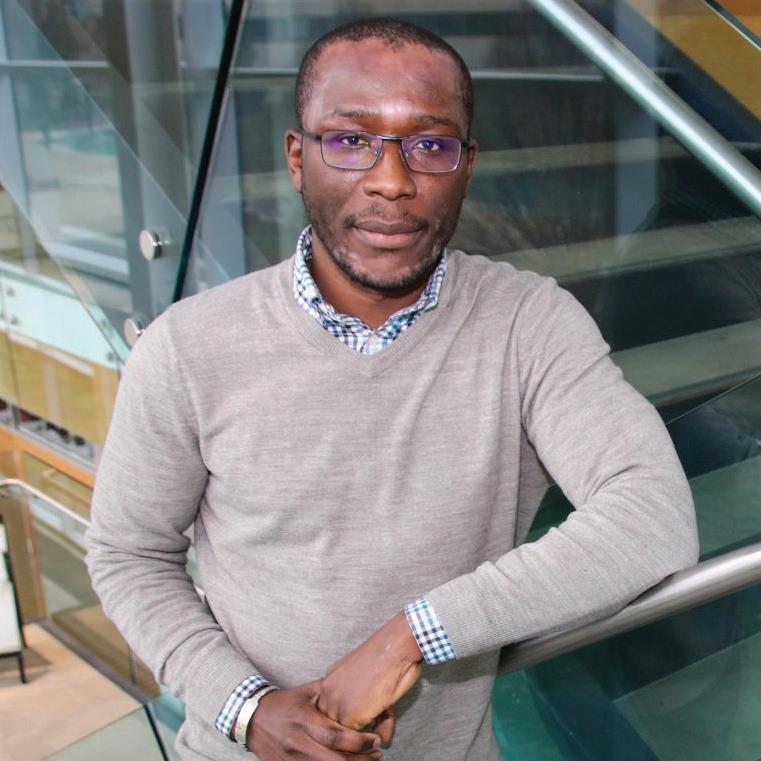
SSHRC awards Brock University
$477,654 for early research
Assistant Professor of Economics Teegawende Zeida and his team are building an economic computer model that will project the acceptability of various policy decisions based on age, wealth, labour force participation and other factors thanks to the Social Sciences and Humanities Research Council of Canada (SSHRC)’s Insight Development Grant program. The Insight Development Grants are part of a funding bundle Minister of Transport Pablo Rodriguez announced in March, 2024 on behalf of Minister of Innovation, Science and Industry François-Philippe Champagne. Brock University was awarded a total $477,654 for nine research projects. “Brock University’s new research on aging and welfare is a commitment to the well-being of our seniors,” says Chris Bittle, Member of Parliament for St. Catharines.
brocku.ca/brock-news/2024/03/sshrcawards-brock-university-477654-for-earlyresearch/

Federal funding supports Brock infrastructure in mobility, insect and health research
Greater insights into ways the spine and upper body move. A better understanding of how mosquitos transmit viruses. More details of the role chemicals released by cells play in disease development and prevention. These are goals of three Brock University researchers who received a total of $295,000 of funding for equipment from the Canada Foundation for Innovation’s (CFI) John R. Evans Leaders Fund (JELF). Assistant Professor of Biological Sciences Ian Patterson, Associate Professor of Health Sciences Adam MacNeil and Professor of Biological Sciences Fiona Hunter are creating a specialized lab to study insect-specific viruses. Theirs is one of three projects being supported by the JELF. brocku.ca/brock-news/2023/08/federal-funding-supports-brockinfrastructure-in-mobility-insect-and-health-research/
Brock awarded $4.8 million in national science research funding
Paul Zelisko, Associate Professor of Chemistry, is investigating how to make products that contain silicone polymers last longer by turning to Mother Nature for inspiration. The human-manufactured, rubber-like substance is found in countless products ranging from cosmetics to sealants, clothing to cooking utensils, insulation and lubricants, among others. But many of these products wear out quickly. “We’re looking to combine naturally occurring renewable resources with silicones so that they can heal themselves when damaged and also to enable them to be easily recyclable," says Zelisko. He’s one of 27 Brock University researchers to receive more than $4.8 million in funding from the Natural Sciences and Engineering Research Council’s Discover/Explore program. brocku.ca/brock-news/2023/08/brock-awarded-4-8-million-in-nationalscience-research-funding/


Anthropocene research among Brock projects to receive $965,000 in SSHRC funding
It’s being called the “bomb pulse,” the sharp spike of carbon-14 in the Earth’s atmosphere arising out of fallout from nuclear bomb testing in the 1950s and ’60s. This fallout has changed the Earth so much that the international geologic community is poised to formally declare a new epoch in Earth’s history, the Anthropocene. Through their work, Brock University Professor of Philosophy Christine Daigle and her team are taking scientific evidence found in Brock-led geologic research to the next level. Daigle is among seven Brock researchers awarded $965,636 in Insight Grants from the federal government’s Social Sciences and Humanities Research Council of Canada (SSHRC).
brocku.ca/brock-news/2023/08/anthropocene-research-among-brockprojects-to-receive-965000-in-sshrc-funding/

Brock given high marks for research publication record in national report
A national company that tracks Canada’s research and development performance has ranked Brock University second out of 21 universities for two measures related to publishing. According to Research Infosource Inc.’s most recent report, released in December 2023, Brock has the secondhighest ranking in the “Cross-sector Collaboration Publications Growth” area, with a 163.4 per cent increase from 2017 to 2021. Brock also has the second-highest ranking in the “International Collaboration Publications” area, with 1,326 publications that were co-authored with researchers outside of Canada between 2017 and 2021. brocku.ca/brock-news/2023/12/brock-given-high-marks-forresearch-publication-record-in-national-report/

Brock partners with biomechanics company on 3D motion capture technology
Brock Assistant Professor of Kinesiology Shawn Beaudette has teamed up with the sports biomechanics start-up Chalk Monkey Labs to create a 3D motion capture system that performance coaches can use to benchmark their athlete's sport techniques. Beaudette is Director of Brock's Spine Biomechanics and Neuromuscular Control Laboratory, which studies how skeletal movements affect physical performance and risk of injury. “The motion data we capture can provide insight on injury risks, or track individual training progress,” says Beaudette. This 3D motion data can also help coaches, athletes and other sports professionals gain deeper insights into how individual movement strategies relate to performance outcomes.
brocku.ca/brock-news/2023/05/brock-partners-with-biomechanicscompany-on-3d-motion-capture-technology/

CCOVI awarded $2.4M for grape, wine research under Sustainable Canadian Agricultural Partnership
Researchers with Brock University’s Cool Climate Oenology and Viticulture Institute (CCOVI) recently received more than $2.4 million in cash and in-kind support for projects that aim to strengthen Canada’s grape and wine industry. Agriculture and Agri-Food Canada (AAFC) and the Canadian Grapevine Certification Network (CGCN) announced the funding in March 2024 for three projects by CCOVI researchers Debbie Inglis, Wendy McFadden-Smith and Jim Willwerth through AAFC’s and CGCN’s $10.9-million Sustainable Canadian Agricultural Partnership (SCAP) AgriScience Cluster. “This funding will allow researchers out of CCOVI to work side by side with industry partners to overcome challenges threatening the grape and wine industry across Canada in areas of grapevine cold damage, trunk diseases and wine production to ensure the sector remains sustainable and competitive as it adapts to climate change,” says Inglis, who is CCOVI’s Director. brocku.ca/brock-news/2024/03/ccovi-awarded-2-4m-forgrape-wine-research-under-sustainable-canadian-agriculturalpartnership/
more inclusive approaches to teaching theatre as part of the new partnership project, Staging Better Futures/
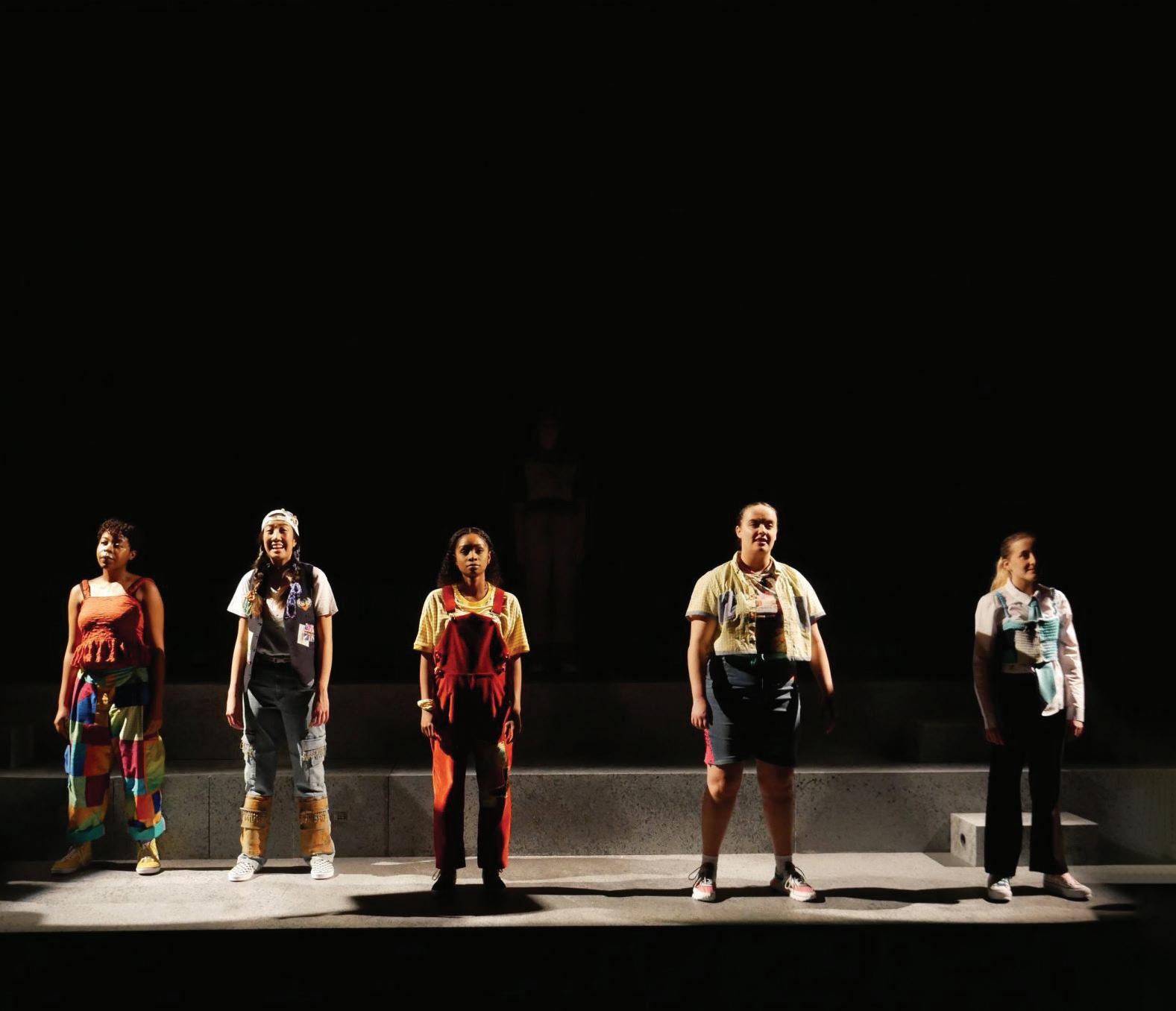
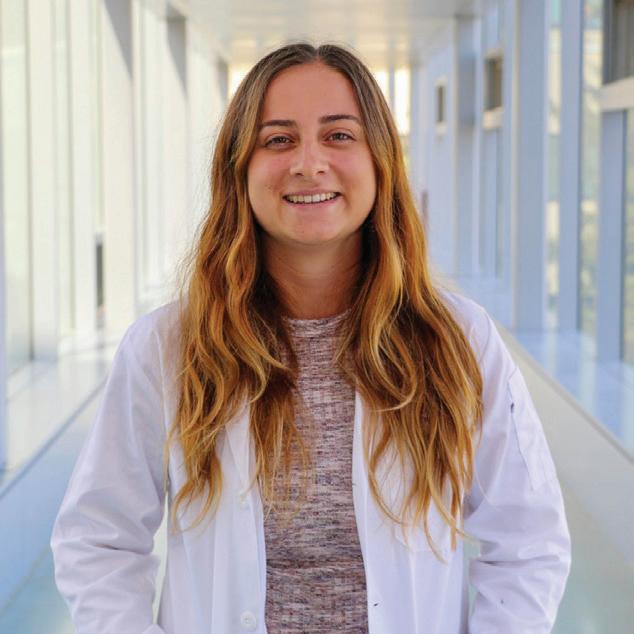
The stars aligned when Jessica Braun (MSc ’21), a PhD student in Applied Health Sciences, recently returned from a research collaboration with NASA to find out she was named the first-place recipient of the inaugural VPR Women in STEM Graduate Leadership award. The new honour recognizes Brock graduate students and their exceptional advocacy, leadership and efforts to advance women and under-represented groups in science, technology, engineering and mathematics (STEM). In addition to Braun, Chimerem Amiaka (MSc ’23), a PhD student in Applied Health Sciences, took second place and Alex Wilder, a PhD student in Biological Sciences, took third place in the awards. Among Braun’s notable accomplishments is launching the Niagara chapter of the Girls SySTEM Mentorship program in January 2023. In its first year, the chapter successfully connected with 48 mentees and 21 mentors, highlighting the need for such a program in the region.
brocku.ca/brock-news/2024/04/grad-students-honoured-forinspiring-women-to-pursue-stem/
Brock co-led team awarded $2.5M for project giving minoritized voices centre stage in transforming theatre education
Deneh’Cho Thompson, a displaced and dispossessed member of the Pehdzeh ki Nation, became an academic because he wanted others to have a better experience with theatre education than he did. Responding to experiences such as Thompson’s, a Brock co-led research project is putting the spotlight on minoritized voices. Staging Better Futures/Mettre en scène de meilleurs avenirs (SBF/MSMA) is the first national, cross-sectoral partnership approach to decolonizing, anti-racist, equitable, diverse and inclusive systemic change ever undertaken in post-secondary theatre education in Canada. This project was awarded $2.5-million (SSHRC) Partnership Grant.
brocku.ca/brock-news/2023/08/brock-co-led-team-awarded-2-5m-forproject-giving-minoritized-voices-centre-stage-in-transforming-theatreeducation/
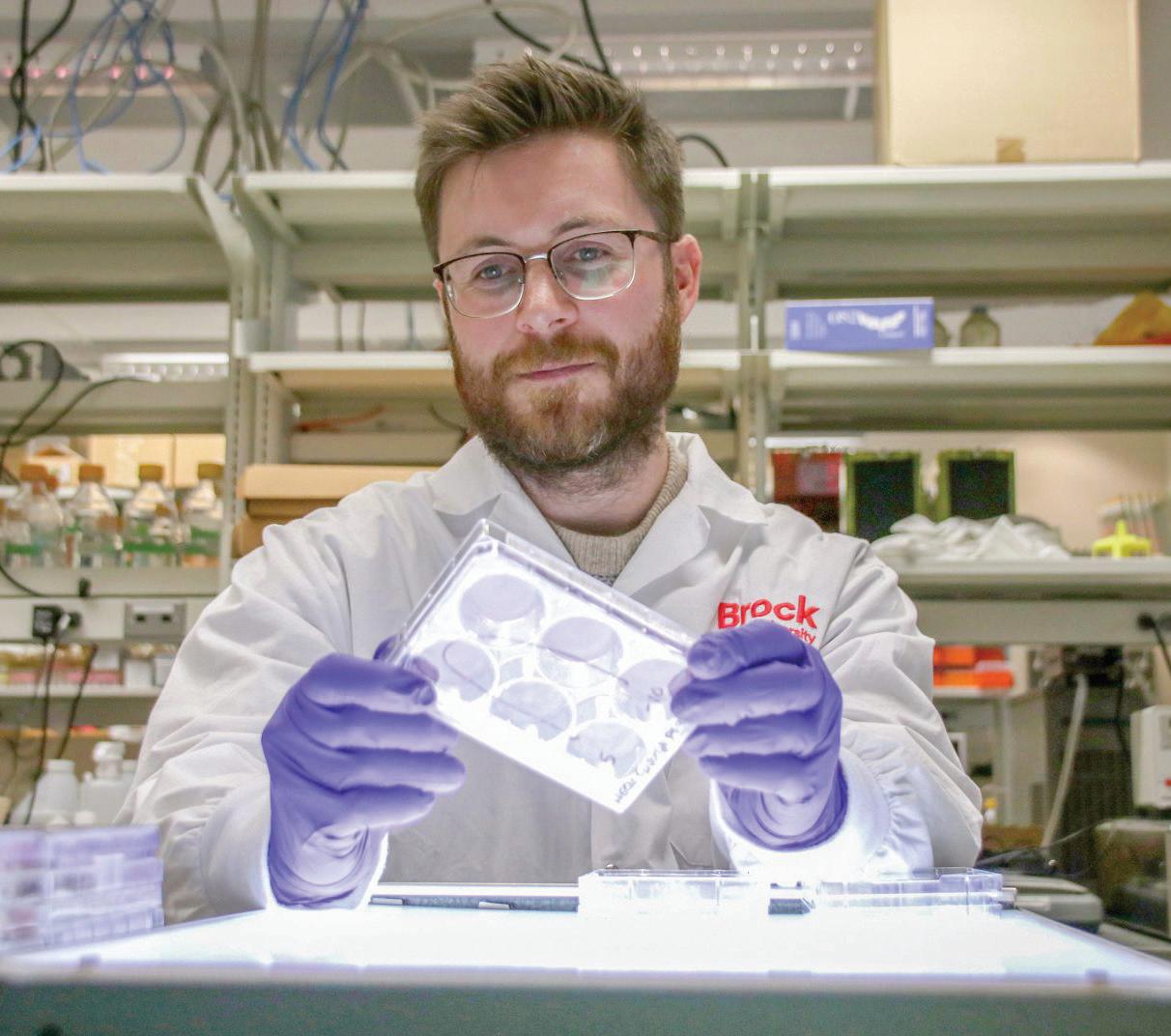
The word “virus” usually evokes a sense of fear or foreboding, a bad thing to be avoided. But for Ian Patterson, a virus can be a lifesaver – under the right conditions. The Assistant Professor of Biological Sciences and his team are investigating how the ribonucleic acid (RNA) in viruses that infect an insect can be manipulated to avoid infection and disease in humans. Patterson has partnered with Associate Professor Fasséli Coulibaly at the Biomedicine Discovery Institute of Monash University in Australia on their project, “Characterizing an insect-specific virus to deliver RNA to target cells.” Their project is supported by $206,450 in funding from the NSERC’s Alliance International Grant.
brocku.ca/brock-news/2024/03/nserc-funded-brock-research-usinginsect-viruses-to-benefit-human-health/

Brock awarded intellectual property development funding
Brock University’s commercialization activities are getting a boost from an Ontario government agency program designed to support innovation and intellectual property (IP) commercialization in post-secondary education. Intellectual Property Ontario (IPON) announced funding for 10 post-secondary institutions across the province in April 2024 with Brock receiving $299,158 for a one-year project that will help to build the University’s capacity for commercialization. Bradley McLean, Brock LINC Associate Director, Innovation, Commercialization and Partnerships, says the IPON funding will primarily be directed to adding two staff members to work on commercial opportunities and research partnerships with industry.
brocku.ca/brock-news/2024/04/brock-awarded-intellectual-propertydevelopment-funding/

Grad students, postdocs awarded more than $2M in federal funding for game-changing research
Applied Health Sciences PhD student Caroline Hummell is among Brock’s 40 CGS recipients of the $2 million in Canadian Graduate Scholarships (CGS). Her research will explore how mentorship impacts the participation of women and girls in sport. Hummell’s personal and academic journey has informed her research. The lifelong basketball player has seen alarming trends along the way from national reports of girls and women dropping out of sport – many expressing a reluctance to return to the field or court following the COVID-19 pandemic. “In Canada alone, one-third of girls drop out of sport by age 16 and one in four girls currently engaged in sport are not committed to returning. In comparison, only one in 10 boys drop out of sport during the same period,” she says.
brocku.ca/brock-news/2024/03/grad-students-postdocs-awarded-morethan-2m-in-federal-funding-for-game-changing-research/

Brock research farm
future of sustainable agriculture in Canada
With the support of a $3.5-million grant from the Canada Foundation for Innovation and matching $3.5 million grant from the Ontario government's Ontario Research Fund – Large Infrastructure Fund program, Brock's innovative grape and wine research will expand into other areas of the agricultural sector through the three-part Clean Agriculture for Sustainable Production (CASP) Field Infrastructure project. Central to the project is the Brock-led research farm where scientists from Brock, other institutions and industry will develop and test out agricultural innovations. “This investment not only transforms research that supports Canada's $11.6-billion grape and wine industry but allows industry to have access, through research partnerships, to state-of-the-art facilities to identify and produce elite performing plant material,” says Professor Debbie Inglis, Director of Brock's Cool Climate Oenology and Viticulture Institute. brocku.ca/brock-news/2024/03/brock-research-farm-to-growfuture-of-sustainable-agriculture-in-canada-with-3-5m-cfi-grant/ brocku.ca/brock-news/2024/04/ontario-awards-brock-3-5m-forsustainable-agriculture-research-farm/


Many older adults less able to 'refresh' memory, says Brock research
Is memory loss inevitable with age? Not if older adults are able to hit the “refresh” button in their minds, says recent Brock research. This occurs when older adults make a clear distinction between one physical location or event and another that immediately follows when they recall information and events, says research conducted by Associate Professor of Psychology Karen Campbell and her PhD student Sarah Henderson. “In this study, we find that many older adults tend to blur events together in long-term memory, which affects their ability to recall what happened,” says Campbell, Canada Research Chair in Cognitive Neuroscience of Aging. brocku.ca/brock-news/2023/07/manyolder-adults-less-able-to-refresh-memorysays-brock-research/
Brock researchers explore use of AI to improve drug development
Yifeng Li, Canada Research Chair in Machine Learning for Biomedical Data Science, and his Computer Science master’s student Cameron Andress (BSc ’20, MSc ’23) published a recent paper on how artificial intelligence (AI) can better create a drug to prevent the SARS-CoV-2 virus – responsible for contracting COVID-19 – from entering human cells compared to more conventional methods. “This is a unique and important piece of work in the AI for drug design community,” says Andress, who is the paper’s first author. “Our results suggest that AI is capable of producing well-suited drug candidates for a chosen virus, which can significantly accelerate the drug development process and potentially save more lives.”
brocku.ca/brock-news/2023/07/brock-researchers-explore-use-of-ai-tocreate-more-efficient-stronger-drugs/

Giant bamboo may be the future of sustainable construction, says Brock researcher
With funding from a Government of Canada NSERC Discovery Grant, Associate Professor of Engineering Amir Mofidi is using advanced techniques to fabricate new forms of engineered bamboo as a suitable economical and practical alternative for construction purposes. “When thinking about construction materials, the industry predominantly relies on steel and concrete, which are high in carbon emissions, and faster growing soft wood timber, which requires 30 to 40 years to grow,” he says.
“The giant bamboo is an impressive plant with potential that is not fully recognized yet,” he says. “There are even varieties with roots that can purify contaminated water.”
brocku.ca/brock-news/2024/03/giantbamboo-may-be-the-future-of-sustainableconstruction-says-brock-researcher/

Brock research explores factors keeping long-term ‘alternate level of care’ patients in hospital It’s a scene repeated all too frequently: a patient remains in hospital long after they’ve been successfully treated because there’s nowhere for them to go where they’ll be safe and cared for. Health Sciences PhD student Quinten Carfagnini wanted to know who undergoes this experience and why. In collaboration with Brock University’s Goodman School of Business, the Faculty of Applied Health Sciences and Niagara Health, Carfagnini conducted research on the factors keeping nonacute patients in hospital for more than 30 days. “These patients are done with their care, but they’re stuck in the bed that they’re in, which is obviously unfortunate because those who do require treatment need to be able to get into that bed,” says Carfagnini. brocku.ca/brock-news/2023/05/brockresearch-explores-factors-keeping-long-termalternate-level-of-care-patients-in-hospital/
Brock grad student receives gold medal in national research competition
Rebecca Van Massenhoven (BA ’22), who is completing her Master of Arts in Political Science, was awarded a gold medal in the highly competitive National Student and Thought Leadership Awards, which are jointly offered by the Canadian Association of Programs in Public Administration (CAPPA) and the Institute of Public Administration in Canada (IPAC). The award process requires students to be nominated by their home institutions before presenting their original research to a panel of judges. In the study, she compared a forest pilot project in British Columbia, a harbour clean-up in Ontario and a fishery board in Labrador to assess the shift toward participatory models of environmental governance in Canada and to examine what can be learned from how each model reflects principles of democracy. brocku.ca/brock-news/2023/07/brock-grad-student-receives-gold-medalin-national-research-competition/
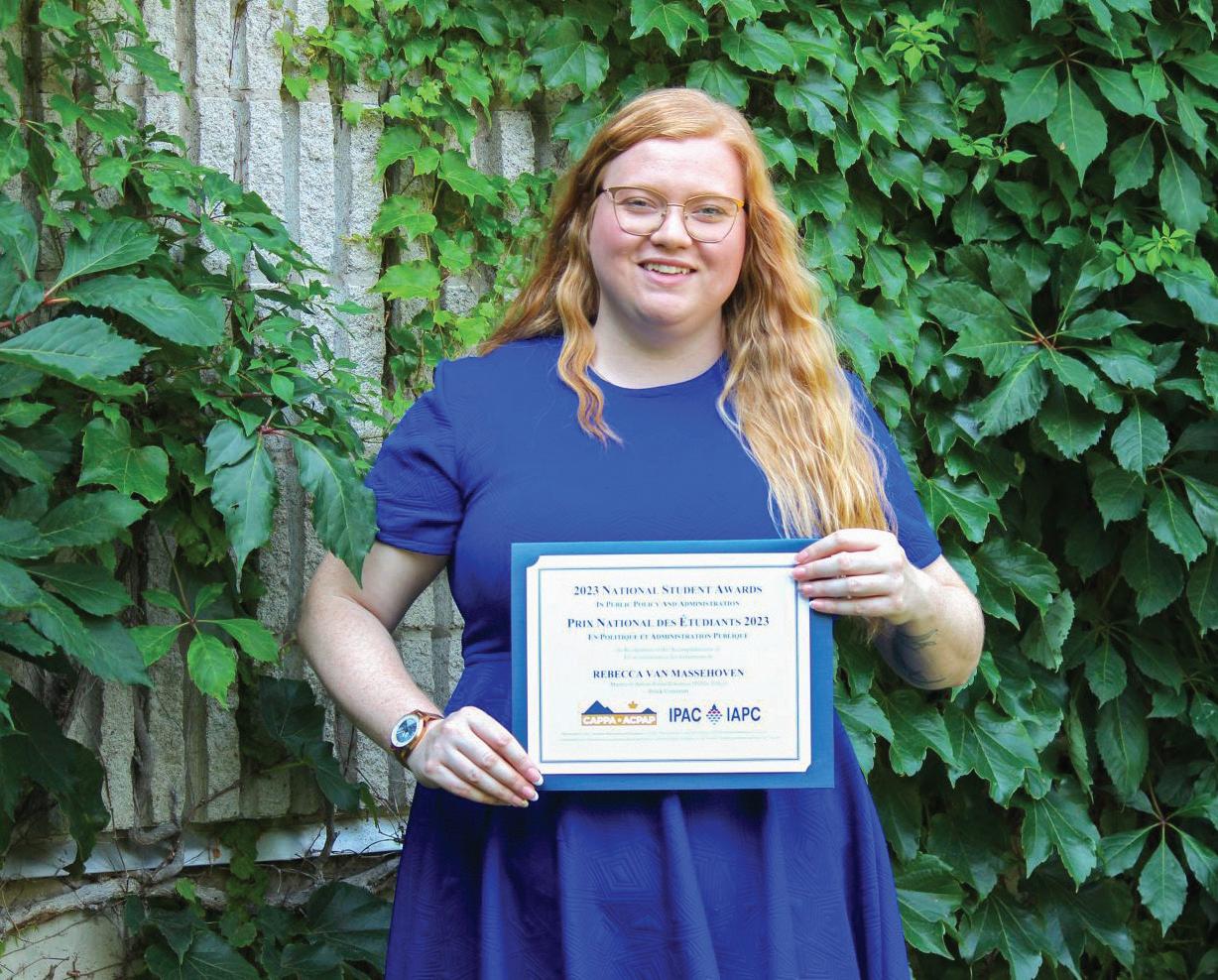
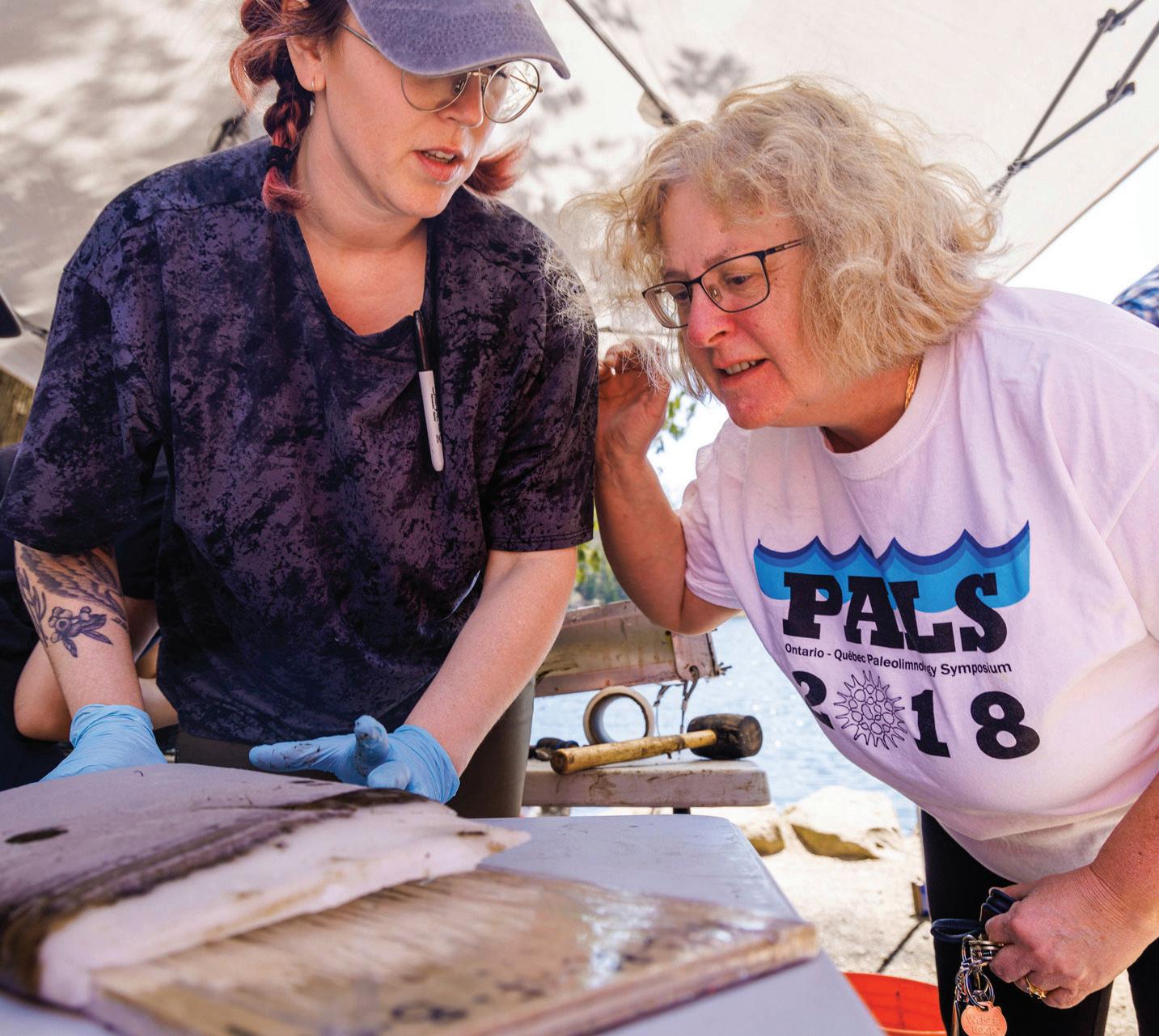
Brock model better predicts Indigenous people at risk of lung cancer in U.S.
A Brock University-designed lung cancer prediction model is more effective at identifying Indigenous individuals in the U.S. who should be screened for lung cancer than what is currently used in the country's healthcare system. Professor Emeritus of Epidemiology Martin Tammemägi's cancer prediction model identified up to 24 per cent more Indigenous and non-Indigenous people who needed lung cancer screening than the United States Preventive Services Task Force (USPSTF) criteria. Lowdose computed tomography (CT) lung cancer screening for high-risk individuals detects earlier stages of cancer, which is often cured by surgery. Without screening, most lung cancers are detected at an advanced stage, with most cases having low survival rates. brocku.ca/brock-news/2023/10/brock-model-better-predicts-indigenouspeople-at-risk-of-lung-cancer-in-u-s/
International experts choose Brock-led proposal for Crawford Lake as site for proposed Anthropocene
Two Brock University professors are among a body of international experts that has selected a location on Earth that will allow the Anthropocene to be defined as a new epoch in geologic time. Brock Professors of Earth Sciences Francine McCarthy (right) and Martin Head, and Carleton University Professor of Earth Sciences Tim Patterson, head up a team that has been studying the geology of Crawford Lake in Milton, Ont., for many years. In July, 2023 the Anthropocene Working Group (AWG) – of which McCarthy and Head are voting members – announced its choice of Crawford Lake over 11 other possible sites as the location that best shows the boundary of the proposed Anthropocene, brought about by major changes to Earth through human activity.
brocku.ca/and/crawford-lake


Danielle Sirianni Molnar, Tier 2 CRC, Adjustment and Well-Being in Children and Youth
The Canada Research Chairs (CRC) Program was created by the federal government to attract and retain top researchers. Tier 1 and Tier 2 CRCs are nominated by universities but must also be confirmed by their peers as being exceptional researchers and potential leaders – even world leaders – in their field. During 2023-24, Associate Professor Karen Pate was named Tier 2 Canada Research Chair in Child Health Equity and Inclusion and Associate Professor Karen Campbell’s Tier 2 CRC position was renewed. As of April 2024, Brock had 11 active CRCs. Brock University has a total allocation of 14 CRC positions.
Danielle Sirianni Molnar – Brock researcher explores how perfectionism manifests in teens: During her graduate years, Molnar was inspired by Alice Cooper’s Man of the Year, a song about a highly successful, seemingly perfect man whose life falls apart. As Tier 2 CRC in Adjustment and Well-Being in Children and Youth, she is working to better understand the experiences of young perfectionists, examining how perfectionism affects chronic stress and the impact of this stress on young people’s well-being and ability to adjust.
Newman Sze – Brock researcher makes major advancements in healthy aging: During high school and university, Sze became interested in many disciplines, including chemical physics, computer programming, analytical chemistry, protein science, proteomics, life science and systems biology. He eventually earned a PhD in Chemistry from the University of Hong Kong. As Tier 1 CRC in Mechanisms of Health and Disease, Sze continues with his passion for exploring how complex systems work through “unraveling the intricacies of the human aging process” and how aging is connected to chronic conditions.
Julia Baird – Brock researcher examining ways to foster water resilience: “Water is critical to life; it’s inherent in us that we’re connected to water,” says Baird. “I think of the well-being of future generations and how important it is to support sustainability.” As Tier 2 CRC in Human Dimensions of Water Resources and Water Resilience, Baird investigates activities that have an impact on water. She studies how decisions regarding water use are made at the government, community and individual levels.
Val Fajardo – Brock researcher explores new frontiers in muscle health: Fajardo’s work has reached dizzying heights since he was named one of Brock’s Canada Research Chairs a little over three years ago. As Tier 2 CRC in Tissue Remodelling and Plasticity Throughout the Lifespan, he and his team are studying physiological processes that fuel muscle development or decline. Exercise and good nutrition contribute to favourable physiological changes that strengthen muscles, while inactivity, aging and disease are among factors leading to muscle weakness.
Karen Patte – Brock research named Brock’s newest CRC: Patte, is Brock University’s newest CRC in Child Health Equity and Inclusion. In this role, Pate will be investigating the interactions between individual, social, and environmental factors, including policies and programs at the school and government levels, that affect youth health and behaviours, including topics related to mental health, substance use, sleep, physical activity, screen use, and bullying.



Newman Sze, Tier 1 CRC, Mechanisms of Health and Disease

Julia Baird, Tier 2 CRC, Human Dimensions of Water Resources and Water Resilience
Val Fajardo, Tier 2 CRC, Tissue Remodelling and Plasticity Throughout the Lifespan

Karen A. Patte, Tier 2 CRC, Child Health Equity and Inclusion
• Andrea Doucet – Tier 1 CRC, Gender, Work, Care, and Community
• Karen Campbell – Tier 2 CRC, Cognitive Neuroscience of Aging
• Paula Duarte Guterman – Tier 2 CRC, Behavioural Neuroscience
• Michael Holmes – Tier 2 CRC, Neuromuscular Mechanics and Ergonomics
• Matthew Kwan – Tier 2 CRC, Youth Mental Health and Performance
• Yifeng Li – Tier 2 CRC, Machine Learning for Biomedical Data Science

Rebecca MacPherson, Associate Professor , Health Sciences

V. Kumar, Professor, Marketing and Goodman Academic–Industry Partnership
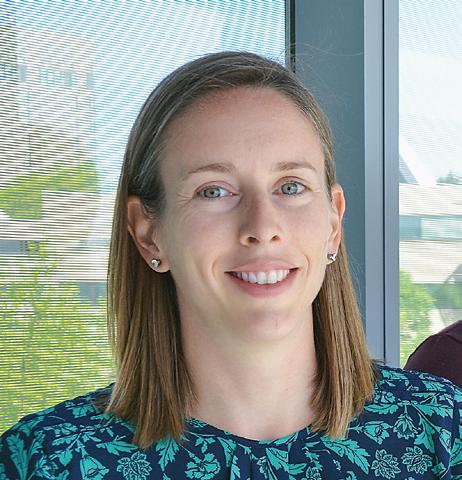

Jianbo Gao, Assistant
Professor, Chemistry

This award is intended to encourage and sustain high levels of scholarly performance for Brock University Faculty Association (BUFA) members who have made, or will make, exceptional contributions in their field. The awardee will undertake a defined, three-year program of research or creative work that will lead to a significant development in scholarship.
Rebecca MacPherson, Health Sciences: Associate Professor of Health Sciences Rebecca MacPherson studies brain metabolism in health and disease. Her recent research examines changes to the brain that occur during and after menopause, particularly the impacts of estrogen reduction, which is part of the menopause process. She is investigating whether menopause may trigger an increase in markers in the brain related to Alzheimer’s, and whether targeting a specific brain protein called brain derived neurotrophic factor (BDNF) may reduce these markers.
This award recognizes distinguished research or creative activity, outstanding research achievements, contributions to the training of future researchers, and strong scholarly or creative performance.
V. Kumar, Goodman School of Business: Professor of Marketing and Goodman Academic – Industry Partnership Professor V. Kumar (VK), a legend in marketing, has developed models to help businesses solve problems. These models ensure solutions are rigorous, meaning they anticipate and resolve all possible issues, are relevant to the organization and create an impact on society. His research areas include new technologies such as artificial intelligence and machine learning, industry sectors including financial services, telecom, retail and hospitality, and international marketing and sales management, among many others.

This award recognizes an Early Career Researcher's research excellence, contribution to the training of future researchers, and strong performance in attracting external funding, as appropriate for the nominee’s career stage.
Jianbo Gao, Chemistry: Assistant Professor of Chemistry Jianbo Gao, who is an Affiliated Professor in the Yousef Haj-Ahmad Department of Engineering, studies quantum materials that lead to next-generation technologies such as highly efficient photovoltaics and optical communications. Gao is one of the pioneers of quantum dot solar cells. His recent research includes testing a type of semiconductor nanocrystal that could be used to make highly efficient and inexpensive solar panels.

Enhance the life and vitality of our local region and beyond
Brock is committed to working with the communities in Niagara, Ontario, Canada and the world. Through local and global connections, we increase opportunities for the residents of Niagara. By responding to the needs of society and supporting its growth and development, we strengthen community vitality and vibrancy.
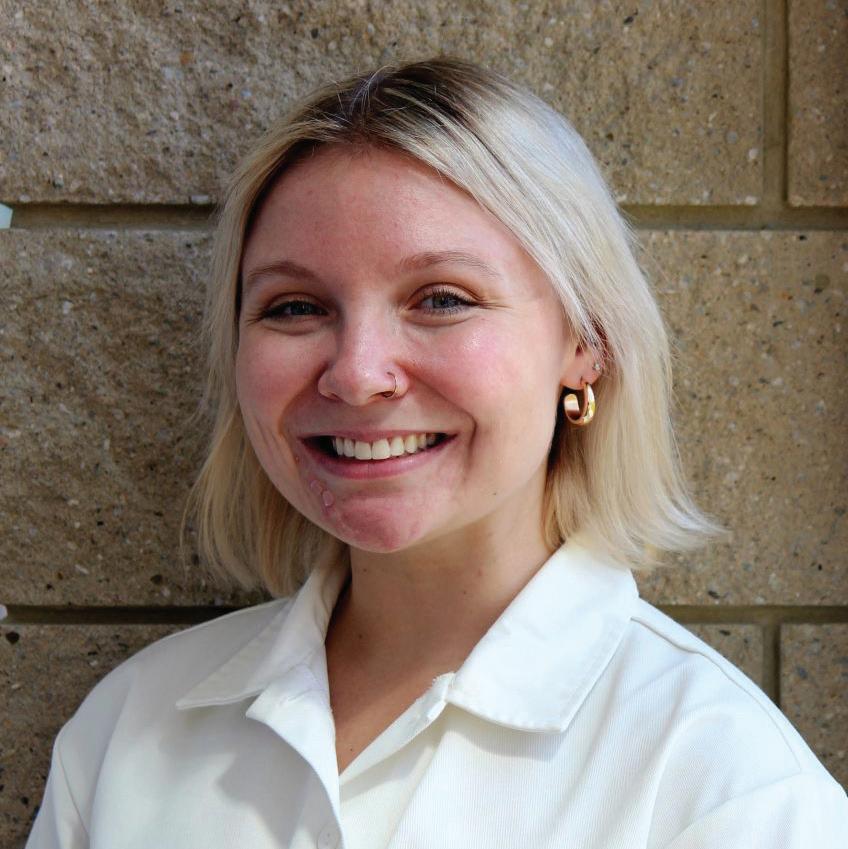
Before beginning her Citizens Politics course this winter, Jordan Isnor (BA ’22) had never thought about app development. But taking on an experiential education placement with Bethesda, a local not-for-profit organization supporting people with intellectual and developmental disabilities, changed all that. As a result, the Political Science master’s student was recently recognized as Bethesda’s Volunteer of the Year for developing a safety app for the organization. Margaret Lockhart, Bethesda’s Director of Administrative Services, says Isnor was “invaluable” during her time with the organization. brocku.ca/brock-news/2023/05/brockgrad-student-named-bethesda-volunteerof-the-year/
• Increase and enhance enriching opportunities for our students, alumni, faculty and staff to engage with the community.
• Support regional economic, social and cultural vitality.
• Enhance engagement with Indigenous communities in the spirit of reconciliation.
• Cultivate outstanding relationships with our alumni, starting with their earliest interactions with the University.
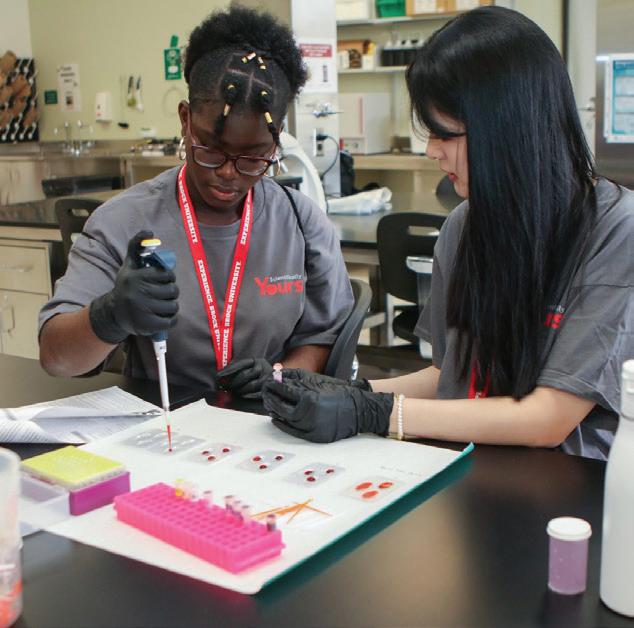
Scientifically Yours engages high school students in STEM
High-tech ice cream, robot races and blood type analysis were among the more than two dozen activities young scientists explored during Brock University's 33rd annual Scientifically Yours conference. Hosted by Brock's Faculty of Mathematics and Science, the event was created to encourage young people to pursue education and careers in science, technology, engineering and mathematics (STEM). Co-organizer Christene Carpenter-Cleland, Senior Laboratory Demonstrator with Brock's Biological Sciences Department, says Scientifically Yours provides handson labs and mentorship experiences that help to increase the confidence of high school students, encouraging them to continue their education and work towards careers in STEM fields. brocku.ca/brock-news/2023/05/scientificallyyours-engages-high-school-students-in-stem/

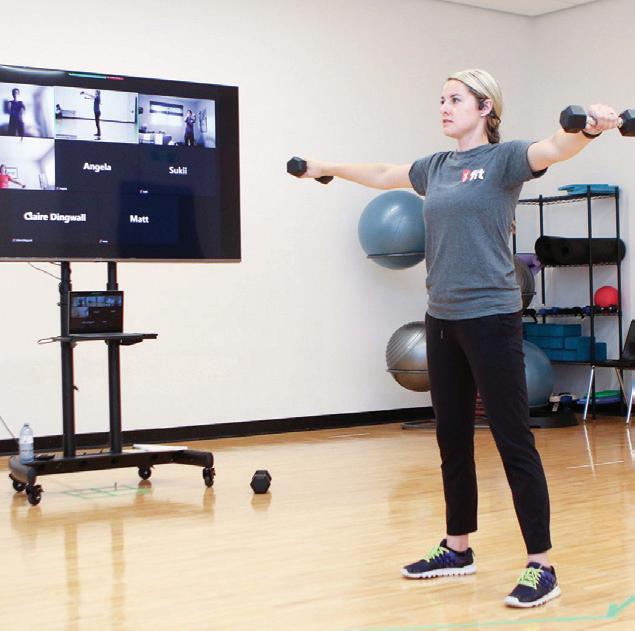
Funding helps Brock expand online exercise classes for seniors Brock University is enhancing its exercise programming for older adults and offering subsidized community memberships thanks to a $24,982 grant received from the Government of Ontario in June 2023 and the ongoing support of TD Bank Group (TD). The Brock Functional Inclusive Training (Bfit) Centre aims to improve the health and quality of life of older adults, cardiac patients and individuals living with spinal cord injury, multiple sclerosis, amputations and Parkinson’s disease. The centre’s SeniorFit program is supported by TD through the Ready Commitment and offers supervised in-person and online instruction to help individuals 55 years of age and older improve balance, strength and endurance. brocku.ca/brock-news/2023/10/fundinghelps-brock-expand-online-exercise-classesfor-seniors/
A historic sporting event in which Brock University played a decisive role in hosting has won a pair of national awards. The Niagara 2022 Canada Games was named the Canadian Sport Event of the Year Award and Sport Event Legacy of the Year Award during Sport Tourism Canada’s (STC) 15th annual PRESTIGE Awards Gala in Richmond, B.C., on June 8, 2023. In August 2022, more than 5,000 athletes and coaches converged on the Niagara region to compete in 20 sports. Brock, which contributed a parcel of land for the central site of Canada Games Park, was home to the Athletes’ Village and four sports: swimming, cycling, women’s rugby sevens and diving across its various facilities. brocku.ca/brock-news/2023/06/niagara-canada-games-receivesnational-awards/


Brock-led project to support Ontario veterans through innovative wellness program
Brock researchers were on a mission to help veterans rebuild social connections and decrease post-traumatic stress disorder (PTSD) symptoms after returning home from serving their country. Comrades in Well-being was a two-part program offering evidence-based wellness practices for veterans to improve mental health using sound healing, breathwork, yoga and peer support. Brock has teamed up with Boots on the Ground, a volunteer organization offering confidential peer support for first responders across Ontario, to deliver the program to veterans. The program was offered as a fullday retreat Nov. 4, 2023, at Brock University followed by 12 weeks of weekly peer-led virtual meetings. brocku.ca/brock-news/2023/10/brock-led-project-to-support-ontarioveterans-through-innovative-wellness-program/
Brock grad puts local history on the map
As Director of Community Engagement at the Brown Homestead, St. Catharines’ oldest heritage home with deep ties in the community, Jessica Linzel (BA ’18, MA ’21) is passionate about engaging audiences with history in creative and innovative ways. She credits her interdisciplinary education in Brock’s Faculty of Humanities as a key contributing factor to her success. Along with managing the Homestead’s daily communications, supervising a team of seven staff and producing heritage restoration video content, Linzel leads research initiatives at the heritage home. The Mapping the Brown Homestead project, which uses geographic information system (GIS) mapping technology to create interactive web-based maps of the historic site, has been successful in engaging visitors to the region.
brocku.ca/brock-news/2023/08/brock-grad-puts-local-history-on-the-map/

Students lend a helping hand throughout Niagara
About 150 Brock students, employees and alumni spent Sept. 9, 2023, giving back to the Niagara community during the 15th annual Brock Cares Day of Service. This year’s volunteer activities included shoreline clean ups, harvesting produce for social profits, helping individuals with disabilities, supporting community events and more. Manager, Off-Campus and Community Experience Kristen Smith says the day was an opportunity for students to connect with each other while making a difference in the Niagara community. By supporting organizations such as Heartland Forest, Habitat for Humanity Niagara, March of Dimes Canada and Project SHARE, new and returning students can also learn more about the region. brocku.ca/brock-news/2023/09/student-volunteers-to-give-back-duringbrock-cares-day-of-service/
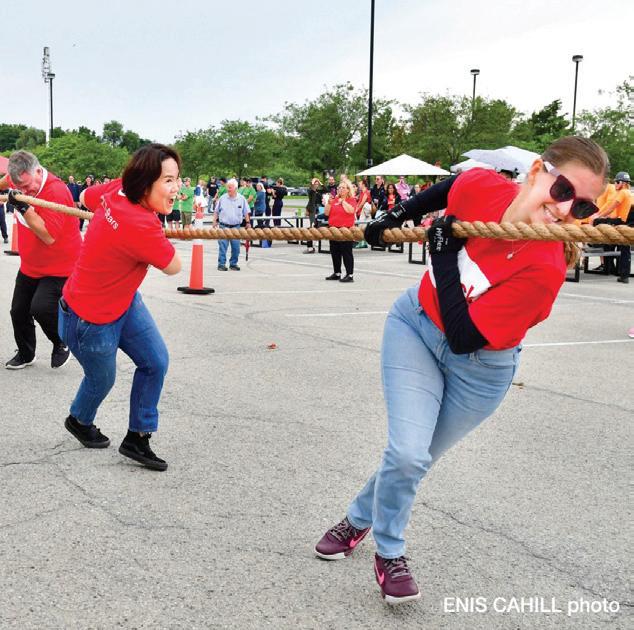
Brock pulls together to break poverty’s invisible barriers
A team of Brock senior administrators competed in a fire truck pull hosted by United Way Niagara Sept. 12, 2023, to launch the charitable organization’s 2023 fundraising campaign. Brock’s team, the ALT Stars, placed third out of 19 teams in the competition to pull a 12-ton fire truck 100 feet as fast as possible. Brock’s United Way Committee aims to give hope to those facing hidden struggles, such as food insecurity and mental health challenges, with the launch of the University’s 2023 United Way Campaign. This year, Brock’s campaign aims to raise $162,000, which will support more than 140 United Way Niagara programs, collaborations and special initiatives addressing poverty and often interconnected issues such food insecurity, homelessness, mental health and well-being, addiction and social isolation. Since 2003, the Brock community has raised more than $2.6 million for United Way.
Photo by Denis Cahill. brocku.ca/brock-news/2023/09/brock-pulls-together-tobreak-povertys-invisible-barriers/
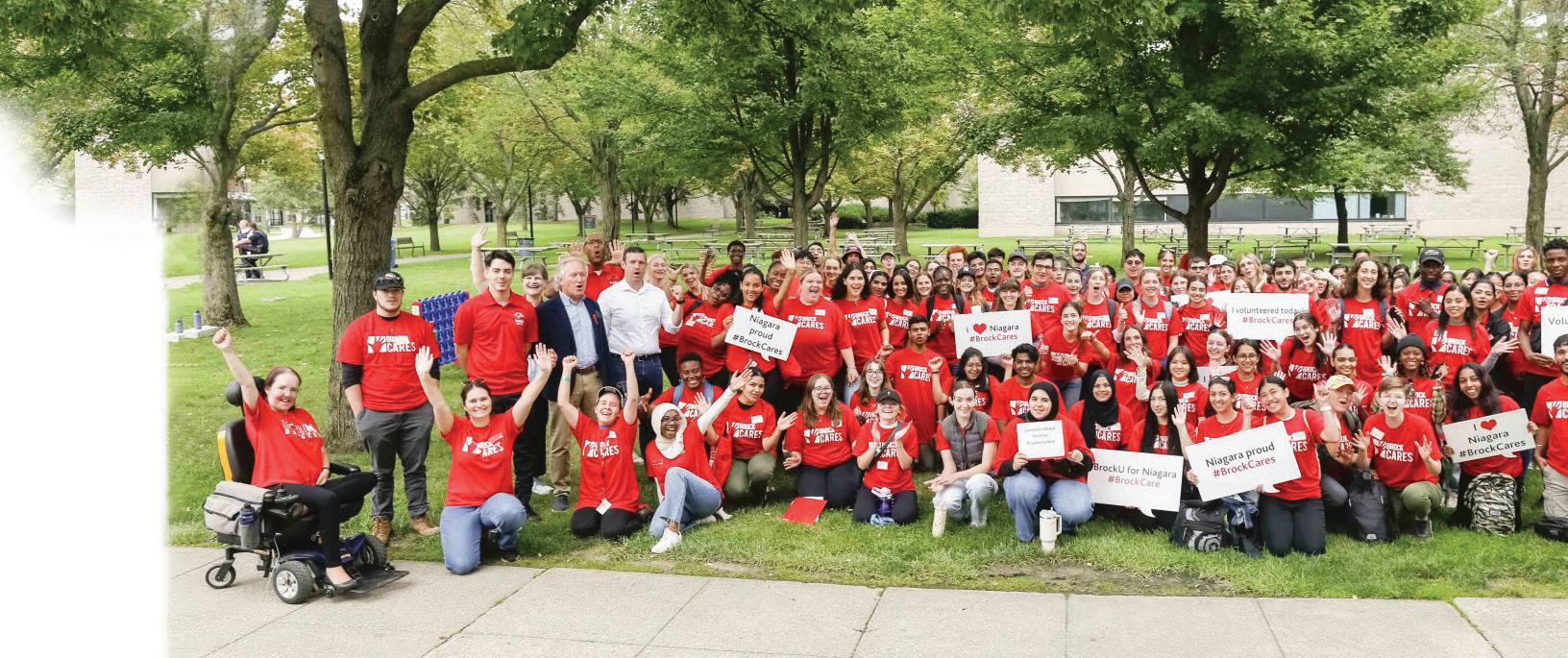
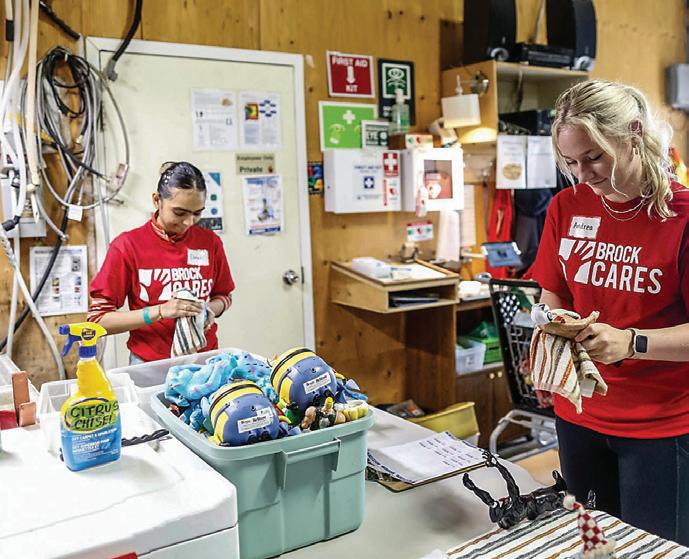

Community connections strengthen language prof’s research, teaching Brock University Associate Professor of Modern Languages, Literatures and Cultures Jean Ntakirutimana is an affiliated member of Brock’s Social Justice Research Institute (SJRI). He is among some two dozen researchers, government organizations, community groups and others working together to draw out the subjugated knowledges of Niagarans of African descent and foreign-born persons. The project, which is in its very early stages of planning, aims to collect information in three key areas: childhood and growing up; health literacy; and identity, connections and belonging. “Community members are brimming with a wealth of talents and knowledge, always available to anybody willing to listen and learn,” says Ntakirutimana. brocku.ca/brock-news/2024/04/community-connectionsstrengthen-linguistics-profs-research-teaching/
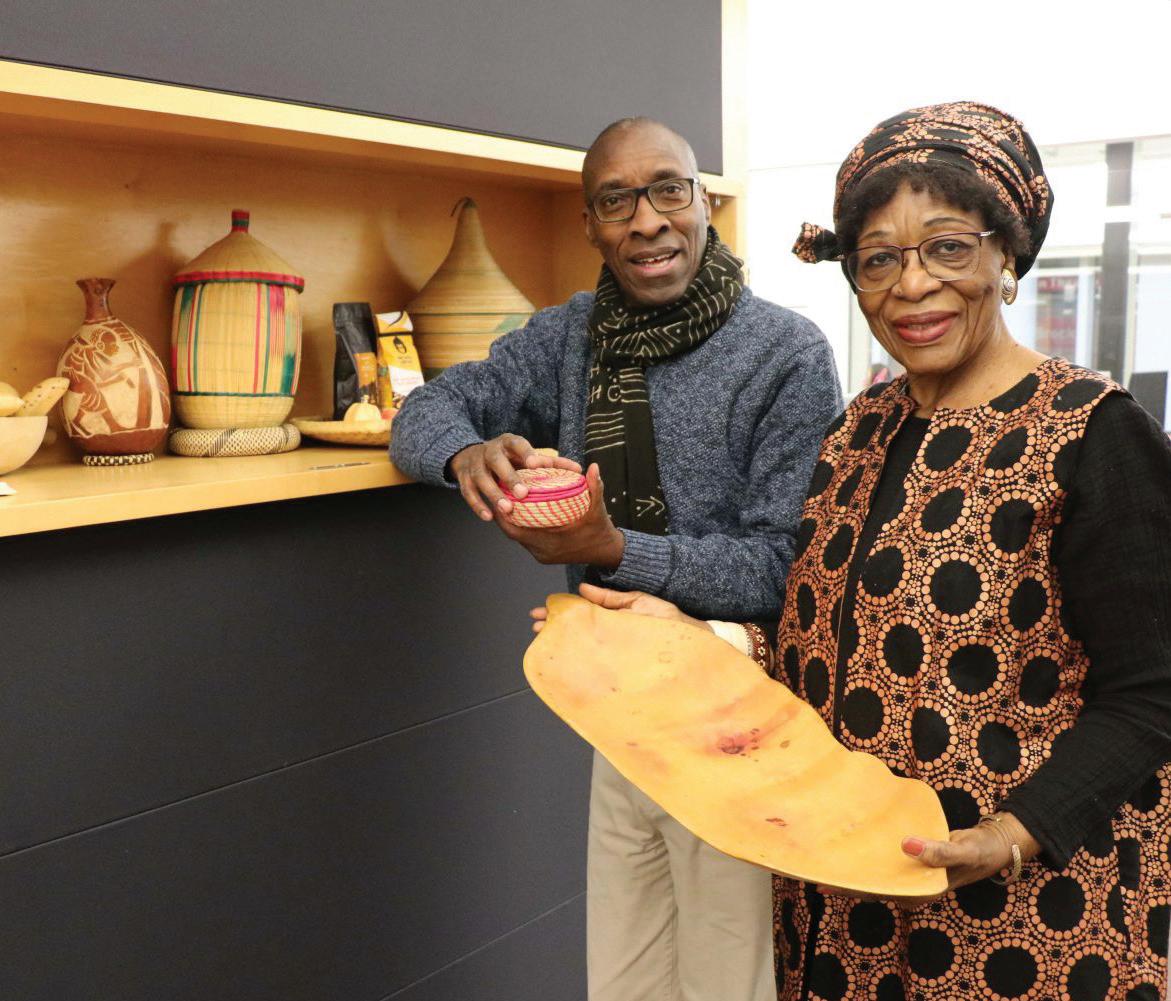
Brock Navigate competition gives winning entrepreneurs a boost
Two Brock entrepreneurs aiming to change the healthcare sector are one step closer to their goals thanks to the Brock LINC Navigate Pitch Competition. Navigate program participants Matthew Cary (BA ’08, MAG ’23), a part-time Brock student and Psychology graduate, and Abbie Burchell, a second-year Medical Sciences student, won the competition with their business pitches on April 3, 2024. Each received $2,500 for their startups after delivering their final pitches to a panel of judges as part of Navigate, an 11-week intensive program that helps entrepreneurs to test and develop early-stage business ideas through market research and feedback from potential customers. brocku.ca/brock-news/2024/04/brock-navigate-competitiongives-winning-entrepreneurs-a-boost/

Brock student recognized for contributions to inclusion on campus
Ishraq Malik has always wanted to make a positive impact in the community. The Medical Sciences graduand has been recognized as an equity, diversity and inclusion (EDI) Changemaker of the Month by Brock's Office of Human Rights and Equity (HRE) for her contributions to EDI on campus. While her goal felt just out of reach when she was younger, Malik's time at Brock has taught her anyone can make a difference. She has spent the last two years working for Brock's Student Justice Centre (SJC), where she created workshops, advocated for female peers and hosted events focused on empowering women and destigmatizing taboo topics.
brocku.ca/brock-news/2024/04/brock-studentrecognized-for-contributions-to-inclusion-oncampus/
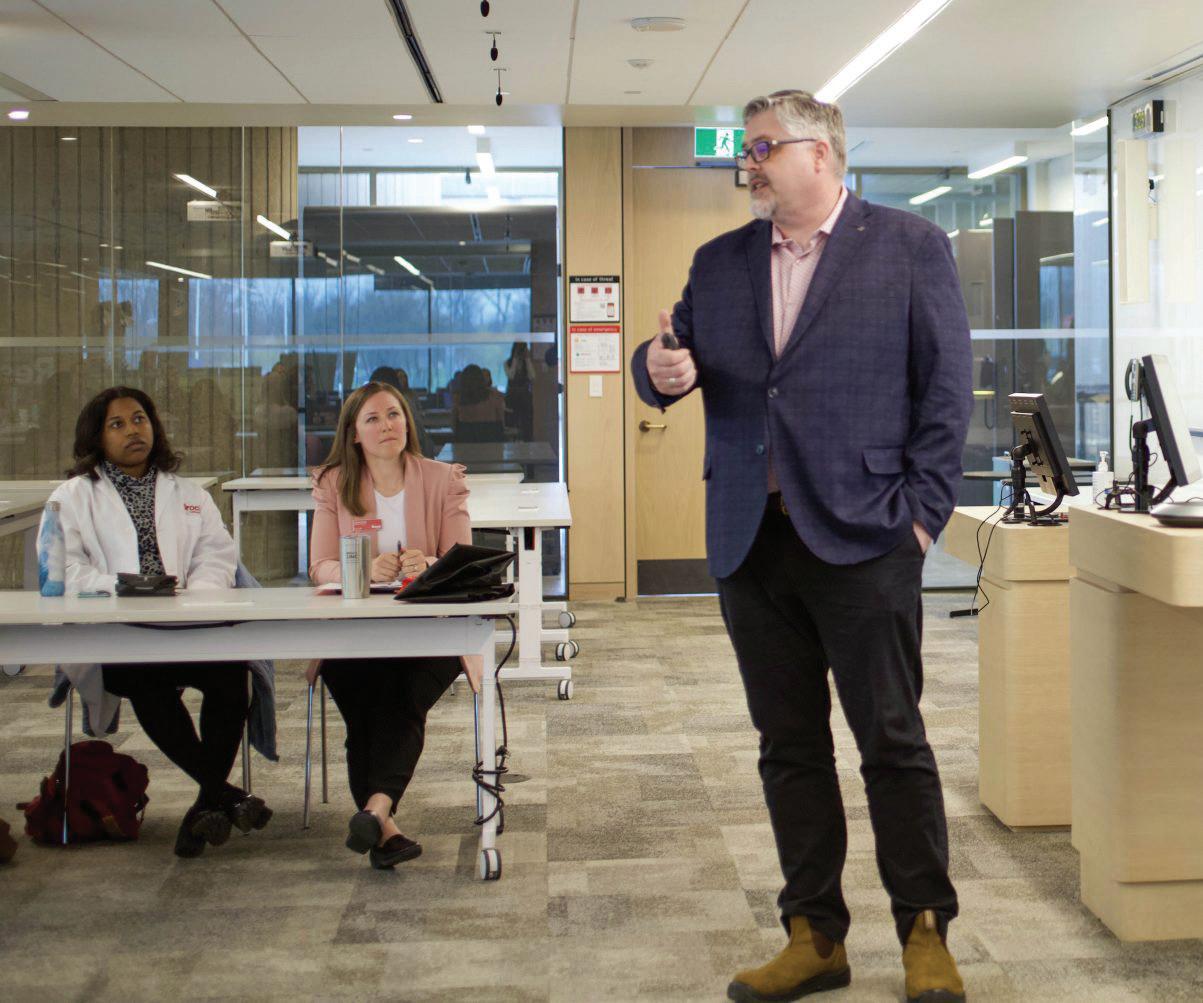
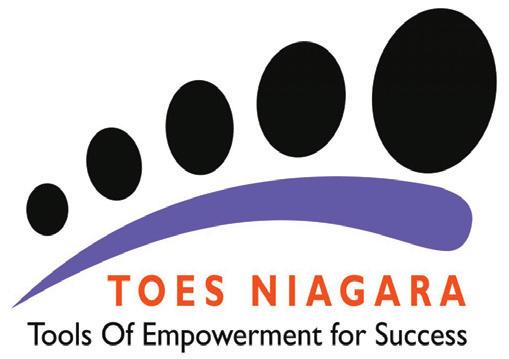
TOES Niagara, Brock partnering on project aimed at combatting human trafficking
TOES (Tools of Empowerment for Success) Niagara is working in partnership with Brock University Professional and Continuing Studies to develop a code of conduct to increase awareness of human trafficking and provide resources, including prevention strategies, for hospitality and tourism businesses and organizations in the region. The Welland-based non-profit organization – which supports and promotes the empowerment of women, with a special focus on marginalized and racialized women and youth – has received funding from the Government of Canada’s Women and Gender Equality (WAGE) office to bring the project to fruition. brocku.ca/brock-news/2024/02/toes-niagarabrock-partnering-on-project-aimed-atcombatting-human-trafficking/
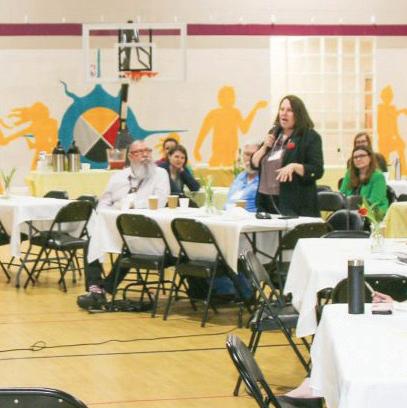
Guided by community insight, Brock University students have been working to help address a range of urban housing challenges faced by Indigenous communities in Niagara. Through the “Indigenous Housing Re-storying in Niagara” experiential education project in two Political Science courses – “Indigenous Politics in Canada” and “Issues in Local Government” – students heard from several Indigenous guest speakers and then developed policy briefs and recommendations on various local housing challenges. The project culminated in a community event at the Niagara Regional Native Centre on April 11, 2023.
brocku.ca/brock-news/2023/06/brock-studentsworking-to-improve-indigenous-housingchallenges/
Community partnerships the foundation of Indigenous Educational Studies program
A group of Indigenous women are building their knowledge and enhancing their abilities to work in Indigenous educational settings through a Brock University program rooted in community. In partnership with Brock’s Aboriginal Adult Education program offered by the Faculty of Education’s (FOE) Indigenous Educational Studies program, employees of Niwasa Kendaaswin Teg (Niwasa) are engaging in a post-secondary learning environment they may not have had access to otherwise. The collaborative nature of the program allows FOE faculty to work with Indigenous community partner organizations such as Niwasa to ensure the needs of Indigenous students are being met by centring their learning preferences and embedding cultural protocols into the learning experience.
brocku.ca/brock-news/2023/12/community-partnerships-the-foundation-ofindigenous-educational-studies-program/
Brock University Professional and Continuing Studies has launched two new workshops and a micro-credential designed to help professionals gain practical artificial intelligence (AI) skills and apply these tools in business environments. Barb Mercer, Associate Director of Programming at Brock Professional and Continuing Studies, says the vast amount of information about AI can be daunting for professionals. “Professionals need to understand how AI can benefit their operations,” she says.
“The programming at Brock is designed to offer practical insights into AI, making it less mysterious and more accessible. The programming will help professionals grasp AI concepts in a straightforward manner, ultimately making AI easier for everyone to understand and utilize.”
brocku.ca/brock-news/2024/03/brock-pcs-launches-aiprogramming-for-business-professionals/
Brock University has been selected as the Ontario hub of a Canada-wide program that trains students and novice researchers on how to evaluate behaviour-change initiatives in health care. “Clinical trials are often designed for testing new drugs in the pharma industry,” says Assistant Professor of Kinesiology Sean Locke, who chairs the Ontario hub. “We want to provide students with the same knowledge and training to conduct behavioural trials for research that would lead to developing programs for diabetes prevention, cardiac rehab, smoking cessation or lowered obesity.” The hub is the central Ontario component of the Canadian Behavioural Interventions and Trials Network Training Platform, a country-wide, $5-million initiative funded by the Canadian Institutes of Health Research (CIHR) and partners who are providing cash and in-kind support. brocku.ca/brock-news/2023/08/brock-houses-ontariobehavioural-research-hub-as-part-of-national-initiative/
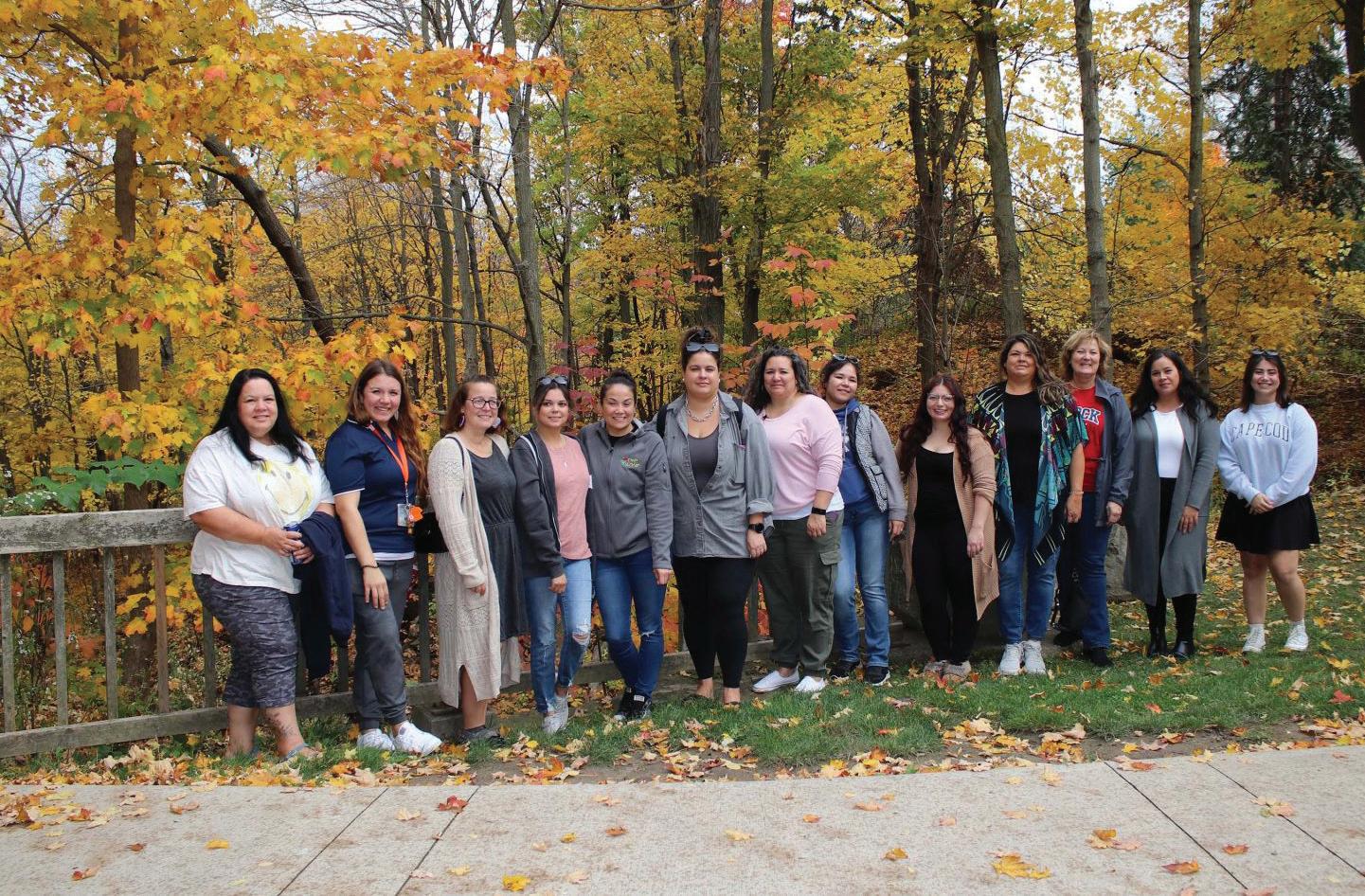
Brock partners with NOTL Museum to create interactive historical display software
Brock University Assistant Professor of Computer Science Naser Ezzati-Jivan has a long-standing interest in using his software expertise to educate the public, particularly young people, about the past. Ezzati-Jivan together with Sarah Kaufman, the Niagara-on-the-Lake Museum's (NOTL) Managing Director and Curator, created the “Innovating an Interactive Experience Software for the Niagaraon-the-Lake Museum” project "This collaboration allowed us to extend the educational impact beyond the classroom, engage with local history and create meaningful connections within the community," says Ezzati-Jivan.
brocku.ca/brock-news/2023/09/brock-partners-with-notlmuseum-to-create-interactive-historical-display-software/


Foster a culture of inclusivity, accessibility, reconciliation and decolonization
At Brock, we believe that a diverse and welcoming learning community is built upon the foundation of exceptional students, faculty, staff and alumni. This requires that Brock be attractive and welcoming to people of all identities, and accepting of the unique histories and experiences of Indigenous people within the Canadian setting.

Brock grad student recognized for equity, diversity and inclusion research
Growing up, Brittany Giles watched her Filipino mother encounter racism and heard stories about her father’s Métis grandmother being ridiculed. These experiences have driven her research as a Brock University Master of Arts in Applied Health Sciences student – and are the reason she is so passionate about putting community members’ voices front and centre. Giles (BPhEd ’21) has spent the past year-and-a-half planning research to explore the experiences of Indigenous students in physical education and was recently awarded the inaugural Equity, Diversity and Inclusion Graduate Student Research Scholarship from the Physical and Health Education Canada (PHE Canada) Research Council. brocku.ca/brock-news/2023/05/brockgrad-student-recognized-for-equitydiversity-and-inclusion-research/
• Strengthen relationships of trust with Indigenous communities and partners across all sectors and activities of the University.
• Promote effective human resource practices and philosophies that improve inclusivity, accessibility, reconciliation and decolonization.
• Further celebrate the success of our faculty, staff, students and alumni.

All for Change: Willy Manigat’s campaign for diversity in university sports
In 2021-22 Brock men’s basketball head coach Willy Manigat guided the team to win the University’s first Ontario University Athletics (OUA) Men’s Basketball Championship title in 30 years. During February 2024, Black History Month/African Heritage Month, Manigat mulled over the changing face of the Badgers’ teams.
“The representation of Black athletes in sports has evolved significantly, and it’s heartening to witness the positive changes. If you look back at the 1991 Brock championship team and compare it to our current roster, the shift in representation of studentathletes is evident. There’s a broader recognition of talent and a more inclusive environment.”
brocku.ca/brock-news/2024/02/all-forchange-willy-manigats-campaign-fordiversity-in-university-sports/

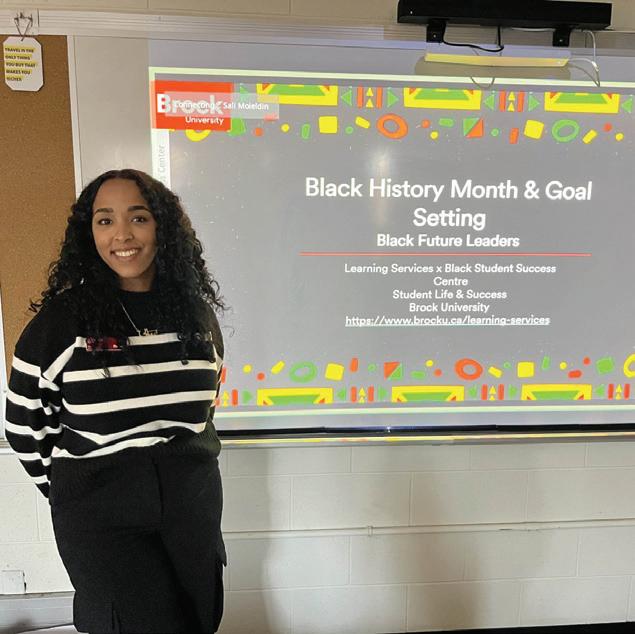
Brock program inspires future Black leaders in local high
Sali Moieldin (MA ’23) a Learning Skills Specialist with Brock’s Learning Services team, spent February 2024 teaching dozens of students at four local high schools about Black History Month/African Heritage Month and encouraging them to think about their own plans. “I love hearing what Black History Month/African Heritage month means to these students,” said Moieldin. “When we discuss prominent Black figures – including writers like Audre Lorde and Toni Morrison, as well as athletes, scientists and more – it provides an example for students to set their own goals and have a growth mindset.”
brocku.ca/brock-news/2024/02/brockprogram-inspires-future-black-leaders-inlocal-high-schools/

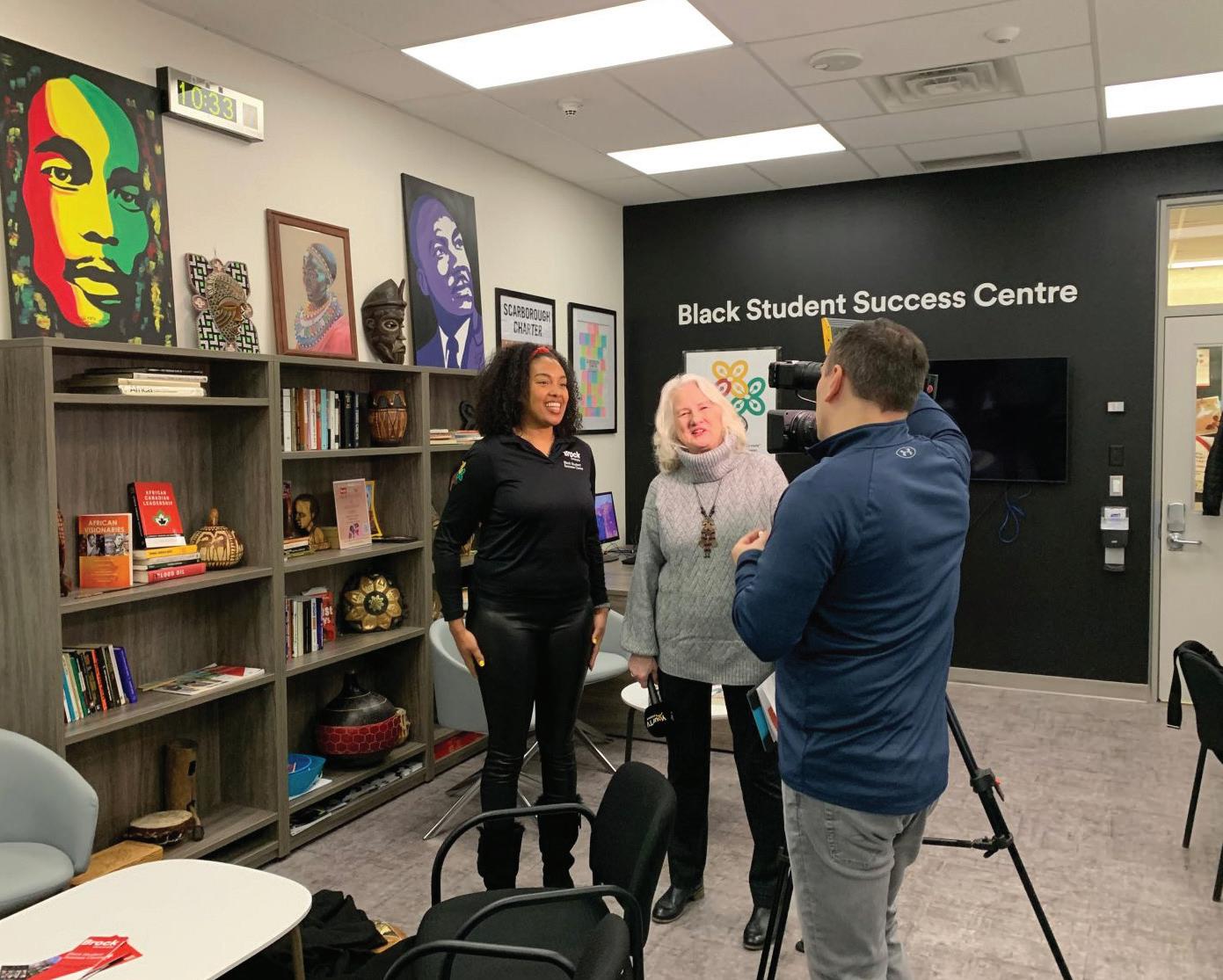
New Brock centre supports Black students on path to success


Book-wrapping events to remember missing and murdered Indigenous women, girls and Two-Spirit people
An initiative at the Brock Library honoured missing and murdered Indigenous women, girls and Two-Spirit people (MMIWG2S+). From Sept. 25 to Oct. 2, 2023, three dropin events welcomed all members of the Brock community to take part in the The Canadian Library, a grassroots art installation project that acts as a memorial to all MMIWG2S+. The project also took place at locations across the country. The goal was to wrap 8,000 books in fabric prints that reflect First Nations, Métis and Inuit designs as a testament to the lives lost. Before each book was placed on the gallery bookshelf in the library, the name of one of the MMIWG2S+ was written in gold along its spine. brocku.ca/brock-news/2023/09/book-wrapping-events-to-remembermissing-and-murdered-indigenous-women-girls-and-two-spirit-people/
“Black success has no limits.” They’re words Naomi Lawrence says as she talks about the work and purpose behind Brock University’s Black Student Success Centre (BSSC), which opened on Oct. 26, 2023. The Goodman School of Business student, who is also a student staff member at the centre, believes firmly in its mission to advance and celebrate the achievements of Brock’s Black, African and Caribbean students. “It’s a space where students feel supported, where we feel heard, where we are represented and where we feel safe. We offer support where Black students are around a community of people who look like us and understand us to a deeper level.” says Lawrence.
brocku.ca/brock-news/2023/10/new-brock-centre-supports-blackstudents-on-path-to-success/

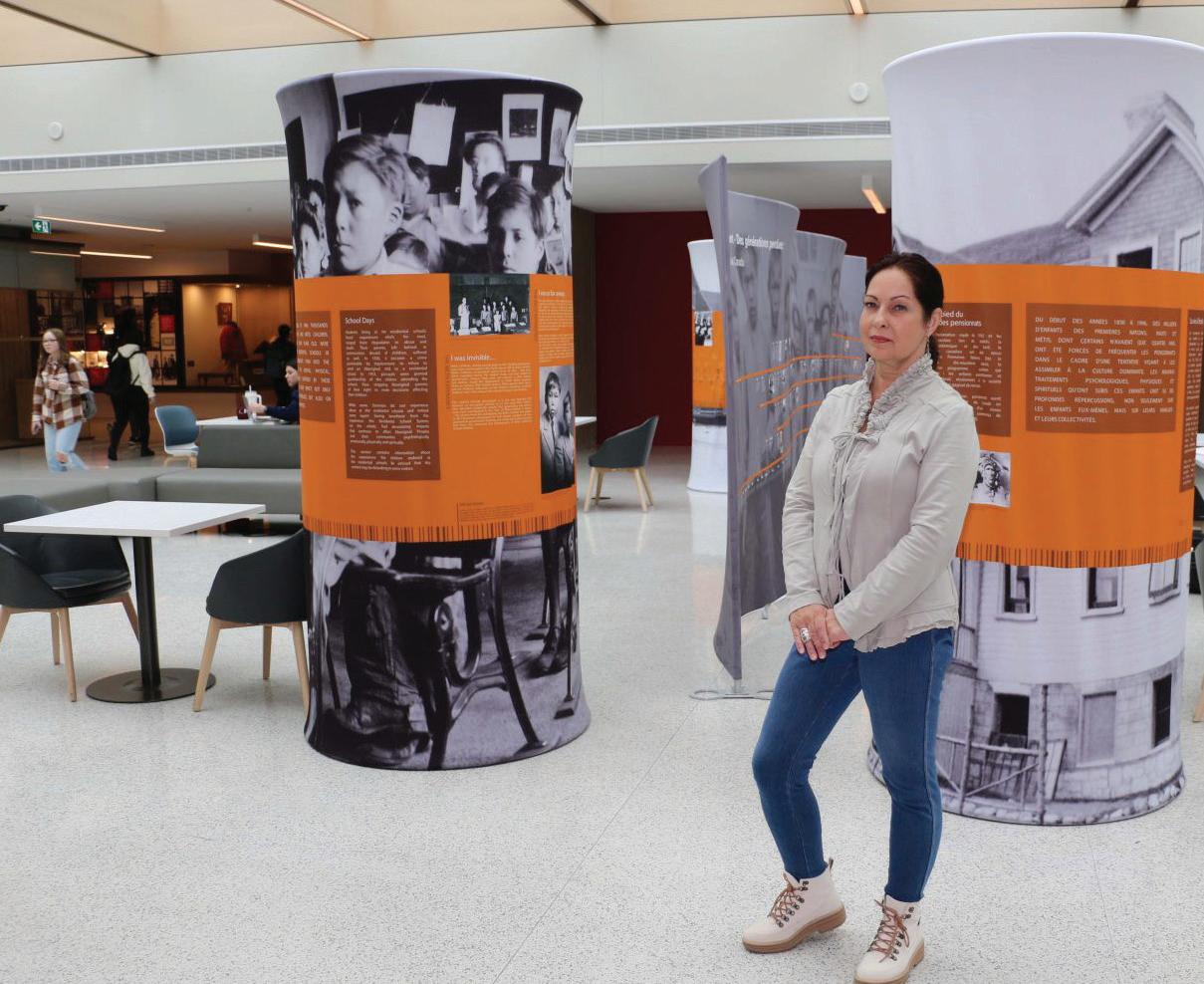
Jennifer Thiessen, Brock Library’s Head of Teaching and Learning, prepares books to be wrapped as part of The Canadian Library initiative.
An exhibition displayed at Brock University teaches participants about Canada’s residential school system while also promoting healing and encouraging acts of reconciliation. The Legacy of Hope Foundation’s Killing the Indian in the Child: Generations Lost was displayed in Brock’s Rankin Family Pavilion from Oct. 16 to Nov. 1, 2023, remembering the more than 150,000 Indigenous children forced to leave their families and attend residential schools, where various forms of abuse took place and many children did not survive. The organization’s 30- by 15-foot walkthrough exhibition showcased a timeline of the residential school system as well as the experiences of survivors.
brocku.ca/brock-news/2023/10/exhibition-to-educate-brock-communityabout-residential-schools/
Brock displays sculpture by renowned Indigenous architect
The Brock Library’s Makerspace was the temporary home of a bronze sculpture created by renowned Indigenous architect Douglas Cardinal. Sunflame will take its place as the centrepiece of the First Nations Peace Monument at Decew House Heritage Park in Thorold in spring 2024. Brock partnered with the non-profit community group Friends of Laura Secord to display Sunflame so the community can enjoy the sculpture before it moves to its permanent location.
brocku.ca/brock-news/2024/01/brock-displays-sculpture-byrenowned-indigenous-architect/

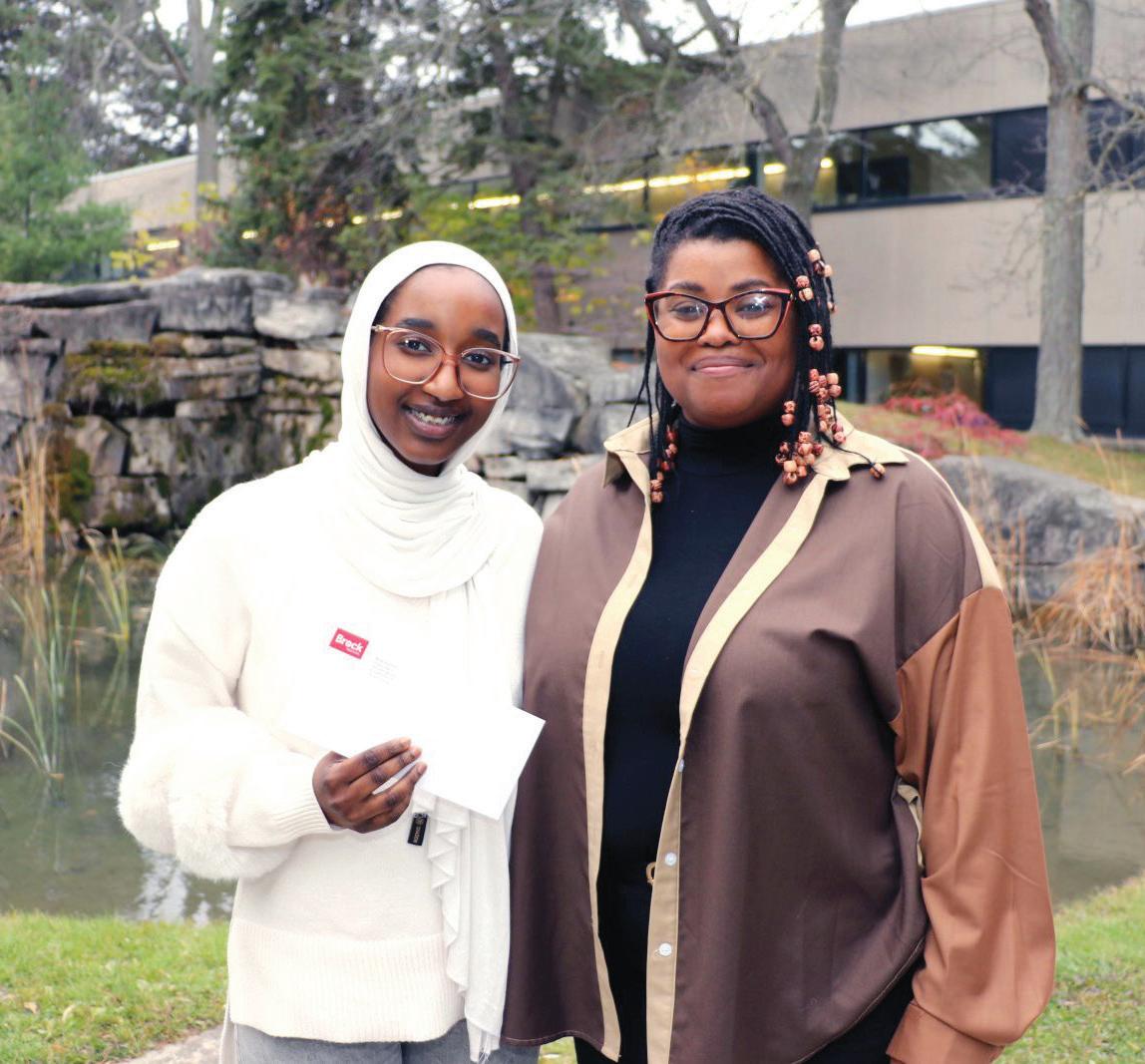
Rayan Ebadalla, who is in her first year of Brock’s Medical Sciences program, was recently honoured at Brock’s LEVEL UP: Black Secondary Student Symposium, which welcomed more than 150 Black secondary students from Niagara and Hamilton to the University’s main campus on Nov. 23, 2023. Hosted by Brock’s Human Rights and Equity (HRE) team, the symposium aimed to give those in attendance a glimpse into post-secondary life while also making them feel both welcome and comfortable on campus. Along with speaking to visiting high school students, Ebadalla was on hand to receive the 2023 Future Black Female Bursary for Black Women in a STEM Program from Future Black Female and the General Motors African Ancestry Network. brocku.ca/brock-news/2023/11/event-highlights-brocks-supportsfor-black-students/
Brock to launch Indigenous continuing education programming
Professionals, organizations and community members looking to enhance their Indigenous knowledge will have options available through Brock University. In Oct. 2023, the Hadiyaˀdagénhahs First Nations, Métis and Inuit Student Centre, the Office of the Vice-Provost, Indigenous Engagement, and Brock University Professional and Continuing Studies (PCS) launched new Indigenous programming with an event hosted for the Brock and wider Niagara community. Hadiyaˀdagénhahs and PCS have collaborated to bring existing and new learning opportunities of Indigenous teaching to the public as part of Brock’s Continuing Education and Professional Development programming. The learning opportunities are intended for anyone interested in deepening their knowledge of Canadian Indigenous culture and practices to create a more inclusive workplace and community.
brocku.ca/brock-news/2023/10/brock-to-launch-indigenouscontinuing-education-programming/
Brock named one of HamiltonNiagara’s Top Employers for sixth time
Brock University has been named one of the Hamilton-Niagara’s Top Employers for 2024. Having been selected in every year it has applied, this is the sixth time and fourth consecutive year that Brock has been recognized in the annual competition organized by the editors of Canada’s Top 100 Employers, which is now in its 16th year. The designation recognizes organizations in the Hamilton-Niagara area that lead their industries in providing exceptional places to work. The 2024 winners were announced in a feature published Nov. 23, 2023, by The Hamilton Spectator. Brock President and ViceChancellor Lesley Rigg says the designation is validation of Brock’s reputation as an exceptional place to work. brocku.ca/brock-news/2023/11/brock-named-one-of-hamiltonniagaras-top-employers-for-sixth-time/

• Men’s Curling – OUA silver
• Men’s Rowing – CURC silver
• Figure Skating – OUA individual event silver and team event bronze
• Men’s Fencing – OUA individual event silver
FIRST-TEAM ALL-CANADIAN
• Madalyn Weinert (Women’s Basketball)
• Mitchell Armstrong (Men’s Lacrosse)
• Connor Dodds (Men’s Rowing)
• Stephen Harris (Men’s Rowing)


The varsity sports teams of Brock University excelled this season as the Badgers secured multiple championship victories and earned several individual honors.
The Brock men's and women's wrestling teams claimed both U SPORTS and Ontario University Athletics (OUA) Championship titles, while the women's volleyball and men's rowing teams each secured OUA championships.
Additionally, Michael Ivanov of the men's track and field team won individual gold and bronze medals at OUA and U SPORTS levels, respectively.
Other notable achievements include a provincial silver medal in men's basketball and men’s curling and a silver at the Canadian University Rowing Championships (CURC) for the men's rowing team.
Brock Sports celebrated its studentathletes with the Celebration of Academic Excellence Breakfast, which honoured a total of 261 student-athletes who achieved an average of 80 per cent or higher within their program of study during the 2022-23 academic year.
The Badgers enjoyed success across numerous sports with six championship banners, 14 teams appearing at national championships and 26 national All-Canadians.
• Men’s Wrestling – U SPORTS and OUA champions
• Women’s Wrestling – U SPORTS and OUA champions
• Men’s Rowing – OUA champions
• Women’s Volleyball – OUA champions
OTHER TEAM MEDALS
• Men’s Track and Field – OUA individual gold and U SPORTS individual bronze
• Men’s Basketball – OUA silver
• Women’s Track and Field – OUA individual event silver
• Women’s Rowing – OUA bronze and CURC individual event gold
• Women’s Fencing – OUA team event bronze
• Women’s Swimming – OUA individual event bronze
COACHES OF THE YEAR
• Marty Calder – Men's Wrestling (U SPORTS and OUA)
• Davie Collie – Women's Wrestling (U SPORTS and OUA)
• Tom Kent and Scott Anderson –Men's Rowing (OUA)
• Emily McCarthy – Figure Skating (OUA)
• TJ Manastersky – Men's Hockey (OUA West)
• Sean Medeiros – Men's Rugby (OUA) OTHER MAJOR AWARDS
• Women’s Basketball – OUA Player of the Year – Madalyn Weinert
• Figure Skating – OUA Team Spirit Award
• Men’s Hockey – OUA West Defenceman of the Year – Zach Taylor
• Men’s Hockey – OUA West Player of the Year – Jacob Roach
• Men’s Hockey – U SPORTS Rookie of the Year, OUA West Goaltender and Rookie of the Year – Connor Ungar
• Men’s Rugby – OUA Player of the Year – Steven Commerford
• Women’s Rugby – OUA Community Service Award – Lily Freiburger
• Women’s Rugby – OUA Player of the Year – Paige DeNeve
• Women’s Volleyball – OUA Co-Player of the Year – Sara Rohr
• Men’s Rowing – CURC Men's Athlete of the Year – Stephen Harris
• Men’s Rowing – OUA Men's Rower of the Year – Charles-Etienne Tabet
• Men’s Wrestling – OUA Male Rookie of the Year – Nicolae Gandrabura
• Women’s Wrestling – U SPORTS and OUA Female Rookie of the Year –Francesca Lo Greco
• Women’s Wrestling – OUA Outstanding Female Wrestler – Mia Friesen
• Riley Watson (Men’s Rowing)
• Isabella Durcak (Women’s Rowing)
• Zoe Durcak (Women’s Rowing)
• Clara Sebastianelli (Women’s Rowing)
• Sara Rohr (Women’s Volleyball)
• Nicolae Gandrabura (Men’s Wrestling)
• Callum Knox (Men’s Wrestling)
• Roger Li (Men’s Wrestling)
• Bobby Narwal (Men’s Wrestling)
• Garette Saunders (Men’s Wrestling)
• Brianna Fraser (Women’s Wrestling)
• Mia Friesen (Women’s Wrestling)
• Francesca Lo Greco (Women's Wrestling)
SECOND-TEAM ALL-CANADIAN
• Jacob Roach (Men’s Hockey)
• Connor Ungar (Men’s Hockey)
• Paige DeNeve (Women’s Rugby)
• Gabe Blanchette (Men’s Wrestling)
• Max Budgey (Men’s Wrestling)
• Yazdan Farokhizad (Men’s Wrestling)
• Cassie Corbett (Women’s Wrestling)
• Vanessa Keefe (Women’s Wrestling)
• Jessica Tillmanns (Women’s Wrestling) Winners
• Female Athlete of the Year – Sara Rohr (Women's Volleyball)
• Male Athlete of the Year – Connor Ungar (Men's Hockey)
• Women's Team Coach of the Year –Dave Collie (Women's Wrestling)
• Men's Team Coach of the Year –TJ Manastersky (Men's Hockey)
• Female Team of the Year – Women's Wrestling
• Male Team of the Year – Men's Wrestling
• David S. Howes Spirit of Brock Award
- Catriona Cormier (Women's Hockey)
• David Atkinson Surgite Award – Grace Tawil (Women's Soccer)
• R.M. Davis Surgite Award – Connor Dodds (Men's Rowing)
• Joseph P. Kenny Student Therapist Award – Brianna Bruni
• Brock Sports Performance (BSP)
Student Intern of the Year – Nick Eck
• BSP Impact Award – Dustin Cordeiro
• Marilou Iusi Memorial Service Award – Karen McAllister-Kenny


The Brock Badgers made their mark at the Meridian Centre on Nov. 25, 2023, with the men’s and women’s basketball teams facing off against the McMaster Marauders in a fierce doubleheader. The sixth edition of Paint the Meridian Red marked the first time Brock hosted the slam-dunk extravaganza in downtown St. Catharines since January 2020. The Brock women’s team defeated the McMaster Marauders 82-73 and the men’s team battled but ultimately fell to the Marauders 77-60 in front of a boisterous crowd. In photo: Oluwatito Akinnusi and the Brock women’s basketball team compete at the Meridian Centre in downtown St. Catharines.
brocku.ca/brock-news/2023/11/memorable-return-as-brock-badgerspaint-the-meridian-red/

Convocation Brock Parasport champion’s crowning achievement
Just 10 days after making parafencing history, Amber Briar (BSc ’23) marked another major milestone when she crossed the stage during Brock’s 113th Convocation. Briar graduated with a Bachelor of Science in Kinesiology on June 14, 2023. Earlier in June, she won two gold medals, a silver and a bronze, during the inaugural wheelchair competition events at the Ontario Fencing Association’s Youth and Parafencing Provincial Championships. Briar, who was named to the Canadian Parafencing Team last fall, has also won medals for Canada at the International Wheelchair and Amputee Sports Federation (IWAS)’s World Championship events. brocku.ca/brock-news/2023/06/convocation-brock-parasportchampions-crowning-achievement/
A Brock University student-athlete has earned Olympic talent search funding and an accelerated path to the Olympic Games. Mia Friesen, a third-year Social Sciences student from St. Catharines, was one of 30 finalists during RBC Training Ground to receive funding along with a spot on Team Canada with one of 12 partner National Sport Organizations (NSO). “Mia seems to have a genetic aptitude for high performance, with both her parents being highperformance athletes,” said Chris Woodcroft, High Performance Director, Wrestling Canada. “Our hunch about her abilities can not only be seen on the mat, where she has excelled at Brock University and with our national team, but also in her raw abilities as shown in the RBC program testing. We’re excited to use this funding to help Mia reach her full potential.”
brocku.ca/brock-news/2024/01/brock-wrestling-championnamed-rbc-training-ground-finalist/
HChinese national women’s hockey team, officials visit Brock
Brock’s campus was buzzing with excitement as the Badgers women’s hockey team played host to the Chinese national women’s hockey team on Oct. 5, 2023. This visit culminated in a friendly exhibition game in front of 1,200 enthusiastic fans at Canada Games Park.
“This game means a lot to us on the international stage, bringing accomplishment and humility. Both teams are grateful for this opportunity, and I hope they leave with a sense of achievement,” said Brock women’s hockey head coach Margot Page.
brocku.ca/brock-news/2023/10/chinese-national-womens-hockeyteam-officials-visit-brock/


Brock grad secures spot in Paris 2024
After years of dedication and sacrifice, Brock University graduate Hannah Taylor (BSM ’21) will make her dreams a reality when she steps into the wrestling arena at the 2024 Summer Olympics in Paris. Taylor secured her spot on Team Canada at the Pan-American Olympic Qualifiers in Acapulco, Mexico, on Feb. 29. “When I won my final match, I broke down and cried. For years I’ve been dreaming of going to the Olympics even before ever knowing what sport would take me there,” Taylor said. A native of Summerside, P.E.I., Taylor’s journey to the Olympics is not just a personal triumph but also a source of inspiration for aspiring athletes across Canada.
brocku.ca/brock-news/2024/03/brock-gradsecures-spot-in-paris-2024-olympics/


Brock Badgers goalie signs with NHL’s Edmonton Oilers Connor Ungar says the Brock Badgers and Brock University played a pivotal role in his journey to the National Hockey League (NHL). The first-year Brock Social Sciences student from Calgary inked a two-year, entry-level contract with the NHL’s Edmonton Oilers. Having backstopped the Badgers to a historic campaign this season, Ungar expressed deep appreciation for his coaches and teammates. “My experience with Brock this season was an invaluable opportunity for personal and player development,” he says. “I extend my heartfelt gratitude to all my coaches for their unwavering guidance and my teammates for their constant support and encouragement.”
brocku.ca/brock-news/2024/03/brockbadgers-goalie-signs-with-nhls-edmontonoilers/
Brock Badgers to rally against cancer in Shoot for the Cure game
The Brock women’s basketball team is taking on a formidable opponent in their next game: breast cancer. The team’s 17th annual Shoot for the Cure game, which took place in the Bob Davis Gymnasium on Jan. 20, 2024 to raise money for and awareness of breast cancer research. “Raising money for this cause is especially important to me because of how many women in my family have been affected and continue to be affected by breast cancer,” said forward Olivia Fiorucci, a third-year Kinesiology student from Hamilton. In partnership with other U SPORTS women’s basketball programs across Canada, the Badgers raised funds to help reach the total campaign fundraising goal of $100,000 through virtual and in-person events from Jan. 17 to Jan. 28, 2024.
brocku.ca/brock-news/2024/01/brock-badgers-torally-against-cancer-in-shoot-for-the-cure-game/

The Brock University Alumni Association takes great pride in recognizing the achievements of Brock alumni who have earned prominence as a result of their exceptional professional achievements and/or service to society.

DISTINGUISHED ALUMNI AWARD
The award honours one Brock graduate each year who has earned prominence as a result of their exceptional professional achievements and/or service to society.
• Sarah Viehbeck (BA ’02)
OUTSTANDING YOUNG ALUMNI AWARD
This award honours one young graduate for their outstanding contributions early in their career.
• Jason Ribeiro (MEd ’15)
DISTINGUISHED FACULTY GRADUATE AWARD
This award was implemented to celebrate individual Faculty alumni who have earned prominence as a result of their exceptional professional achievements and/or service to society.
• Mahoganie Hines (BScN ’16) – Faculty of Applied Health Sciences
• Jane Omollo (MEd ’07) – Faculty of Education
• Tom Pennachetti (BA ’86) – Faculty of Humanities
• Mitchell McCurdy (BSc ’18) – Faculty of Mathematics and Science
• Tefari Bailey (BA ’19) – Faculty of Social Sciences
• Alia Lee (BBA ’06, MBA ’07) – Goodman School of Business
brocku.ca/brock-news/2023/08/brock-university-announcesdistinguished-alumni-award-recipients/
COMMUNITY ENGAGEMENT AWARD
This award honours one alumnus/a who has set a high standard for community service and has made a significant contribution as a volunteer to their community.
• Adam Carter (BPhEd ’97)
ALUMNI CO-OP EMPLOYER AWARD
This annual award honours one extraordinary graduate who has contributed to the success of Brock Co-op by being a champion of co-op within their organization, serving as a mentor to co-op students and going above and beyond to help their alma mater promote Brock Co-op.
• Rachel Song (MAcc ’11)
DAVID S. BETZNER AWARD
This award recognizes a graduate who has demonstrated loyalty and commitment to their alma mater by supporting Brock University and/or the Alumni Association through continuous dedicated volunteer service.
• Vince Anania (BA ’85, BEd ’86)
Brock grad on Time magazine’s list of emerging leaders
Brock University graduate Andreas Flouris (MSc ’04) has been honoured with a place on Time magazine’s TIME100 Next list, which recognizes rising leaders in health, climate, business, sports, the arts and more. Now an environmental physiologist, Flouris completed a Master of Science in Health Sciences at Brock in 2004 under the supervision of Brent Faught, Professor of Epidemiology in the Department of Health Sciences. After graduating, he attended Dalhousie University to pursue a PhD in Thermal Physiology under the supervision of Stephen Cheung, who is now a Professor and Senior Research Fellow with Brock’s Department of Kinesiology. Flouris is now an Associate Professor with the University of Thessaly in Greece and an Adjunct Professor in Environmental Medicine at the University of Ottawa. brocku.ca/brock-news/2023/09/brock-grad-on-time-magazines-listof-emerging-leaders/

Brock grad named one of Canada’s most powerful women
Brittany Straitton is in elite company. The Goodman School of Business graduate (BBA ’09) was recently named to the Canada’s Most Powerful Women: Top 100 list by Women’s Executive Network (WXN). Having received her Bachelor of Business Administration from Brock in 2009, Straitton has taken on a variety of roles with Canadian Tire Corporation (CTC), including category implementation specialist and senior category business manager of the paint portfolio. She is now the company’s Vice-President of Forecasting, Replenishing and Planning. In her current role, Straitton is responsible for the correct timing of the $11-billion flow of goods from vendors to CTC’s stores at the right quantities. She is also passionate about promoting diversity and inclusion, and she was one of the founders of CTC’s Families Employee Resource Group, which provides support and resources for diverse family experiences. brocku.ca/brock-news/2023/11/brock-grad-named-one-ofcanadas-most-powerful-women/



Award-winning grad changing lives through sport
Jason Ribeiro (MEd ’15) was recognized for his accomplishments and community impact as the 2023 Brock University Alumni Association’s (BUAA) Outstanding Young Alumni award recipient during Brock’s Alumni Recognition Reception in September 2023. After overcoming strife in his early to young adult life, Ribeiro has been steadfast in his commitment to bridging Calgary’s diverse communities through sport and entertainment. He has spent nearly a decade volunteering with several groups in Calgary to advocate for community sport and recreation, including Sport Calgary, Global Shapers Calgary and Education Matters. Last October, Ribeiro combined his passion for sport, youth mentorship and community to help bring a professional basketball franchise to Calgary as the President and Vice-Chairman of the Calgary Surge. brocku.ca/brock-news/2023/09/award-winning-grad-changing-livesthrough-sport/
NHL playoff teams brimming with Brock alumni Thomas Fenn (BA ’18) has made his way from Bob Davis Gymnasium to Scotiabank Arena – and he’s not alone. Today, Fenn is responsible for turning around media content for the Toronto Maple Leafs in a timely manner during game days. He is currently one of more than 60 Brock alumni working for the NHL franchise during the Stanley Cup playoffs. Fenn said it’s surreal working in pro sports and credits his time at Brock for helping to make his dreams become reality. The Oilers Entertainment Group also includes a strong Brock presence, including more than 25 grads in a variety of roles in key areas, such as marketing, sales, venue and hockey operations.
brocku.ca/brock-news/2023/05/nhl-playoff-teams-brimming-withbrock-alumni/


Brock grad among top Black women leaders in Canada
Shauna Bookal’s passion for equity, diversity and inclusion (EDI) in amateur sport has landed her on a list of 100 Accomplished Black Canadian Women for 2024. A graduate of Brock University’s Sport Management program, Bookal (BSM ’05) advocates to remove barriers for Black, Indigenous and People of Colour (BIPOC) at all levels within the sport system. As Manager of EDI and Student Experience for Ontario University Athletics (OUA), Bookal collaborates with universities and community organizations across Ontario to offer EDI training opportunities for coaches and student-athletes and to help strengthen EDI practices and policies. (Photo courtesy of the Dear World organization from the 2023 NCAA Inclusion Conference).
brocku.ca/brock-news/2024/01/brock-grad-among-top-black-womenleaders-in-canada/




Brock Leaders Citizenship Awards recognize a combination of high academic achievement and personal leadership abilities. The students listed below have demonstrated excellence in fine arts, writing, debating, science, extracurricular activities and/or significant citizenship contributions to the community.
• Isabella Berardi – Goodman School of Business
• Tiya Patel – Applied Health Science
• Anne Pettigrew – Humanities
• Sarah Mothe – Mathematics and Science
• Abigail Grace Ghent – Applied Health Science
• Cana Bishop – Social Sciences
• Victoria Iwaniura – Social Science
• Arden Doupe – Humanities
• Angelina Maria Cochrane – Social Sciences
• Zain Ahmed – Applied Health Sciences
• Sydney Cruz – Social Sciences
• Audrey Gignac – Humanities
• Gideon Joshua Joubert – Mathematics and Science
The Brock University Board of Trustees provides a medal for graduating students who best exemplify Sir Isaac Brock’s spirit with one or more of the following qualities: leadership, courage, innovation, inspiration and community involvement.
• Ashley Giroux – Applied Health Sciences
• Raadhiyah Zowmi – Social Sciences
• Cecily Zeppetella – Social Sciences
• Rexella Dwomoh – Social Sciences
• Justin Wimmer – Mathematics and Science
• Ricardo Alva Oropeza – Mathematics and Science
• Lucas Ramagnano – Applied Health Sciences
• Tamara Tait – Applied Health Sciences
• Ayesha Masood – Education
• Lyn Trudeau – Education
• Miria Pelletier – Humanities
• Madelyn Huston – Humanities
• Jason Ineh – Goodman School of Business
• Hitesh Inder – Goodman School of Business
The President’s Surgite Award recognizes those students who have been outstanding in one or more of the following areas: demonstrated exemplary leadership in a student club, organization, association or team; did something exceptional that helped to advance Brock’s academic reputation; made a significant contribution to student life at Brock; or provided a valuable service to Brock or the broader community.
• Madeline Maguire – Social Sciences
• Allayna Barrett – Applied Health Sciences
• Rexella Dwomoh – Social Sciences
• Grace Chretien – Education
• Katie Young – Applied Health Science
• Abbie Wade – Social Sciences
• Alex Leone – Mathematics and Science
• Hebah Alhaj Ali – Applied Health Science
• Sumin Oh – Goodman School of Business
• Lilian Zabaneh – Goodman School of Business
The Aboriginal Achievement Awards are presented by Brock’s Student Success Centre and Hadiyaˀdagénhahs First Nations, Métis and Inuit Student Centre to honour high-level achievers in their studies and off-campus lives.
• Sophia Carnovale – Applied Health Sciences
The Governor General’s Medals recognize excellence in academic studies. The gold medal is presented to the student with the highest overall average in a graduate program. The silver medals are awarded to the students completing their first four-year bachelor’s degree with the highest and second highest cumulative averages.
• Gold – Mohammed Abbas – Mathematics and Science
• Silver – Daniel Belanger – Humanities
• Silver – Scott Miskey – Mathematics and Science
Co-op Students of the Year Awards recognize excellence in job performance, academic achievements and extra-curricular involvement based on a student’s contributions to their co-op employers, co-op education at Brock and the community at large.
• Undergraduate – Parth Patel, BSc Computer Science
• Undergraduate – Aryan Tiwari, BA Business Administration
• Graduate – Nicole Naccarato, Master of Business Administration and Master of Public Health
The Experiential Education Student of the Year Awards recognize students’ achievements in all facets of experiential learning.
• Catherine Van Veen, BA Public Health
This award is presented annually to a faculty member who, in the opinion of their peers, has made an outstanding contribution to the teaching and learning environment at Brock University.
Chantal Buteau, Mathematics: Buteau's remarkable dedication and achievements add on to a long-standing departmental legacy of leadership in mathematics education. Right from when she set foot at Brock in 2004, supported by an encouraging pedagogical environment, Buteau enthusiastically engaged in teaching and improving the unique Mathematics Integrated with Computers and Applications (MICA) program designed at Brock.
Over the years, Buteau pushed her MICA’s educational experiences beyond the walls of Brock by “leading impactful scholarly reflections and collaborations on effective learning trough the thoughtful integration of powerful and pervasive computational technologies resulting in world-class mathematics education research and scholarship recognized by her peers across the world, thus making Brock’s MICA program educational practices a 'model to study and follow” across the continents.'
This award recognizes the contributions to teaching undertaken by a new faculty member who is in the first five years of a tenure-track position.
• Chelsea Jones, Department of Child and Youth Studies
Clarke Thomson Award for Excellence in Sessional Teaching
The Clarke Thomson Award for Excellence in Sessional Teaching recognizes the contributions of part-time/sessional teaching staff who contribute significantly to student learning at Brock University.
• Teresa Hill, Department of Applied Disability Studies
The Don Ursino Award for Excellence in the Teaching of Large Classes is awarded to an outstanding instructor who demonstrates commitment to the improvement of student learning in a large class.
• Erin Panda, Department of Child and Youth Studies



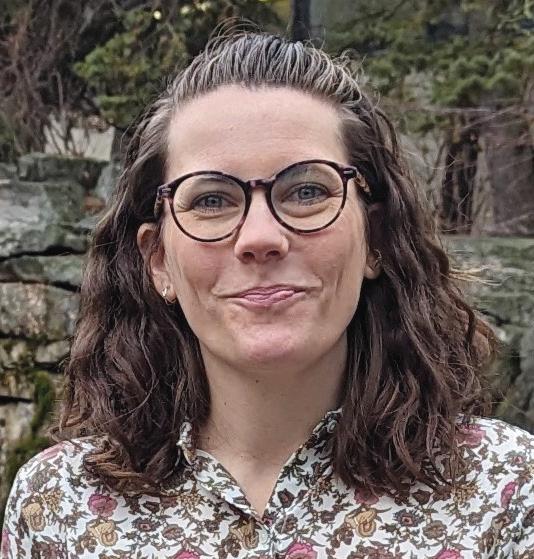
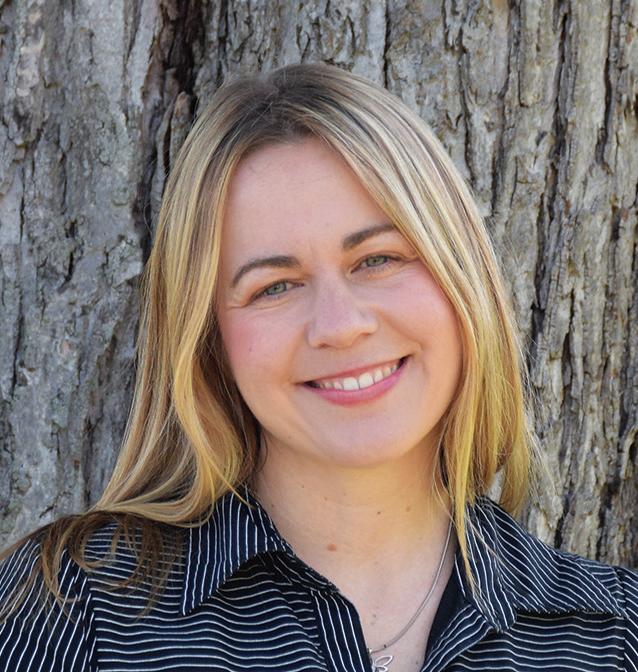


Shuai Yuan, Assistant Professor, Department of Finance, Operations and Information Systems

Ali Emami, Assistant Professor, Department of Computer Science

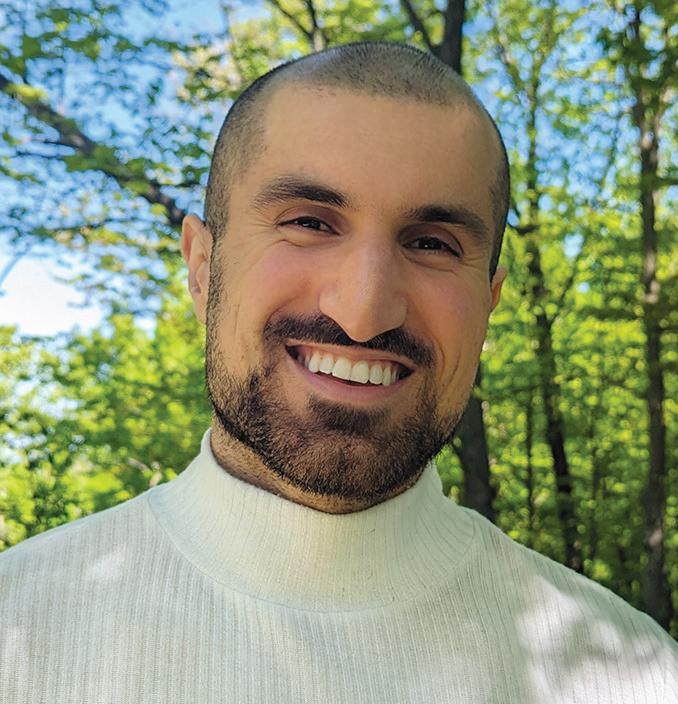
Kyle Rich, Associate Professor, Department of Recreation and Leisure Studies

Rachel Rensink-Hoff, Associate Professor, Department of Music
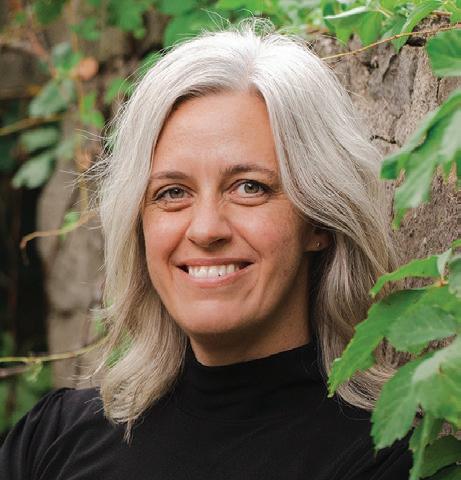
Mohammed Estaiteyeh, Assistant Professor, Department of Educational Studies

Elizabeth Orr, Assistant Professor, Department of Nursing

Goodman School of Business: Shuai Yuan, Department of Finance, Operations and Information Systems
Faculty of Mathematics and Science: Ali Emami, Department of Computer Science
Faculty of Applied Health Sciences: Kyle Rich, Department of Recreation and Leisure Studies
Faculty of Humanities: Rachel Rensink-Hoff, Department of Music
Through the Chancellor’s Chairs for Teaching Excellence, Brock University recognizes the excellent scholarship of teaching of its faculty members and sustains our institutional commitment to teaching, learning and educational technology.
Mohammed Estaiteyeh, Department of Educational Studies
Elizabeth Orr, Department of Nursing
The University celebrates and recognizes Teaching Assistants (TAs) for their contributions in supporting student learning and success at Brock.
Sandra Kroeker, Department of Child and Youth Studies
Richard Trotter, Department of Educational Studies
Huma Khalid, Department of Educational Studies
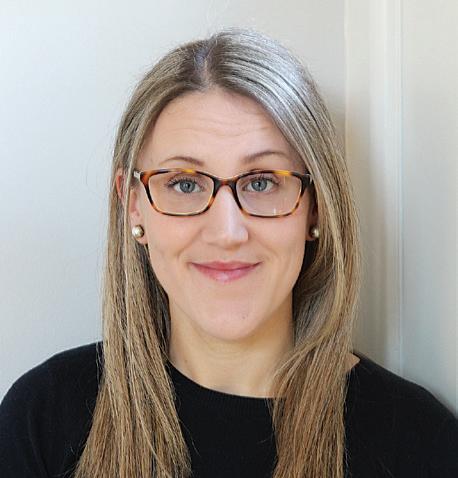


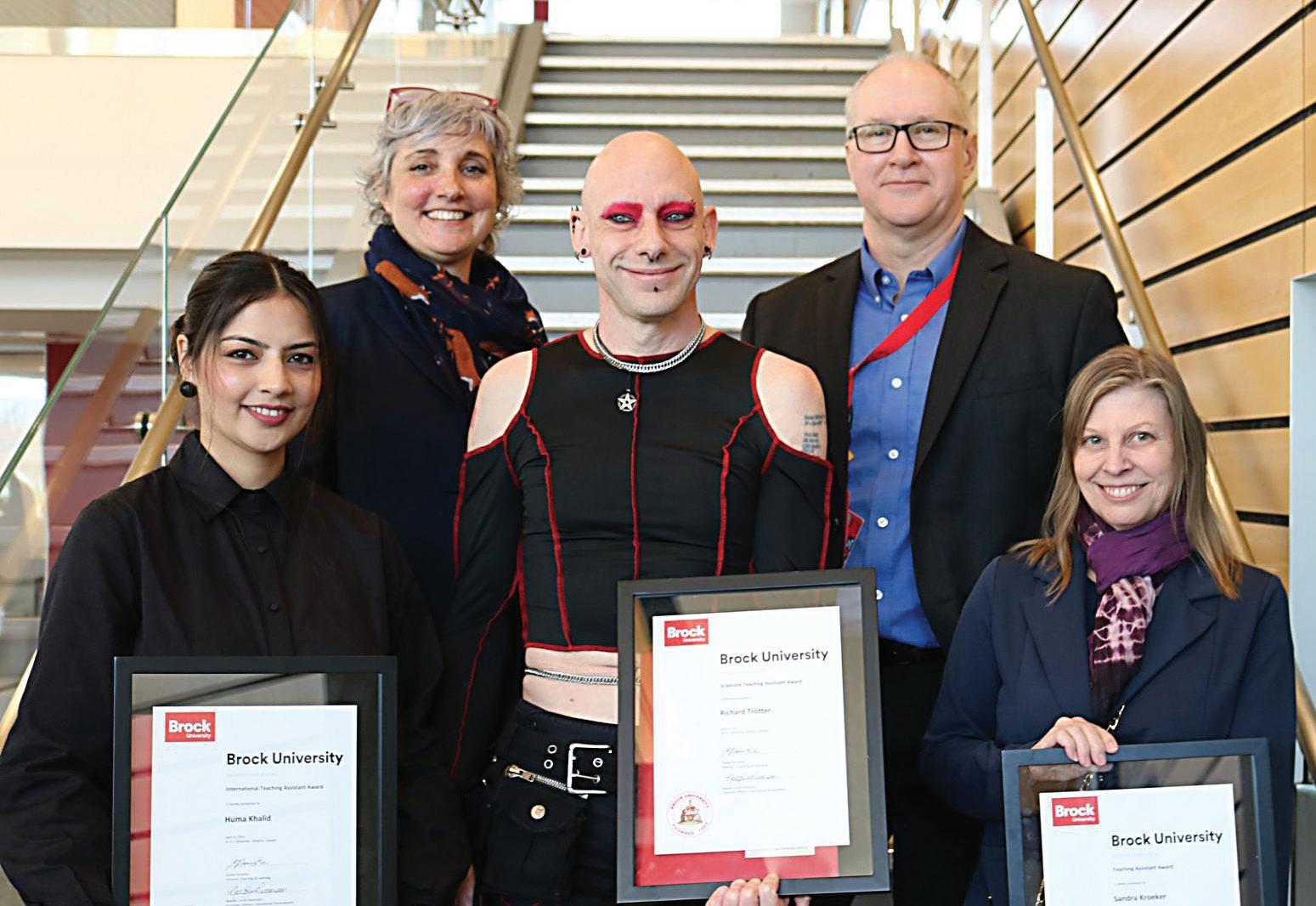
The award recognizes individuals for their vision and leadership on behalf of Graduate Studies in areas such as academic programming, research and scholarship, student services and student experience initiatives.
• Noah Xiao, PhD in Biotechnology
Nominations come from graduate students as an opportunity for them to pay tribute to an individual graduate faculty member who has provided them with outstanding support and encouragement in their development as a graduate researcher.
• Rebecca Raby, Professor, Child and Youth Studies
The Suzanne Curtin – Christopher Yendt Graduate Collaboration Award was created to recognize graduate students who have been outstanding in collaboration and leadership efforts in the Brock graduate community and beyond.
• Mariana Garrido de Castro, Master of Science in Biological Sciences
These awards recognize graduate students who have presented projects that are highly original and are addressing significant questions.
• Ahmad Mohammad, Master of Science in Applied Health Sciences
• Garrick Forman, PhD in Applied Health Sciences
• Lindsay Detta, Master of Education
• Hyacinth Campbell, PhD in Educational Studies
• Paige Groot, Master of Arts in History
• Maya Karanouh, PhD in Interdisciplinary Humanities
• Georgina Gardner, Master of Science in Biological Sciences
• Rozhin Rowshanpour, PhD in Chemistry
• Hanna Puffer, Master of Arts in Psychology
• Melissa Blackburn, PhD in Child and Youth Studies
• Md Ata-e Rabbi, Master of Science in Management


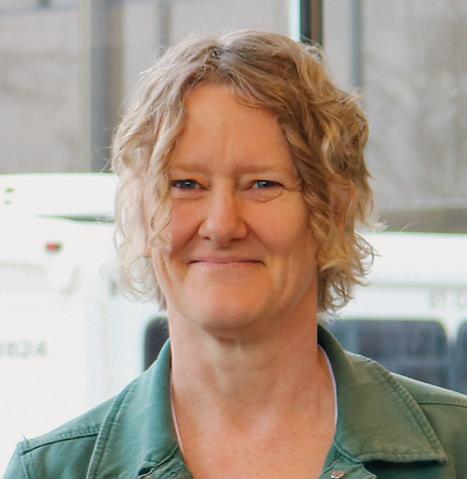

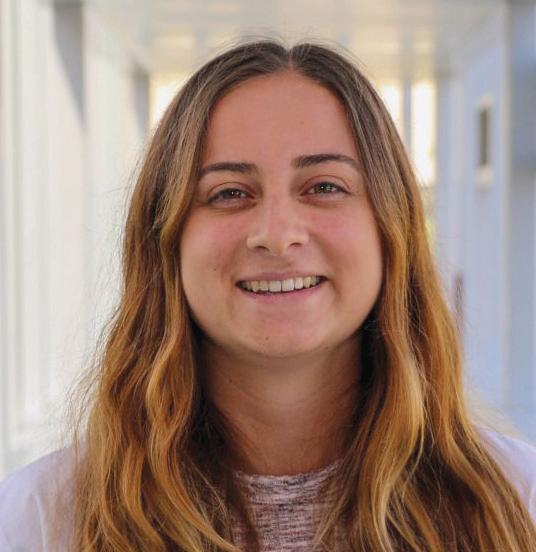

The Horizon Scholarship fund (set to provide $1 million to incoming students over 10 years) is intended to help Brock attract top researchers and students from various fields while building a diverse and inclusive University community. Please see the following link for the full list of recipients: brocku.ca/brock-news/2023/11/dynamic-research-on-the-horizon-from-brock-scholarshiprecipients/
This award is given to Brock graduate student(s) who have demonstrated exceptional advocacy, leadership and actionable accomplishments to advance women and under-represented groups in science, technology, engineering and mathematics (STEM).
• Jessica Braun, PhD in Applied Health Sciences

Sha Shuang, Office and Operation Coordinator, Professional and Continuing Studies

Tania Melnyk, Director, Enrolment Operations, Office of the Registrar

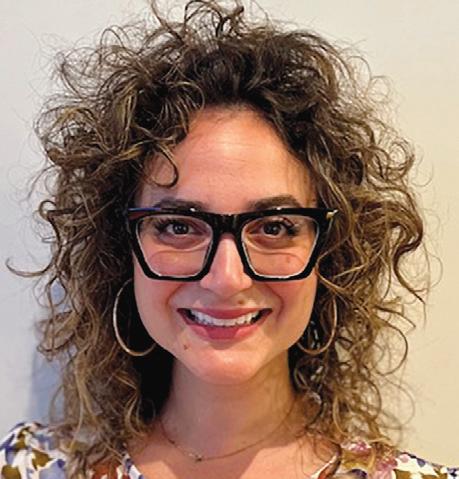
Kim Pelchat, Manager, Instructional Resource Centres, Faculty of Education

Alicia Floyd, Manager, User Services and Engagement, Brock Library


The President’s Distinguished Staff Service Award for Outstanding Contributions recognizes employees who have excelled in demonstrating exemplary service and have provided outstanding contributions to the working environment and culture at Brock at a level significantly beyond normal expectations. The 2023 winners were:
• Sha Shuang, Office and Operations Co-ordinator, Professional and Continuing Studies
• Tania Melnyk, Director, Enrolment Operations, Office of the Registrar
• Kim Pelchat, Manager, Instructional Resource Centres, Faculty of Education
The Office of People and Culture Distinguished Service Award for Leadership is awarded to one staff member each year who has demonstrated a proven record of leading and working collaboratively, engaging fellow employees, building strong partnerships and furthering the development of a respectful work and learning environment. The 2023 winner was:
• Alicia Floyd, Manager, User Services and Engagement, Brock Library
The Outstanding Team Service Award is awarded to one team annually to provide recognition for faculty and staff members who, as a team, have made an outstanding contribution throughout the year beyond what is normally expected. The 2023 team award went to:
• Brock Animal Care Services
THANK YOU for your many years of contribution and for continuing to make BROCK A GREAT PLACE TO WORK!


Brock University celebrates employees who have reached significant service milestones in their careers. Employees who reached these milestones in 2023 were:
• Melissa Beamer, Manager, Student and Partner Engagement, Co-op, Career and Experiential Education
• Todd Bundy, Manager, Information Technology and Projects, Ancillary Services
• Tony Di Petta, Associate Professor of Educational Studies
• Paul Dunn, Professor of Organizational Behaviour, Human Resources Management, Entrepreneurship, and Ethics
• Brent Faught, Professor of Health Sciences
• David Fennell, Professor of Geography and Tourism Studies
• Kara Kelly, Manager, Recruitment, Operations and Communication
• Martin Kusy, Professor of Finance, Operations and Information Systems
• Kelli-an Lawrance, Associate Professor of Health Sciences
• Pierre Lizée, Professor of Political Science
• Nathan Murray, Aquatics Operations Supervisor
• Brian Power, Vice-Provost and Associate Vice-President, Academic and Deputy Provost
• Miriam Richards, Associate Dean, Undergraduate Programs, Faculty of Mathematics and Science
• Barbara Seeber, Professor of English Language and Literature
• Kristen Smith, Manager, Off Campus and Community Experience, Student Life and Success
• Allan Surrey, Manager, IT Infrastructure
• Hichem Ben-El-Mechaiekh, Professor of Mathematics and Statistics
• Ian D. Gordon, Teaching and Learning Librarian, Math, and Science and Applied Health Sciences
• Michael Lozon, Cartographic Designer, Earth Sciences
• Carol McIntosh, Manager, Printing Services brocku.ca/brock-news/2023/12/brock-employees-honoured-atpresidents-celebration/
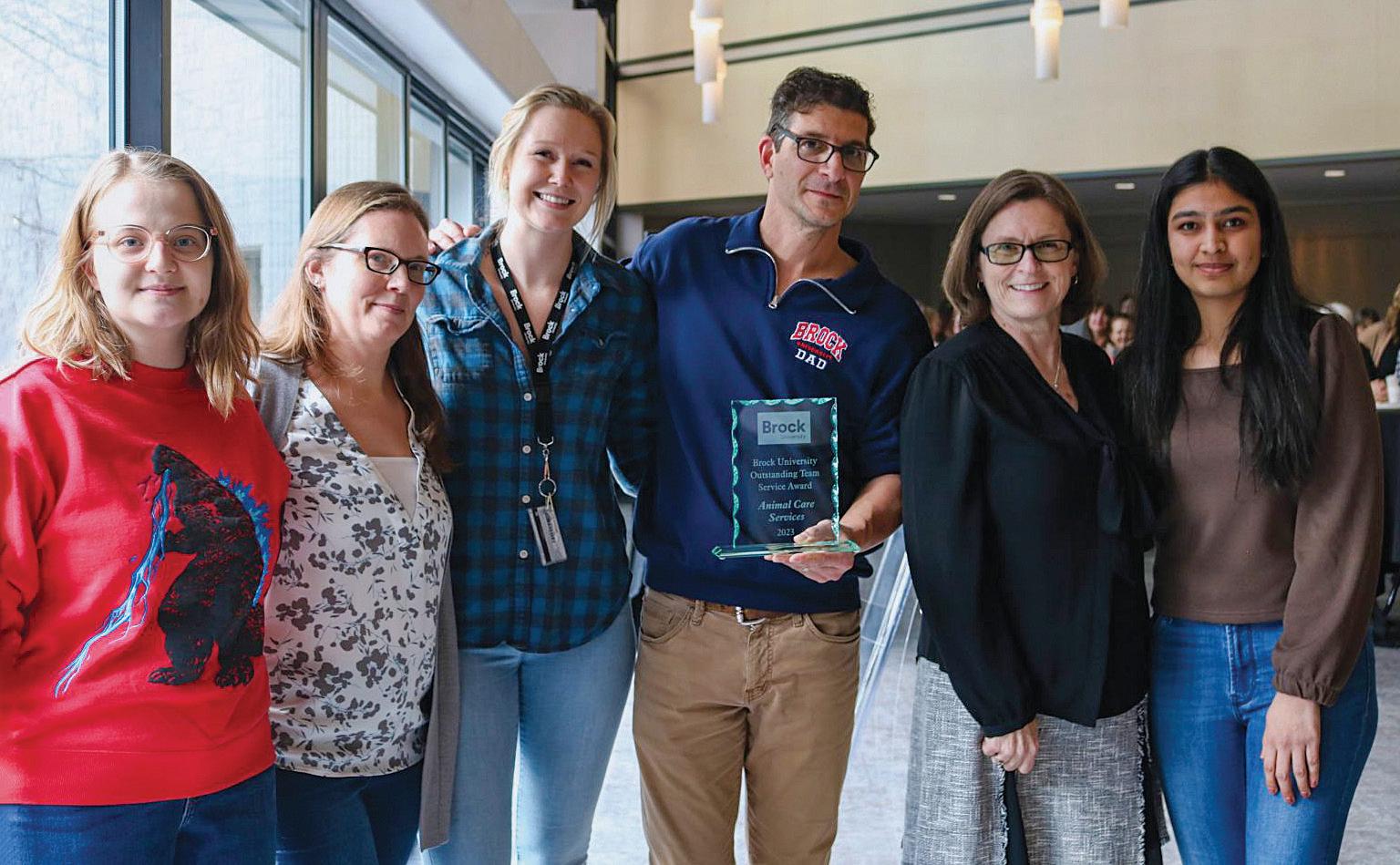


Note: Figures provided by Development and Donor Relations. Figures will differ from the Financial Statements as they represent cash collected, not revenue recognized. The figures will also differ from those reported in Figure 26 of this report due to the source of the donation. Figures include: realized gifts (cash, stock/property/pledge and recurring gift fulfillment, other, gifts in kind, sponsorships, alumni affinity, new gifts and new planned gifts secured).
Supporters – proportion of 2023-24 cash donations (%)
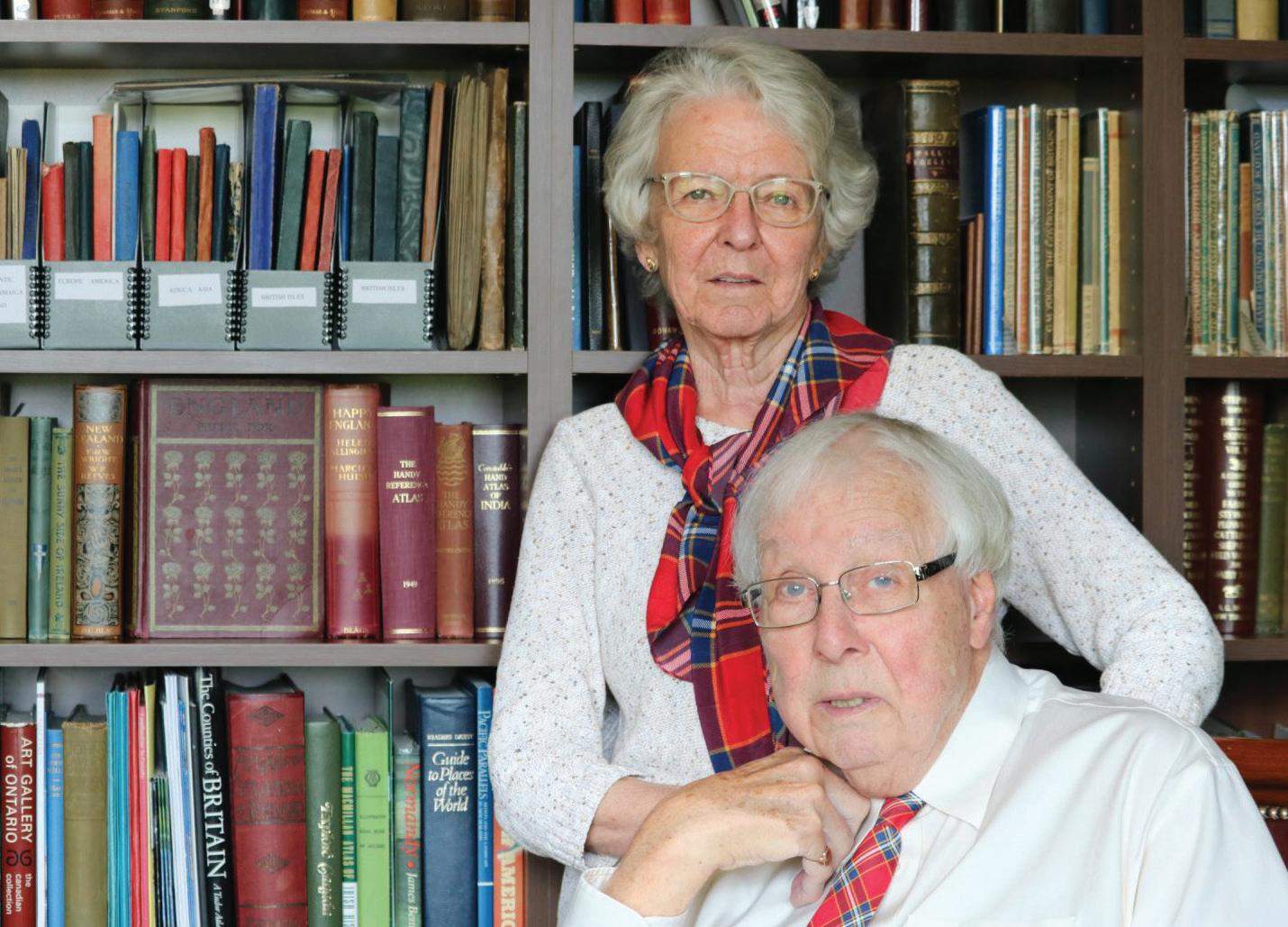
*Other donors may include the following constituencies: friends, honorary doctorate recipients, parents, students, club/organizations, companies or foundations.
Where gifts make an impact –proportion of 2023-24 cash donations (%)
Social media has enabled travellers to easily research destinations, review experiences and share photos, but a century ago, those who could afford to relied on books, paintings and illustrations for information. Now, thanks to a generous gift from Niagara-on-the-Lake residents David Murray and Elizabeth Surtees, Brock Library’s Archives and Special Collections is home to the Twenty Shilling Series, a rare antiquarian book collection devoted to different places around the world. “100 years ago, travel was becoming less strenuous and complicated, but was still very costly,” “At the time, each Twenty Shilling book cost about a week’s pay for a London labourer. While expensive, for book subscribers, 20 shillings was still cheaper than making an actual trip," says Murray. “To pull together a complete collection of 92 books more than 100 years after publication is quite the accomplishment,” says David Sharron, Head of Archives and Special Collections. “We are honoured to house this beautiful collection that will be an important resource for scholars.”
brocku.ca/brock-news/2023/07/niagara-couple-gifts-brock-rare1900s-book-collection/
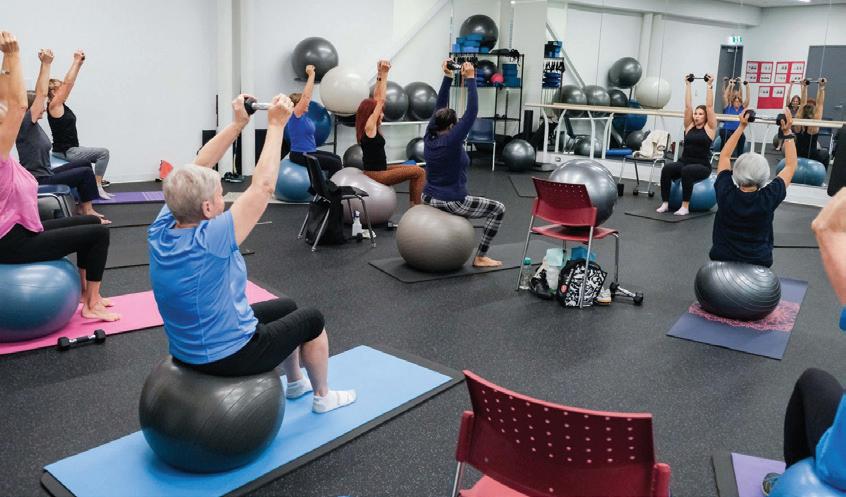
Physical activity and social support can play an important role in the recovery of those battling with cancer. Supported by a $30,000 donation from the Rankin Cancer Run, a new pilot program run by the Brock Functional Inclusive Training (Bfit) Centre offered twice-weekly exercise classes for current or former cancer patients and their caregivers. The 12-week program offered safe exercises and modifications for participants depending on their specific health requirements, says Bfit Manager Ally Fast (BKin ’12). “Participants will hopefully feel more comfortable exercising in a space with others who can relate to their experience and have gone through something similar,” she says.
brocku.ca/brock-news/2024/01/bfit-tooffer-exercise-classes-for-cancer-patientscaregivers/

Ubisoft Toronto has created a game-changing opportunity for emerging talent from Brock University. The games industry leader is providing a boost for Brock game design students to help better reflect the diversity of Ontario’s interactive digital media sector. Building on an existing partnership with the University’s Department of Digital Humanities (DDH), Ubisoft Toronto has established a five-year scholarship that will support equity-seeking groups in forging their professional paths ahead of graduation. Aaron Mauro, DDH Chair and Associate Professor of Digital Media, said Brock’s collaboration with Ubisoft Toronto has been nothing short of transformative.
“Ubisoft’s active engagement and support have opened doors for our students that go beyond traditional academic boundaries, offering them a glimpse into their future careers and the exciting possibilities that lie ahead,” he said.
brocku.ca/brock-news/2024/04/newscholarship-shaping-future-of-gamedesign-in-canada/

Brock is the new home of the Campbell Family Fonds collection, which contains personal and business records dating from 1797 to 1973. Thanks to the generous donation of Andy Campbell, great grandson of John S. Campbell and Elizabeth Oille, the records of a family deeply rooted in St. Catharines’ history are being preserved for future generations. Campbell’s ancestors include some of the city’s most prominent citizens, including Dr. Lucius Oille, who was elected as St. Catharines second mayor in 1878, served as first chairman of the waterworks and was a major contributor to the railway. “Being born and raised in St. Catharines certainly gives me a connection to our community,” Campbell says.
“However, becoming aware of my family’s historical involvement, contributions and impact on the city beyond my father’s leadership role with the Welland Canal and my grandfather’s involvement with the Lincoln and Welland Regiment has been enlightening.”
brocku.ca/brock-news/2024/01/brocklibrary-expands-local-history-collections/

It is exciting to review some of the accomplishments of 2023 to 2024
and showcase what the budget supports. This timeline represents a reflection of excellence in people, their accomplishments and other significant events at Brock – it exemplifies what makes Brock great. Many of the stories are taken from the Brock News as well as from a University-wide call. We encourage anyone who has a story they think would be relevant for next year’s timeline to submit it to annualreport@brocku.ca.
In addition to the events described in the timeline, many of the ongoing awards received by students, alumni, faculty and staff, as well as Brock Sports achievements, student experiences, research accomplishments, community engagement events and Alumni successes, are highlighted in this report.
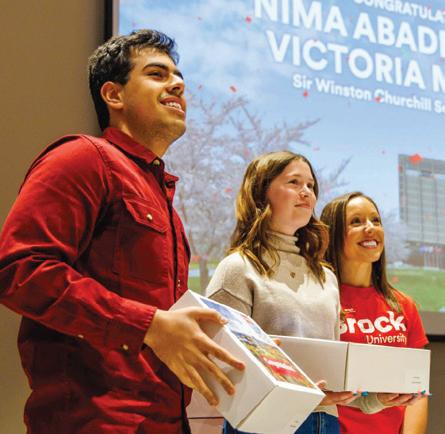
Nima Abadinezhad (left) and Victoria Misener (centre) of Sir Winston Churchill Secondary School were 2 of 66 high school grads to receive the Brock University Niagara Principal’s Scholarship.
brocku.ca/brock-news/2023/05/brock-givesback-with-scholarships-to-66-niagara-high-schoolgrads//
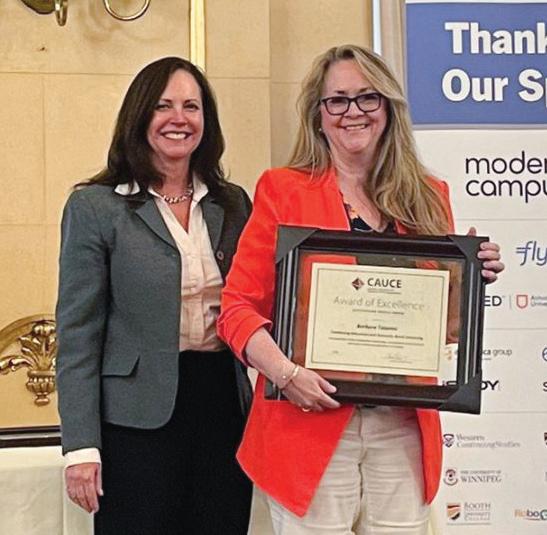
Barb Tatarnic, Manager of Professional Studies and Outreach at the Cool Climate Oenology and Viticulture Institute received the Outstanding Service Award at the 2023 Canadian Association for University Continuing Education’s Annual Conference in Winnipeg. brocku.ca/brock-news/2023/05/barb-tatarniclauded-for-continuing-education-leadership/

Brock's continued efforts to create a sustainable campus recently made strides with the help of $2.9 million in federal funding from Environment and Climate Change Canada's Low Carbon Economy Challenge, Champions Stream. brocku.ca/brock-news/2023/05/brock-gets-29-million-boost-to-support-low-carbon-goals/

A swell of support for Brock University’s student-athletes saw $95,000 raised during the 20th annual President’s Golf Classic on May 29.
brocku.ca/brock-news/2023/05/brockstudent-athletes-win-at-presidents-golfclassic/

Ingrid Makus was reappointed Dean of the Faculty of Social Sciences for her second term effective on July 1.
brocku.ca/brock-news/2023/06/makusreappointed-dean-of-the-faculty-of-socialsciences/
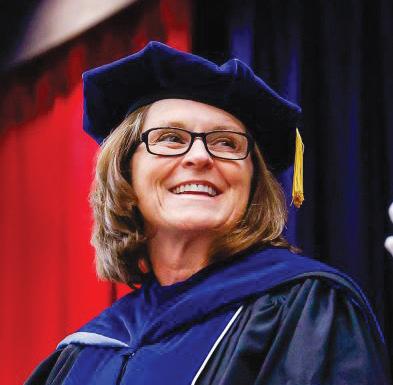
The Times Higher Education (THE) Impact Rankings placed Brock in the top 300 of nearly 1,600 universities from 112 countries around the world that are working towards achieving the United Nations Sustainable Development Goals (SDGs).
brocku.ca/brock-news/2023/06/brocks-globalimpact-recognized-in-worldwide-rankings/
Lesley Rigg was installed as Brock University’s seventh President and Vice-Chancellor on June 12.
brocku.ca/brock-news/2023/06/galleryinstallation-of-brocks-seventh-presidentmarks-start-of-spring-convocation/
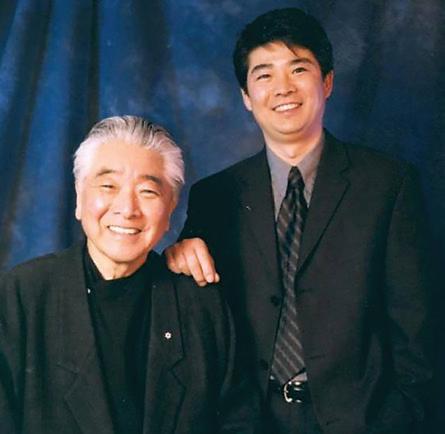
Brock mourned the passing of renowned architect and Chancellor Emeritus Raymond Moriyama – who served as Brock’s sixth Chancellor from 2001 to 2007.

brocku.ca/brock-news/2023/09/ remembering-chancellor-emeritus-visionaryarchitect-raymond-moriyama/

3rd overall for Canada's Best Employer SEPTEMBER

Called one of the best university traditions in Canada by University Affairs magazine, the annual Grape Stomp saw more than 350 students stomp, toss and squish a sea of Concord grapes to celebrate a successful start to the new school year. brocku.ca/brock-news/2023/09/gallery-agrape-day-for-brocks-messiest-tradition/
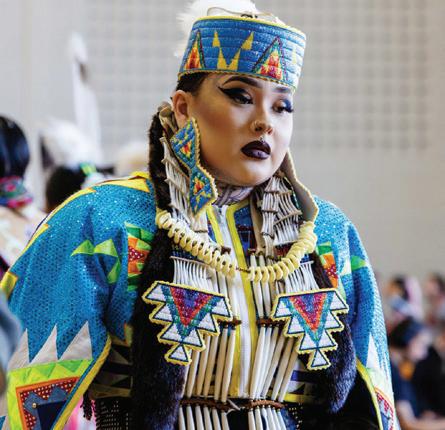
Jan. 19 hundreds of people packed into Ian Beddis Gymnasium to take part in a Pow Wow hosted by Brock’s Hadiyaˀdagénhahs First Nations, Métis and Inuit Student Centre and the Office of the ViceProvost, Indigenous Engagement. brocku.ca/brock-news/2024/01/gallerypow-wow-welcomes-hundreds-to-celebratetogetherness/
The University ranked third overall in the annual list of Canada’s Best Employers compiled by Forbes and market research firm Statista. brocku.ca/brock-news/2024/01/brocknamed-third-best-employer-in-canada-byforbes/
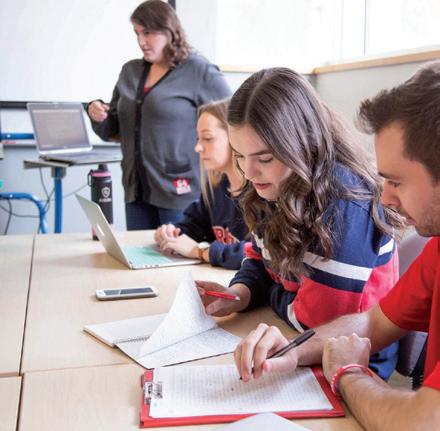

GRADvantage Week, which took place from Sept. 25 to Sept. 29, featuring more than 10 in-person workshops covering essential graduate student skills.
brocku.ca/brock-news/2023/09/ gradvantage-week-to-offer-developmentopportunities-for-grad-students/
Brock University observed National Day for Truth and Reconciliation with a series of events on Sept. 29 to 30, including an 8 a.m. flag-raising ceremony.
brocku.ca/brock-news/2023/09/ recognizing-national-day-for-truth-andreconciliation/
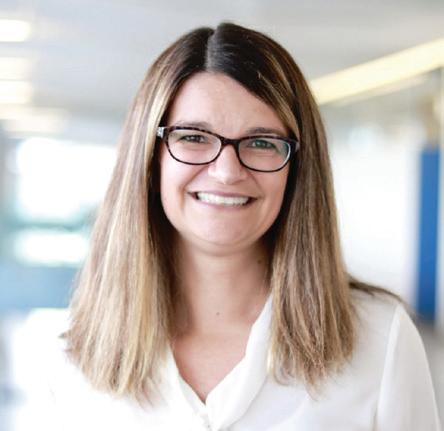
Brock has appointed the experienced university leader Meaghan Rusnell to the position of Interim Vice-President, External, effective Oct 2, 2023. brocku.ca/brock-news/2023/09/meaghanrusnell-named-interim-vp-external/


Brock marks opening of Brock-Niagara Validation, Prototyping and Manufacturing Institute (VPMI) dedicated to supporting industry.
brocku.ca/brock-news/2023/10/brock-marksopening-of-landmark-institute-dedicated-tosupporting-industry/
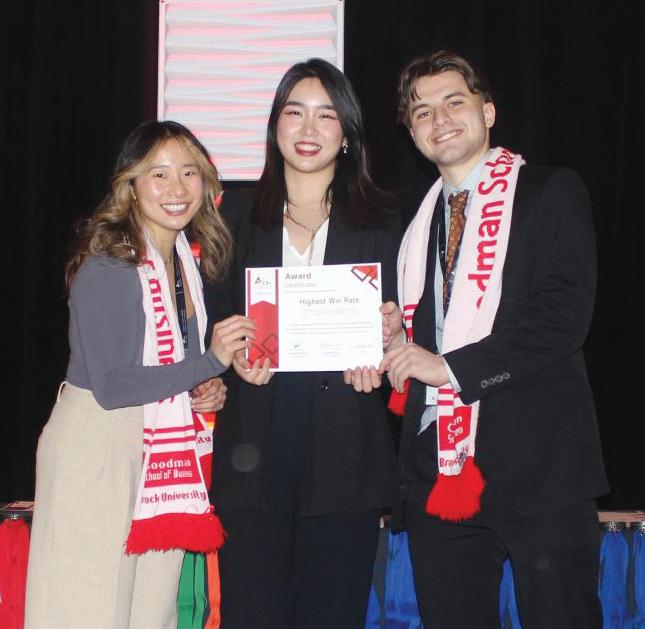
ACE Goodman CoPresidents Haley Kim (left) and Jack Rupcic (right) accept the highest win rate award from an ACE Canada representative during the ACE Canada nationals held Jan. 19 and Jan. 20 in Toronto. brocku.ca/brock-news/2024/01/goodmanstudents-win-national-title-at-ace-canadacompetition/
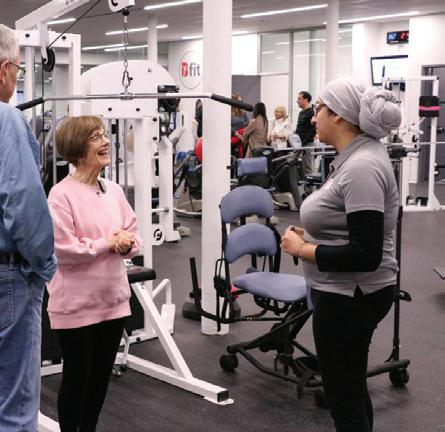
Brock Functional Inclusive Training (Bfit) Centre, which offers exercise programs aimed at improving the health and quality of life of older adults officially opened its new, state-of-the-art facility.
brocku.ca/brock-news/2024/01/communityhealth-collaborations-at-heart-of-brockfunctional-inclusive-training-centre//
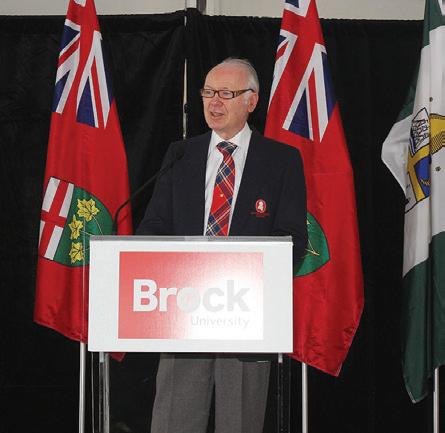
Brock University is saddened by the loss of Norris Walker, a steadfast supporter of the University and local community. Walker passed away in St. Catharines on Jan. 27 at the age of 91.
brocku.ca/brock-news/2024/02/brock-mournspassing-of-longtime-university-supporter-norriswalker/
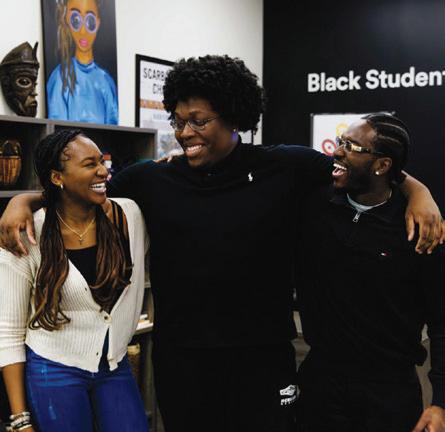
Events and activities throughout February celebrated Black History Month/African Heritage Month (BHM/AHM) at Brock University. brocku.ca/brock-news/2024/01/blackhistory-and-african-heritage-to-be-thefocus-of-month-long-celebration/
The University’s Black Student Success Centre (BSSC) opened on Oct. 26, 2023. brocku.ca/brock-news/2023/10/ celebration-to-mark-opening-of-brocksblack-student-success-centre-thursday/
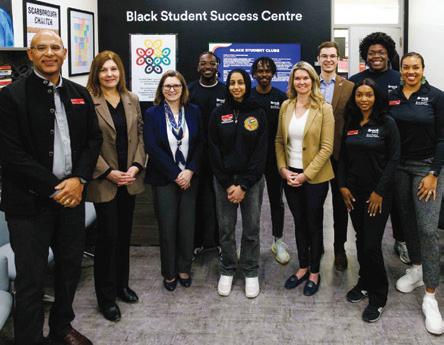
Honourable Jill Dunlop, Minister of Colleges and Universities, and the Honourable Nina Tangri, Associate Minister of Small Business and other officials visited Brock on Feb. 1 celebrating students work on BSSC and more. brocku.ca/brock-news/2024/02/ontarioministers-visits-highlight-student-achievements/
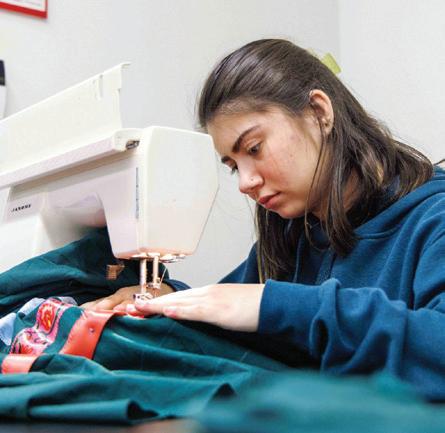
Indigenous Peoples Awareness Week at Brock from June 19 to 23 showcased 20 workshops and guest presentations and was open to everyone, including those in the Brock and wider community.
brocku.ca/brock-news/2023/06/weekof-teaching-and-workshops-to-celebrateindigenous-peoples/

Brock University President Lesley Rigg speaks at the Niagara Economic Summit on Nov. 1, where Brock’s critical role in the community was highlighted.
brocku.ca/brock-news/2023/11/brockscritical-role-in-the-community-highlightedat-niagara-economic-summit/

Robyn Bourgeois, Brock’s ViceProvost, Indigenous Engagement, was presented with the Greater Niagara Chamber of Commerce’s 2023 Community Leadership Award by Niagara Region Associate Director of Economic Development Marco Marino (BA ‘03).
brocku.ca/brock-news/2023/06/bourgeoishonoured-for-local-leadership/
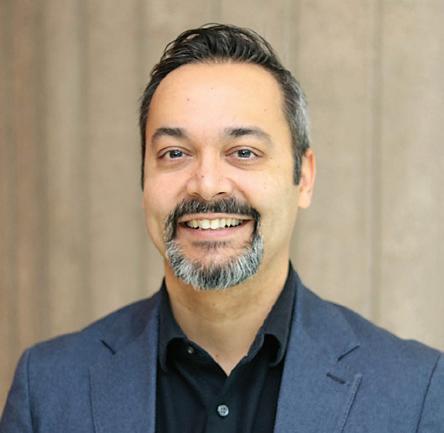
Vice-Provost of Teaching and Learning Rajiv Jhangiani was recently elected to the board of directors of Open Education Global.
brocku.ca/brock-news/2023/07/jhangianielected-to-board-of-global-open-educationorganization/
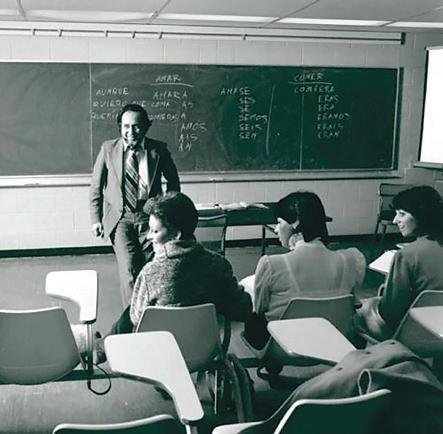
Brock mourned the loss of Juan Amadeo Fernández, who was among the first seven faculty members to teach at the University when it was founded in September 1964.
brocku.ca/brock-news/2023/07/brockhonours-legacy-of-founding-facultymember/

The former Lester B. Pearson High School at 1433 Headon Rd., Burlington will be home to the Teacher Education programs (professional/Bachelor of Education years) for the 202324 and 2024-25 academic years. brocku.ca/brock-news/2023/07/faculty-staffmove-to-interim-burlington-campus/

Brock has appointed Chelsea Takalo as its first Associate VicePresident, Equity, Diversity and Inclusion. brocku.ca/brock-news/2023/08/chelseatakalo-appointed-new-associate-vicepresident-equity-diversity-and-inclusion/

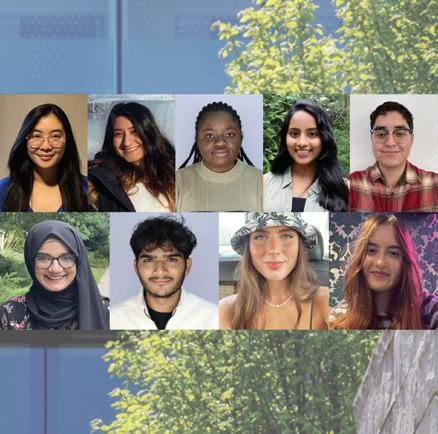
More than 100 Ontario participants, mostly from the Niagara region, Six Nations of the Grand River, Mississaugas of the Credit First Nation and Simcoe-Muskoka, attended the “Healing Circles of Engagement, Weaving Relationships in Research" event.
brocku.ca/brock-news/2023/08/indigenousresearch-student-experiences-shared-at-communityevent/
Brock University welcomed a new group of International Student Ambassadors for the 2023-24 academic year who foster a welcoming environment for students from outside of Canada through mentoring. brocku.ca/brock-news/2023/08/new-studentambassadors-ready-to-welcome-internationalpeers/
JANUARY
16 Days of Activism Against Gender-based Violence
An international 16 Days of Activism campaign against gender-based violence identities took place a Brock from Nov. 25 to Dec. 10.
brocku.ca/brock-news/2023/11/events-tomark-16-day-campaign-against-genderbased-violence/

Held Nov. 29, the inaugural International Educator Information Day in Toronto welcomed nearly 100 industry partners and educators to learn about all Brock has to offer.
brocku.ca/brock-news/2023/12/brockprograms-highlighted-at-event-forinternational-educators/
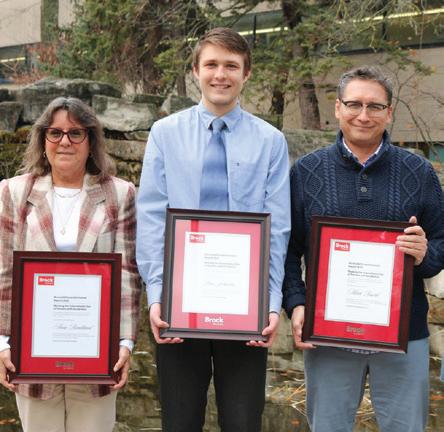




From left: Anne Readhead, Educational Developer, Centre for Pedagogical Innovation; Ben Johnson (BA ’22), Master of Arts student in Child and Youth Studies; and Mitch Baird, Web Developer, FAHS were presented with the 2023 Accessibility and Inclusion Recognition Award. brocku.ca/brock-news/2023/12/brock-employeesstudent-honoured-for-accessibility-inclusion-allyship/
On Dec. 15 Canada’s first concurrent Nursing graduating class, the first class of Canada’s only concurrent BN/MN program, celebrated the completion of the accelerated degree with a ceremony at Brock. brocku.ca/brock-news/2023/12/brockceremony-celebrates-canadas-firstconcurrent-nursing-graduating-class/

Empty red dresses hanging throughout Brock’s campuses honoured missing and murdered Indigenous women, girls and twospirit people from Feb. 12 to Feb. 16 – part of The REDress Project. brocku.ca/brock-news/2024/02/red-dressdisplay-event-to-remember-missing-andmurdered-indigenous-women-and-girls/

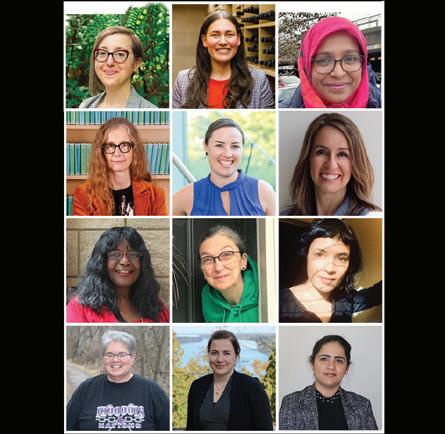


On Feb. 15 Brock University President and Vice-Chancellor
Lesley Rigg (left) and Interim Provost and Vice-President, Academic Tim Kenyon (right) answer questions during the State of the University event.
brocku.ca/brock-news/2024/02/ brock-celebrates-successes-prepares-forchallenges-at-state-of-the-university/
A dozen women researchers at Brock University share the impacts of, and insights gained from, their research to mark International Women’s Day on March 8.
brocku.ca/brock-news/2024/03/internationalwomens-day-how-brock-women-researchersare-creating-meaningful-change/
The Rankin Family Pavilion Atrium saw a flood of interested students, staff, faculty members and community visitors on March 22 at Brock’s World Water Day Celebration.
brocku.ca/brock-news/2024/03/gallerycommunity-gathers-for-brocks-inauguralworld-water-day-celebration/
On March 30 Brock University’s Cool Climate Oenology and Viticulture Institute (CCOVI), Cuvée Grand Tasting saw nearly 500 wine enthusiasts and industry professionals gather to celebrate the best in Ontario food and wine. brocku.ca/brock-news/2024/04/brockcelebrates-wine-industrys-best-at-cuveesbig-return/
Dr. Tim Kenyon is appointed to the role of Interim Provost and Vice-President, Academic, starting Jan. 1. brocku.ca/brock-news/2023/12/timkenyon-appointed-interim-provost-and-vicepresident-academic/
There is a new but familiar face at the helm of Brock University’s research enterprise. As of Jan. 1, Michelle McGinn has assumed the role of Acting VicePresident, Research. brocku.ca/brock-news/2024/01/michellemcginn-named-acting-vice-president-research/
Competitors from the Goodman School of Business and two other Canadian univerities celebrate their achievements as the top three overall winners at the 2024 MBA Games’ closing ceremony.
brocku.ca/brock-news/2024/01/mba-gamesshine-spotlight-on-brocks-goodman-schoolof-business/
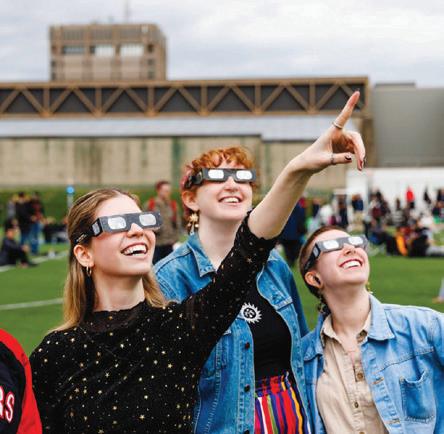
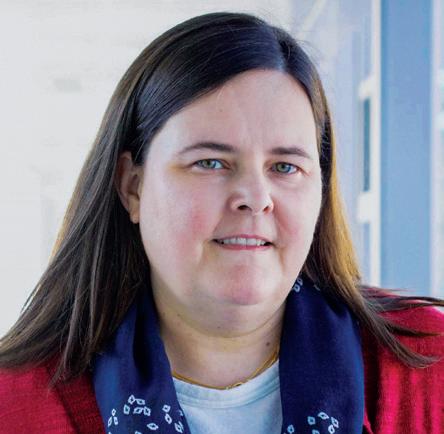

Brock University welcomed the community to campus April 8 to experience a variety of educational exhibits and activities, in addition to witnessing the total solar eclipse on Alumni Field. brocku.ca/brock-news/2024/04/galleryeclipse-experience-leaves-community-inawe//
Nicole Nolan, an experienced leader with a deep background in academic librarianship, has been appointed Brock's next University Librarian, effective May 1.
brocku.ca/brock-news/2024/04/brockappoints-next-university-librarian/
Suzanne Curtin has her term extended as Vice-Provost and Dean, Faculty of Graduate Studies and Postdoctoral Affairs by one year.
brocku.ca/brock-news/2024/04/suzannecurtins-term-extended-as-vice-provostand-dean-faculty-of-graduate-studies-andpostdoctoral-affairs/

Wellness continues to be an integral focus of the Brock community as we focus on how well-being influences overall employee health and supports a culture that values work-life balance.
The University’s holistic Workplace Wellness Framework was developed to address employee well-being, based on the American Substance Abuse and Mental Health Services Administration’s eight dimensions of wellness (see Figure 33), which has evolved since its inception. Some of this past year’s initiatives included:
• Physical activity challenges which are developed to be incorporated into the workday and build healthy habits of health and prevention.
• “Making Kindness The Norm” annual campaign in collaboration with Random Acts of Kindness Campaign.
• The protection against second-hand smoke and vapour: smoking and vaping of tobacco, nicotine or related products is prohibited except in established outdoor designated smoking areas, and smoking and vaping of recreational cannabis is prohibited.
• The Work-Life Balance Bulletin offers tips and recommendations for separating work activities from personal time.
• Many virtual and in-person seminars and resources continue to be shared with faculty and staff to promote well-being.
• Brock continued to promote the enhanced Employee and Family Assistance Program electronic platform, which provides a wide range of individualized, confidential and voluntary support services to eligible employees and their dependents.
• Brock leveraged resources from local, provincial and federal partners in mental health, aiding in decreasing barriers to care like time and financial constraints.
• The 21st annual Wellness Day brought in almost 700 staff and faculty taking part in a day of 70+ activities on campus and in the Niagara region while connecting with new and familiar colleagues.
Central to the Workplace Wellness Framework is the Employee Mental Health Strategy, which promoted positive mental health to ensure the following objectives were achieved:
1. Raised awareness and promoted well-being.
2. Developed personal resilience and self-management.
3. Addressed gaps by enhancing services, programs. and supports through prevention.
4. Created and sustained a supportive campus environment.
An integral component of the strategy is the Mental Health Commission of Canada’s The Working Mind Training, which is designed to reduce the stigma around mental health/illness in the workplace by creating a culture that fosters greater awareness and support for mental health-related challenges. As a result of this work and focus, the University has seen a statistical decrease in the number of short-term sick claims related to mental health and is at its lowest since before the pandemic. Brock University is also coming in 20 per cent lower mental health claims than the benchmark across the long-term disability education industry experience. The University continues to ensure mental health resources are both available and applicable to adapt to the changing needs of our Brock community.
EMOTIONAL
Coping e ectively with life and creating satisfying relationships
ENVIRONMENTAL
FINANCIAL
Satisfaction with current and future nancial situations.
Good health by occupying pleasant, stimulating environments that support well-being. SOCIAL
INTELLECTUAL
Recognizing creative abilities and nding ways to expand knowledge and skills.
PHYSICAL
Recognizing the need physical activity, diet, sleep and nutrition.


























Expanding our sense of purpose and meaning in life. D conn well-d
Developing a sense of connection, belonging and a ell-developed support system.
SPIRITUAL




OCCUPATIONAL Personal satisfaction and enrichment derived from one’s work
In support of Brock’s strategic goal of fostering a culture of inclusivity, accessibility, reconciliation and decolonization, the Office of People and Culture led the development of the University’s first equity census to assist in better understanding the current demographic makeup of the campus and to improve how we track our progress in becoming a more equitable and diverse place. The data collected in the census will be made available to the public via an interactive dashboard, currently in development.
The information gathered from the census, the extensive consultations conducted by the project team’s external consultant, and the review of several University documents and policies will be used to finalize Brock’s Employee EDI Strategy, which will include recommendations and timelines for implementing key initiatives to reach our employee EDI strategic goals.
Building on the success of Brock's leadership programs, “Leading at Brock” and “Emerging Leaders” in 2024, we have redesigned the offering and adjusted workshops to cope with current demands, changes in the leadership landscape and the ever-challenging labour market.
The Emerging Leaders program helps to build skills for those in non-management positions who wish to take on more significant leadership roles within their current sphere of influence and scope of duties. This program supports the talent management needs of the University by providing individuals with leadership potential, access to training and support required to prepare them to take on positions and/or assignments of increased responsibility and/or complexity.
The “Leading at Brock” program is for current, new, or seasoned people leaders looking to enhance their leadership capabilities. This workshop series seeks to deepen and strengthen leadership skills and increase knowledge of core cross-functional topics related to management at Brock. The Leading at Brock program is targeted training in crucial leadership skills, such as communication, decision-making, conflict resolution, strategic thinking, project management and leading change.
Crucial Conversations, a program that combines strategies, theories and tools to turn a difficult conversation into a
constructive and positive dialogue, was concluded in January 2024. With a vision of delivering a robust, comprehensive, practical and structured leadership development program, the People and Culture Office is exploring and evaluating other models to provide workshops in this area.
As part of our evolving leadership development platform vision, the People and Culture Office concluded the Harvard Manage-Mentor program in December 2023. This program was fueled by the latest thinking and proven practices from Harvard Business Publishing's world-class experts with several employees completing the full program while others completed the individual applicable courses.
The Brock Employee Mentorship Program will be relaunched in June 2024. This program intends to match mentors and mentees from across the University, building relationships, growth experiences and collaboration opportunities.
Our people are the key to Brock’s success. We appreciate all faculty and staff for their dedication, and we will continue to recognize our exceptional Brock team with incentives and initiatives. Figure 34 depicts employee headcount by employee group as of May 1, 2024.
Workday finance has significantly enhanced Brock’s ability to understand and report on the financial transactions of the University. The following Workday facts only scratch the surface of the information available to users of the University’s financial information.
Figure 35: Supplier invoice lifecycle (2023-24)
The average time for an expense report to be fully approved from the day it is submitted is:
*Excludes supplier invoices batch input by Finance.
Figure 36: Number of transactions processed in Workday in 2023-24 – by type

The following are the average values of transactions for 2023-24: Expense reports – $702
Supplier invoices – $8,690 Ad hoc payments – $936
Total active purchasing cards as of April 30, 2024 was 1,098 with spending on purchasing cards totalling more than $21.3 million in 2023-24.

•
•
•
•
•
Figure 41: Brock’s top suppliers by operating cost amount


This year has been one of great successes and, consistent with years past, the excellence in students, alumni, faculty and staff and their accomplishments are vast and deserve to be celebrated. These activities continue to be supported by the resource allocations of the University. The following sections provide a closer look at the financial activity of the University. Figure 44 illustrates the financial results of the University compared to the budget and prior year actual. The information is presented on a funding basis, which represents the commitment of cash and the audited Financial Statements prepared in accordance with accounting standards for not-forprofits (NFPS). A reconciliation between the two presentations can be found starting on page 62, with commentary on the funding actual results starting on this page and commentary for the NFPS actual results on page 66.
The following section explains the 2023-24 results on a funding basis, not to be confused with the audited Financial Statements, which are prepared in accordance with accounting standards for not for-profits (Part III of the CPA Handbook NFPS). The funding basis represents committed cash. A positive balance, or funding surplus, represents uncommitted cash, and a negative balance, or funding deficit, represents overcommitted cash.
We ended the 2023-24 fiscal year with a balanced funding result, therefore there is no discretionary appropriations in 2023-24. The budget included funding of $1.5 million from the contingency reserve. As a result of mitigation efforts only $0.7 million was needed to be used from this reserve.
When the 2023-24 funding budget was originally established, we estimated a balanced funding budget, after a $4.0-million mitigation target. With hard work and dedication throughout the University, we were
able to end the year with a balanced funding result. To the whole University community, congratulations and thank you for your ongoing contributions to our strategic priorities. Our Institutional Strategic Plan has guided us toward the success behind these numbers. This financial reporting section is just one of many ways the University reports and celebrates Brock’s contributions to our communities. We hope you find the following analysis relevant and useful and thank everyone for contributing to the stories behind Brock’s fiscal results in 2023-24.
Actual revenue for 2023-24 was $0.5 million behind budget, with student fees lower than budget by $11.2 million offset by higher grant revenue of $4.7 million. Other revenue was higher than budget by $9.1 million while internal chargeback revenue and inter-fund revenue were both lower than budget by $0.1 million and $3.0 million, respectively. These variances will be fully discussed in the following sections.
Student fee revenue finished the 2023-24 fiscal year at $183.4 million. Figure 45 details the breakdown of student fees between tuition revenue and fee revenue.
Figure 45

(1) Represents Fall student headcount full time (FT) and part time (PT), excluding Continuing Teacher Education. For definition, refer to page 88 of the 2024-25 Budget Report.
(2) Represents full-time equivalent (FTE) students, excluding Continuing Teacher Education. For a definition, refer to page 88 of the 2024-25 Budget Report.
Compared to prior year, tuition revenue was $2.8 million lower than prior year. Lower international tuition of $4.9 million was offset by increased domestic tuition of $1.8 million and non-credit course tuition of $0.3 million. Domestic student headcount versus 2022-23 shows a small increase of 24 students. The increase in domestic tuition is due to program mix and tuition anomalies. International student headcount enrolment was down by 126 students versus 2022-23. All-in student headcount is shown in Figure 46. Figure 47 shows the split of global tuition between Spring/ Summer (12.9 per cent) and Fall/ Winter (87.1 per cent) sessions.
and SELP, Professional and Continuing Studies, Continuing Teacher Education or Adult Education tuition.
As compared to budget, the tuition shortfall of $9.1 million is a result of lower international enrolment, less than budgeted domestic tuition anomaly revenue and lower non-credit course tuition, offset by domestic enrolment being higher than budget. International student headcount was 126 less than budget offset by domestic enrolment being higher than budget by 101. These enrolment variances resulted in tuition being $8.5 million below budget. These amounts are shown in Figure 48. Non-credit course tuition was $1.9 million, which is $0.6 million lower than budget. Domestic tuition anomalies were lower than budget due to the cap of a 7.5 per cent increase on programs that was not anticipated at the time of budget development.
Headcount by Faculty is shown in Figure 13 on “The big picture” pull-out. As compared to 2022-23, the Goodman School of Business and the Faculty of Applied Health Sciences saw the largest decreases, with 235 and 52 fewer students, respectively. The Faculty of Humanities had a small decrease as well compared to 2022-23. The Faculties of Education, Mathematics and Science and Social Science had increases of 79, 61 and 61 students, respectively, as compared to 2022-23.
Figure 48: Tuition revenue (1)


(3) Includes letter of
non-degree students and auditors.
(4) At the time of preparing the 2023-24 Budget the specific domestic tuition anomalies were not yet approved by the MCU. The $1.6 million represented an estimate. For the 2023-24 actuals, the MCU-approved anomalies are included in the respective Faculties.
(5) Represents tuition related to enrolment which is not included in Ministry reporting.

As detailed in Figure 49, in 2023-24, Brock received $109.96 million of grant revenue, of which $87.8 million related to the Core Operating Grant and the Differentiation Grant Envelope. This is consistent with the 2023-24 budget as well as the actuals received in both 2022-23 and 2021-22.
The Special Purpose Operating grant envelope was $2.5 million higher than budget mainly due to additional $2.6 million of funding received from the Ministry of Colleges and Universities (MCU) for STEM Sustainability. This increase was offset by less than budgeted Teacher Education Grant received. Other MCU and specific purpose grants were higher than budget by $2.7 million due to increased funding received for the Nursing Grant related to clinical education as well as an increase to the Research Support Funding, offset by a decrease to the Facilities Renewal Program Fund. In addition, the University received a number of other special purpose grants that were not expected at the time of the budget, including funding from Cooperative Education and Work-Integrated Learning Canada Innovation HUB, Global Skills Opportunity grant and eCampusOntario.
Total other revenue, was higher than budget by $9.1 million, driven by higher than forecasted investment income and sales and services revenue. The higher sales and services revenue of $3.6 million compared to budget was driven by increased camp and program fees in Brock Sport and Recreations of $0.8 million and Canada Games Park consolidated revenue of $0.6 million. Other variances related to Ontario University Application Center (OUAC) revenue, and external chargebacks from Enbridge related to the lease of 3401 Schmon Parkway also contributed to this increase.
Investment income exceeded budget by $5.7 million, more fully described in the Treasury section of this report.
Total Ancillary revenue was lower than budget by $0.2 million and higher than 2022-23 actuals by $2.0 million. Conference Services saw an increase of $0.5 million over the budget, Parking increased $0.2 million over budget, while Dining was flat to budget. Offsetting this was a decrease in the Campus Store of $1.0 million compared to budget. Housing services fees were flat to budget and increased $1.0 million year-over-year with overall residence capacity at 94.4 per cent in 2023-24 as compared to 95.0 per cent in 2022-23.
Asset sale revenue of $6.8 million was flat to budget and related to the Hamilton Campus sale leaseback which was complete in 2023-24. This revenue is fully offset in inter-fund expenses as the proceeds of sale are restricted for future use; thus, this has no net impact to the funding results.
Internal chargeback revenue was slightly lower than budget for 2023-24 by $0.1 million. Interfund revenue was also lower than budget by $3.0 million. This decrease was seen in the inter-fund revenue from the Strategic Initiative Funds mainly as a result of lower than budgeted funding of Professional and Continuing Studies and Engineering. These Strategic Initiative funds are established as part of past year-end discretionary appropriations. Decisions were made throughout the year to utilize strategic reserves by investing in priorities outlined in the Institutional Strategic Plan. The inter-fund revenue from Operating Projects was also lower than budget mainly due to using less Dean's strategic funds. Interfund from the Contingency reserve was $0.7 million as compared to a budget of $1.5 million.
Personnel costs
Our people are what make everything possible at Brock University. Figure 51 illustrates the actual 2023-24 personnel costs versus budget and prior year by personnel group. Overall personnel costs, on a funding basis, were under budget by $3.3 million. The savings were mainly seen in the admin/ professional employee group. Non-faculty vacancies were evaluated during the year through a hiring review process to ensure our mitigation was achieved. Temporary personnel costs were higher than budget by $1.5 million, mainly seen in the CUPE 4207 unit 1 employee group.
(See page 63 for discussion of adjustments)
(1) Faculty and Professional Librarians – BUFA members, Associate Deans, Associate Vice-Presidents of Research and Associate Librarian; Admin/Professional –ongoing administrative/professional and exempt staff; OSSTF – support and technical staff; CUPE 1295 FT – full-time maintenance, trades and custodial staff; SAC – Senior Administrative Council; Other ongoing – CUPE 4207-2, CUPE 4207-3, and IATSE; CUPE 4207 – Unit 1 – instructors, teaching assistants, lab demonstrators, course co-ordinators and marker/graders; Other temporary – all other part-time teaching and non-teaching positions, faculty overloads and stipend transfers.
(2) The employee future benefits adjustment for actual 2023-24 of $412,000 is the difference between payments made for employee future benefits and the net change in the obligation. The employee future benefits adjustment for budget 2023-24 actually nets two adjustments. Refer to adjustment 11 and 12 in, Figure 121 on page 91 of the 2023-24 Budget Report for detailed descriptions of these adjustments.
(3) The personnel costs on a funding basis does not include personnel costs recorded in the internally or externally restricted funds. This adjustment represents the personnel costs in the following funds: course fees, capital and infrastructure projects and reserves, operating project accounts, research funds with no external obligations, start-up funds, professional expense reimbursement accounts, the external research fund and non-endowed trust accounts.
2023-24
Purchased services
Utilities and taxes
Financial expenditures
Repair and maintenance and capital replacement
Scholarships and fellowships
Library acquisitions
Cost of sales
Inter-fund expenses
Other operating costs
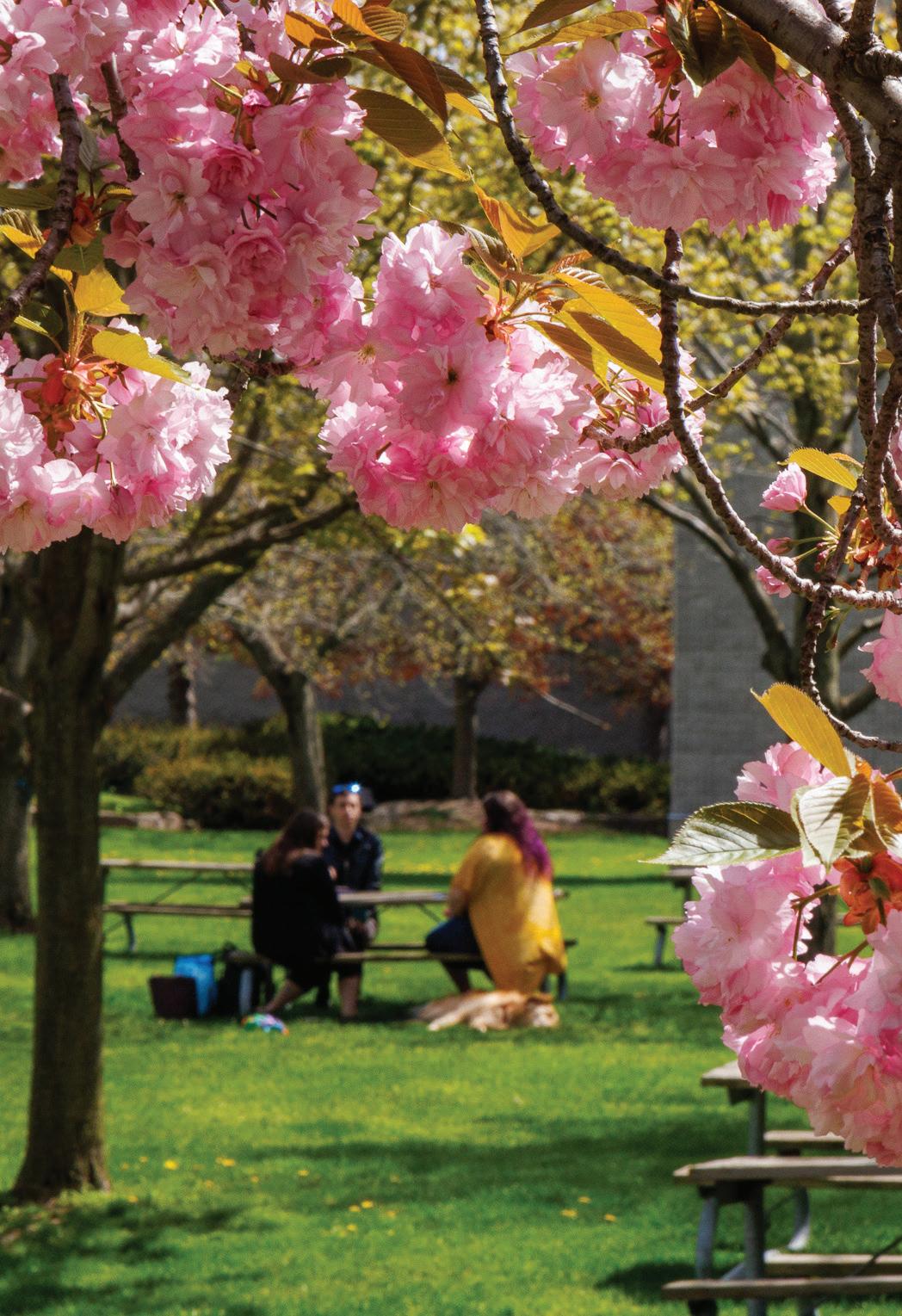
Overall operating costs, excluding inter-fund expenses, were $0.2 million higher than budget. The following represent the largest variances to budget:
• Scholarships and fellowships were lower than budget by $2.3 million driven by lower than budgeted international enrolment and savings associated with funding changes to the Brock Scholars program.
• Repairs and maintenance and capital replacement were higher than budget by $1.9 million. Of this, $0.5 million relates to the Burlington Campus, which was directly offset by inter-fund revenue from the Strategic fund, and $0.4 million was related to increased software and licences purchases. Most of the remaining increase is a result of deferring maintenance in the capital budget causing the University to see increased repair and maintenance needs.
• Purchased services were higher than budget by $0.7 million, mainly driven by higher-than-budgeted contracted services for student recruitment commissions and food services, as well as higher professional fees for physicians.
• The annual discretionary appropriations established at year-end, and approved by the Board of Trustees, are also inter-fund transfers and represent the portion of the University’s funding surplus that is reinvested in the University’s Strategic Priorities at year-end. The 2023-24 year ended in a balanced result with no additional surplus, therefore there are no discretionary appropriations this year.
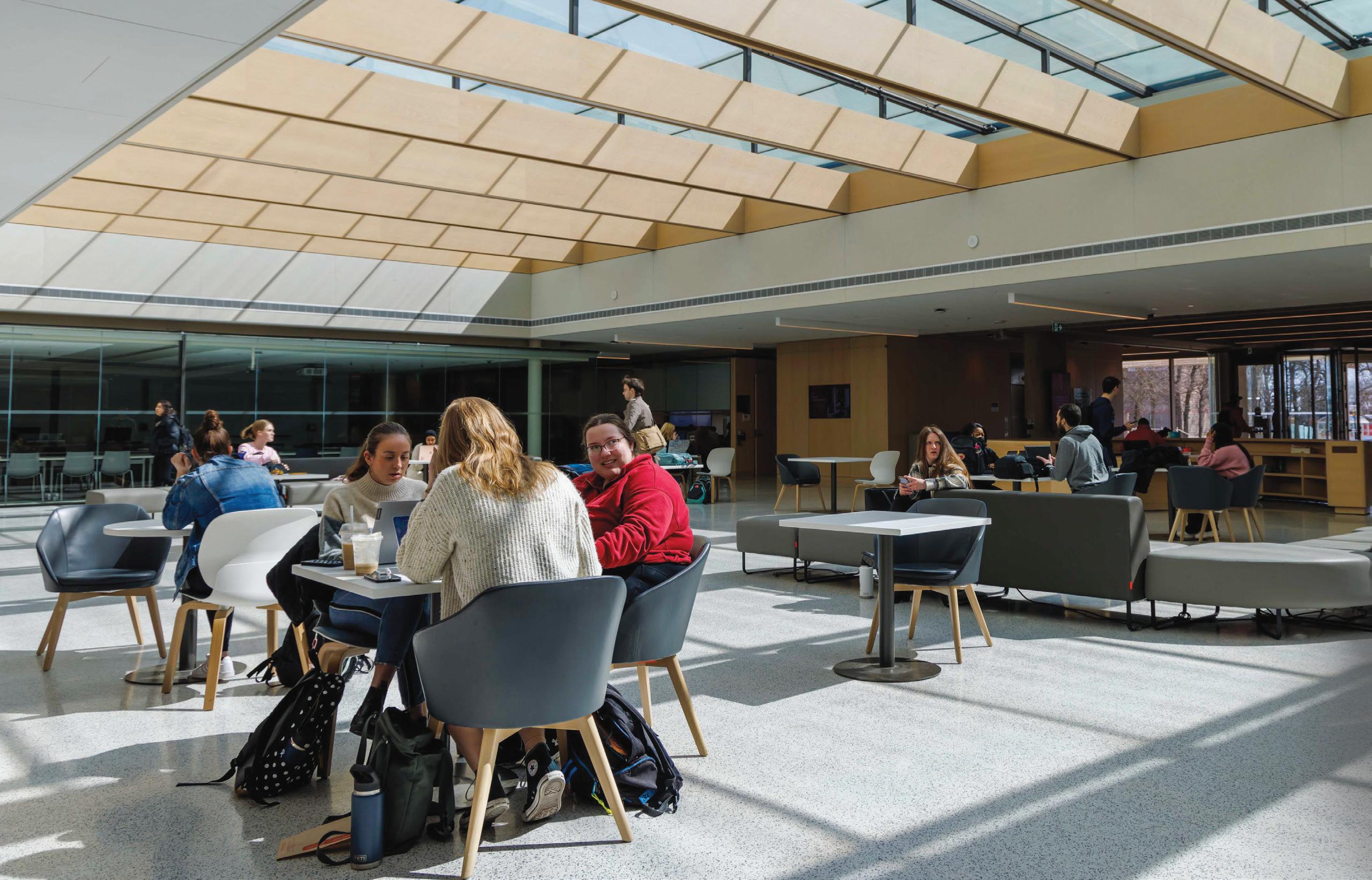
Figure 53 presents the budgeted revenue and costs of each of the University’s responsibility centres based on each unit’s responsibility for establishing their respective budgets. The division of the responsibility centres is not meant to measure each unit’s total revenue impact or fully loaded costs. As such, revenue shown in the Faculties does not include an allocation of global tuition or operating grant revenue. Revenue shown by the responsibility centre only reflects the tuition, fee and grant revenue specifically budgeted in the respective centres as well as any other revenue generated within each centre.
Total costs, as shown in the responsibility centres, include salaries, benefits and direct non-personnel costs (operating costs). Support service costs have not been allocated in these figures. For example, the majority of utility costs are shown collectively as part of the Utilities, Taxes and Insurance responsibility centre and the majority of scholarships, bursaries and fellowships are reported as part of the Scholarships, Bursaries and Fellowships responsibility centre.
As detailed in the Revenue and expense allocation model section of this report, the revenue and expense allocation model has been developed and allocates all budgeted revenue and net operating
costs of the University, including support service costs, to each of the six teaching Faculties. The Provost, working with Financial Services, is utilizing this model as a planning tool.
It should also be noted that direct, externally funded research revenue and matching expenses are not included in the budget, given revenue is recognized as the grants are spent and has a net zero impact on the budget, and that asking researchers to forecast timing of spend would be an unnecessary administrative burden.
With mitigation efforts still in place throughout the year, we note that teaching Faculties closed out 2023-24 with a $1.4-million positive variance to budget. Shared Services units were under budget by $1.2 million, with savings across several units including Information Technology Services, Financial Services, Human Rights and Equity Services, University Secretariat and the Office of Government and Community Relations. Student Specific units were also under budget by $0.6 million, mainly in the Office of the Registrar and Student Wellness and Accessibility. Finally, Ancillary and Housing Services’ net contribution to the University for 2023-24 was $8.8 million, $2.2 million higher than budget.
Funding budget by responsibility centre
Figure 53 details the funding budget by responsibility centre, which in turn are grouped into one of the following categories:
Teaching Faculties, Academic Support, Student Specific, Ancillary, Shared Services, Space and Global.
Figure 53: Funding budget by responsibility centre ($000s)
(1) Includes the following: the Offices of the President; the Vice-President, Administration; the Provost and Vice-President, Academic; the Vice-President, Research; the Vice-Provost and Associate Vice-President, Academic; the Associate Vice-President, Students; the Vice-Provost, Teaching and Learning; the Vice-Provost, Indigenous Engagement; the Vice-President, External; as well as the operating costs of the Board of Trustees and Senate.
The revenue and expense allocation model was developed through a consultative process with allocation methodologies approved by the Deans and Provost. The model has three key functions to support academic and financial planning of the University:
• Enhances the understanding of how revenues are generated and how costs are incurred and allocated at the Faculty level in a transparent manner.
• Supports longer-term resource allocation decisionmaking for academic units.
• Establishes an incentive mechanism to ensure yearend surplus funds are allocated to the Faculties and to support institutional strategic priorities.
The third purpose refers to the funding of the Deans’ Strategic Funds, which are allocated based on a two-envelope basis. The first envelope recognizes the contributions of the Faculties that have a positive contribution margin (i.e. expenses less than revenue) after space costs, recognizing this contribution margin level reflects expenses Faculties have direct control over. The second envelope provides an incentive for year-over-year improvements in contribution margin, after space costs, for all Faculties through a method
that allocates a share of the surplus based on the yearover-year improvement. The use of these funds are bound by the terms of reference with the Provost and are to support the institutional strategic priorities.
Figure 55 reports the full actual funding results for 2023-24 using the Revenue and Expense Allocation Model. Figure 54 is a visual representation of the 2023-24 actual results versus budget, detailing expenses as a percentage of revenues allocated by each Faculty and in total. The model identifies four Faculties generating net positive contributions, and two Faculties requiring additional funding from these positive contributions to support their operations. Through guidance from the Senior Academic Leadership Team, this model reports all tuition based on students in seats. Regardless of a student’s home Faculty, all tuition is allocated to the course students take and the Faculty the course belongs to.
Going forward, the model will continue to be evaluated and adjustments to the model will be made, in consultation with the Senior Academic Leadership Team where appropriate, to ensure the model is meeting its goals as well as supporting the Institutional Strategic Plan.
(1) See page 59 for units included in Space Costs. Note: Space Costs are allocated directly to Faculties in this section. The space costs related to Academic Support, Student Support and Shared Services units are included in the respective lines in the allocation model. (2) Excludes Research Support Fund grant revenue as shown separately as part of revenue. (3) See page 58 and 59 for details of units included in these categories.
A full reconciliation of the differences between the audited NFPS basis of accounting and the funding basis will follow; however, there are two key observations regarding these differences. The funding basis accounts are a subset of the audited NFPS accounts, which represent operating/unrestricted activities of the University and the unrestricted fund. The Examination of the Net Assets section, starting on page 64, describes each of the funds of the University.
The largest difference between the funding basis and the NFPS basis is the treatment of capital transactions. On a funding basis, all principal payments on debt and all fund transfers into separate capital funds to purchase capital and related costs are considered expenses. The function of transferring the funds into
separate capital fund accounts is a mechanism to ensure cash is actually set aside to cover capital and related costs. Therefore, when the cash is transferred to separate capital funds, the funding basis treats the transfer as an expense. On a NFPS basis, capital purchases are not expensed, as they result in an asset, and are included on the Statement of Financial Position. These assets are subsequently expensed through the process of amortization over the useful life of the asset. This is similar to an individual who might purchase a home where the home becomes part of an individual’s net worth statement net of any loans used to purchase the home.
Figures 56 and 57 reconcile the 2023-24 financial results from a funding basis to the NFPS basis. The adjustments represent differences in reporting between the NFPS basis and the funding basis and are primarily for noncash transactions and timing differences. Each of these differences are described below:
1. Course fees – Course fee revenue, along with the offsetting spending, is included as part of the NFPS Financial Statements. This revenue and spending is not recorded as part of the funding basis. The 2023-24 actual course fee spending, along with the offsetting revenue, represents the adjustments.
2. Capital grants – The Facilities Renewal Program and other similar grants received by the University are used for capital purchases and are included as part of deferred capital contributions in the NFPS Financial Statements and later amortized over the useful life of the capital item it funded. However, on a funding basis, these grants are recorded as revenue when it's received. The actual Facilities Renewal Program Funds, received in 2023-24 represents the adjustment.
3. Research, including fellowships – Research grants for restricted purposes and the offsetting research expenses, including fellowships, have not been included on a funding basis; however, they are included as part of the Financial Statements. The actual research spending and related revenue represent the adjustments.
4. Amortization, net – Amortization is a non-cash expense and is therefore not included in the funding basis. For Financial Statement purposes, the capital asset amortization is recorded to reflect the usage of capital assets, and amortization of deferred capital contributions (restricted external donations and grants) is being amortized over the useful life of the assets they have funded.
5. Endowment and trust spending – Spending in the endowment fund and non-endowed trust fund, mainly in the form of scholarships, is included as an expense with offsetting revenue as part of the NFPS Financial Statements. This spending is not recorded as part of the funding basis (with the exception of inter-fund transactions). The 2023-24 actual endowment and trust spending, along with the offsetting revenue, represents the adjustments.
6. Principal payments – Principal payments of long-term debt are recorded as an expense in the funding basis and are not considered an expense in the NFPS Financial Statements as they represent a reduction of a liability. The 2023-24 actual principal payments represent the adjustment.
7. Non-capital purchases in capital and related project fund – These purchases are reported as an expense in the NFPS Financial Statements but are not recorded in the funding basis. The expense would have been recognized in the funding basis upon funding the reserve. The 2023-24 actual non-capital purchases represent the adjustment.
8. Capital purchases in operating – Capital purchases made as part of operating spending are recorded as an expense on a funding basis, while they are recorded as an asset in the NFPS. The 2023-24 actual capital purchases made as part of operating spending represent the adjustment.
9. Post-retirement benefits – This amount is actuarially determined and represents the actuarial adjustment to employee future benefits related to current service. An adjustment is required because this amount represents an expense in the NFPS Financial Statements; however, since it doesn’t reflect a cash outflow, it is not recorded in the funding basis.
The internal chargeback revenue and expenses of $12.469 million included in the funding basis represent internal charges between departments within the University and are eliminated for the NFPS Financial Statements. The inter-fund revenue of $9.687 million and the inter-fund expenses of $30.426 million represent transfers between unrestricted, internally restricted and externally restricted funds. These transfers are also eliminated for NFPS Financial Statements.
The University is split into a number of different funds, which constitute the University’s net assets. The funds and a related description are as follows:
• Unrestricted – On a funding basis, activity runs through the unrestricted fund. In fact, the balance of this fund represents the sum of historical surpluses and deficits on a funding basis, which also represents the uncommitted cash balance of the University. If the balance is positive, the University has uncommitted cash, and if it is negative, it has over-extended by spending or committing more cash to projects than it actually has. The net uncommitted cash of the University at April 30, 2024 is $0.104 million.
• Internally restricted – This fund represents funds set aside and committed for future use and is really the sum of a number of funds as follows:
– Capital and infrastructure projects and reserves (capital and related project fund) – This fund was established to transfer funds from the unrestricted fund and other funds into the capital and related projects accounts. As items are capitalized, they are transferred to the invested in capital assets fund. – Operating project accounts – This fund includes support for ongoing strategic initiatives normally funded out of the unrestricted fund, including the unspent portion of the funding of the Dean’s Strategic funds, and ensures these funds can be made available in future years if unspent. It recognizes that, for certain types of activities, we need to take into consideration timing issues with respect to when cash is actually collected and expenses actually incurred as many activities at the University do not align perfectly to the fiscal year.
– Research funds with no external obligations – For the most part, unspent research funds are captured under deferred revenue on the Statement of Financial Position in the NFPS statements. This occurs when there is an external restriction to spend the funds on specific activities or items. The research with no external obligations fund was established to recognize that some research funding has no external restrictions.
– Start-up funds – This fund includes all unspent startup funds awarded to faculty.
– Professional expense reimbursement (PER) accounts – This fund includes all unspent PER and accountable allowance amounts provided to faculty and some senior administration.
– Sinking fund – This fund represents a portion of the sinking fund principal contributions for repayment of the University debentures as well as the related investment income. The total sinking fund balance of $14.5 million is reported in restricted investments. The difference represents the Zone fitness centre expansion fees which for accounting purposes is not recognized as revenue and instead recognized as deferred capital contributions and therefore not included in internally restricted net assets.
– Employee future benefit reserve – This fund was established to set aside funds to pay our employee future benefit liability. The liability on our Statement of Financial Position is $30.5 million as of April 30, 2024. It also includes the Pension Stabilization Reserve, which was established in 2017-18.
– Debt repayment reserve – This fund was established to work towards repaying the outstanding debt of the University. This reserve was fully utilized in 2022-23 as part of the repayment of the loan for the Roy and Lois Cairns Health and Bioscience Research Complex.
– Contingency reserve – This fund was established to cover potential unanticipated costs with current or previous projects and any future litigation as well as to address mitigation. The additional funding in 2023-24 is related to section 211 input tax credits for Public Service Bodies (PSB). Given that this tax credit is subject to change-in-use-rules, whereas the University could be required to repay all or a portion of this rebate in the future, it has been the practice of the University to reserve these credits for contingency and support of the financial position of the University. The opening balance also included $1.5 million set aside out of the 2019-20 year-end surplus for COVID-19 mitigation, which was not utilized during the pandemic due to successful mitigation plans, of which $0.74 million was used to support the operating budget in 2023-24.
– Canada Games Park Capital Reserve – As part of Canada Games Park, the University will contribute annually its proportionate share of an amount equal to 1.5 per cent of the initial hard costs of constructing the facility into a capital reserve fund held by the Niagara Region for future capital repairs and improvements. The fund balance represents the and 2023-24 contributions plus interest income.
– Strategic initiative fund – This fund represents the unspent portion of funds established to support institutional, academic and research priorities with one-time funding. In 2023-24 $1.13 million was used to support Professional and Continuing Studies and $1.1 million to support Engineering. In 2023-24 there
were no additional discretionary appropriations made to this fund due to the balanced funding results. See Figure 59 for a breakdown of the balances in this fund.
– Encumbrance reserve – This fund was established to accommodate situations where the budgeted funding is available and approved by the Executive team and a purchase commitment is established but the goods have not yet been received by year end. Given the balanced funding results, there were no available funds to reserve at year-end related to these types of commitments.
• Invested in capital assets – This fund represents the balance of capital assets net of long-term debt, deferred capital contributions and debt payments. In year, the activity in the fund relates to funding, debt or deferred capital contributions and capital assets purchases. The majority of capital assets that were purchased were transacted through either the funding budget recorded in the unrestricted fund
discussed above or the capital and infrastructure projects and reserve, which is included in the internally restricted fund, also discussed above.
• Endowments – The endowment fund represents the activity and balance of our endowments.
• Employee future benefits – This fund is the sum of the pension asset and post-retirement obligations. Unlike the other reserve funds, the post-retirement benefits in this fund remains unfunded. The Board of Trustees approved a plan to reserve $0.9 million annually for a number of years to fund these obligations. A further $1.6 million was established in 2017-18 as a pension stabilization reserve. Investment income on this reserve remains restricted for employee future benefits.
Figure 58 details the balances of a number of the internally restricted funds as of April 30, 2024 by teaching Faculty as well as the Library.
(1) Includes $7.3 million resulting from the sale of the Hamilton Campus and other asset sales.
(2) Dean’s Strategic Funds are overseen by the Provost and, once approved by the Board of Trustees, these funds are transferred to the Faculty Operating Project Account reserves.
Revenues increased to $395 million, or 4.2 per cent, more than last year. Student fees decreased $2.7 million, or 1.5 per cent, due to a decrease in international enrolment headcount of 5.1% offset by an increase in international tuition rate as well as the impact of domestic tuition anomalies. Domestic enrolment was flat compared to 2022-23. Government grants increased by $8.0 million, or 8.1 per cent, driven by additional MCU funding related to Nursing clinical education of $3.0 million, the STEM Sustainability Grant of $2.6 million and Teacher Education Grant of $1.2 million. Ancillary operations revenue increased $2.0 million, seen in housing services, parking, dining, and conference services. Sales and service revenue increased $1.0 million, or 5.0 per cent, mainly driven by increased program fees and other revenue related to sports and recreation programs. Investment income increased $2.6 million, and research grant revenue increased $2.6 million. Gain on sale of assets decreased $0.3 million related to the sale of the Hamilton Campus.
Expenses increased to $410 million, or 6.5 per cent more than last year. Salaries and benefits increased $17.4 million, or 7.1 per cent. $14.7 million of the increase relates to salary costs with the remainder related to benefits and pension. Other operating expenses increased $2.5 million, or 5.5 per cent. Increases were seen in travel, conference, hospitality, student recruitment fees and food service related to increased conference held on campus. Scholarships, fellowships and bursaries decreased $1.2 million, or 3.4 per cent, mainly related to changes to the Brock Scholar program implemented in 2023-24. Expendable equipment, repairs and maintenance increased $3.6 million, or 30.8 per cent, primarily due to increases in software and license purchases, computer equipment and laboratory equipment purchases and building repairs and maintenance. Amortization of capital assets increased $2.5 million due to the completion of various capital projects now eligible to begin amortizing, including Mackenzie Chown A Block renovations, 3401 Schmon Parkway, Inniskillin Hall renovations and VPMI.
Assets decreased to $829 million, or 1.4 per cent, compared to last year. Capital assets additions were $10.1 million, including assets related to Mackenzie Chown A Block renovation and Village Residence renewal, which were offset by $34.9 million in amortization. Current assets were flat to 2022-23. Restricted investments increased $10.0 million, and the employee future benefit asset decreased $0.1 million.
Liabilities decreased to $574 million, or 0.5 per cent from last year. Deferred capital contributions decreased $3.0 million, or 1.4 per cent, and the employee future benefits obligation increased $1.0 million. Accounts payable and accrued liabilities increased $6.0 million, or 22.9 per cent, primarily due to an increase in payroll remittances due to timing of pay period around year-end. Deferred revenue decreased $1.4 million due to a decrease in deferred spring tuition and student fees and the deferral of the gain from the sale of the Hamilton Campus being fully recognized.
Net assets decreased to $255 million, or 3.4 per cent from last year. The funds included in the endowments, invested in capital assets, and internally restricted and unrestricted reserves are all supported by cash or restricted investments.
The following section provides additional information regarding Brock’s treasury portfolio, financial health metrics, pension plan, endowment and capital investments.
Yield on operating investments for 2023-24 was 4.77 per cent (3.71 per cent 2022-23). Yield on operating investment income increased for a second year in a row due to continued rising inflation that impacted interest rates on deposit accounts and GICs. The cash deposit rates are linked to the Bank of Canada overnight target rate plus an adjustment factor. As at April 30, 2024, the deposit interest rate was 5.75 per cent which represents a 50bps improvement over April 30, 2024. As at April 30, 2024, $47.1 million was invested in GICs with an average yield and duration of 5.61 per cent and 1.8 years respectively ($39.6 million with 3.74 per cent yield and 1.6 years duration respectively in 2022-23). In comparison, Government of Canada two-year bonds had a yield of approximately 4.34 per cent (3.65 per cent at April 30, 2023).
The Mawer Balanced Fund used for investing the University sinking funds and Employee Future Benefits Reserve earned a 7.22 per cent return in 2023-24 (6.14 per cent return in 2022-23). The sinking fund
requires a compounding 5.0 per cent rate of return to achieve the target $93 million by December 2045. The Fiscal Framework provides for additional future contributions of $0.4 million commencing in 2024-25 and another $1.95 million in 2028-29 when the Sunlife residence loan is repaid. It is expected, given the asset mix of the balanced fund, that returns will experience short-term volatility. Mawer has historically generated exceptional returns, earning an annualized return of seven per cent before management fees (0.25 per cent) over the last 134 months since the establishment of this investment. No change is planned to this investment strategy at this time. A second sinking fund with the same investment strategy was established in 2021-22 to fund the $125 million series B debenture repayment. Additional information on this strategy is outlined in the Financing section of the Budget Reports. A deposit of $1.5 million consisting of funds from the Zone construction ancillary fee and funding allocated from ancillary revenues as part of the series B debenture repayment strategy was added to the investment balance in 2023-24.
Figure 65 summarizes the investment income yearover-year and versus budget, Figure 66 graphs the cumulative monthly investment income performance, Figure 67 details the monthly cash flow over the past five years, Figure 68 represents a year-over-year variance analysis of investment holdings and Figure 69 is an analysis of fees for investment management.
66: Cumulative
9,000 8,500 8,000 7,500 7,000 6,500 6,000 5,500 5,000 4,500 4,000 3,500
Figure 67: Monthly cash flow – historical trend month-end balances ($000s)
After outlining for accessibility I then copied and pasted July and Aug on top of those bits so they would be visible
(1) Average balance does not include externally restricted trusts with separate investment strategies. Brock currently has four externally restricted segregated trust investments with income of $0.15 million not included in the figures above.
69: Analysis of fees for investment management
These financial health metrics compare us to other universities in the comprehensive category as detailed in Figure 70.
(1) Certain Brock 2023 metrics have been adjusted due to an update in reporting.
(2) Calculated using financial information from 13 other comprehensive universities. Certain 2022 metrics have been updated due to revisions in certain universities’ financial statements.
(3) The $20-million repayment of the Roy and Lois Cairns Health and Bioscience Research Complex load during 2022-23 causes the one-time swing in this metric.
The metrics can be explained as follows:

• The primary reserve ratio refers to the amount of cash available to cover operations. At April 2024, Brock has approximately 81 days (2023 – 89 days) of expendable reserves.
• The next two ratios (debt burden ratio and interest burden per cent) describe how Brock utilizes a greater proportion of its annual operating expense to fund debt obligations.
• The interest coverage ratio measures the ability to fund interest charges from cash generated through operations. The ratio has fallen below the 2.0 target set by the Board of Trustees due to reduced earnings before interest, deprecation, and amortization (EBIDA) resulting from increased use of reserves to fund operating expenses and the result of a balanced funding result compared to funding surpluses generated in prior years. The ratio considered to be the minimum standard by Morningstar DBRS, the University's credit rating agency, is 2.5 for an A (High) rating.
• The viability ratio is essentially how much of the institution’s debt could be paid off with expendable resources. The average institution in our category could pay off all of their debt with expendable resources. Brock can pay off 39 per cent and therefore is comparably more vulnerable to unplanned events.
• The net operating revenues ratio provides an indication of the extent to which we are generating positive cash flows in the long run to be financially sustainable.
• The employee future benefits per student metric acknowledges certain obligations are owed to certain employees in the future when they retire or cease employment. The negative balance here represents the fact that the obligation is larger than the actual cash set aside to pay these benefits. Despite the fact that we are in a deficit position, Brock compares favourably to our peers on this metric.
• The endowment per student is an indicator of external support for the institution. Endowments provide relief to the operating budget as a source of additional funding to support areas of the institution’s mission. Our endowment per student has seen some growth but still remains less than our peers.
Our metrics have been improving over the past eight years, which is a positive sign and the result of a lot of hard work by everyone in the University community.
The comparative April 2024 figures of the other universities in the comprehensive category were not available at the time of writing this annual report.
Figure 71 details the current and projected external debt of the University which is within financial metric ranges of the University’s current credit rating.
Morningstar DBRS maintained Brock’s credit rating on February 22, 2024, with the Issuer Rating and Senior Unsecured Debentures rating of “A (high)” with “Stable” trends. The credit ratings are underpinned by the University's position as a midsize comprehensive university in the Province of Ontario (rated AA (low) with a Positive trend by Morningstar DBRS), supportive enrolment outlook, and relatively strong financial risk assessment (FRA) metrics. The credit ratings remain constrained by the current challenging operating environment, which can be characterized by the constrained funding and tuition framework and the potential impact of uncertain international relations on international student mobility. Morningstar DBRS noted that a positive credit rating action, though unlikely, depends on a combination of sustained improvement in financial risk assessment metrics and an improvement in Morningstar DBRS' assessment of one or more critical rating factors. A negative credit rating action could arise from a significant and sustained deterioration in operating results or from a material increase in financial leverage.
The existing sinking fund for the Series A Debenture issued in 2005 continues to trend ahead of schedule due to strong investment returns. As at April 30, 2024, the balance of the sinking fund was $9.6 million which exceeds the expected value of $8.5 million based on the growth schedule for the fund. The additional funding is due to a fund rate of return since inception exceeding the 5.0 per cent required rate of return. A second sinking fund was also established in 2021-22 to fund the repayment of the Series B 2020 Debenture issued in 2020. The funding of this sinking fund is sourced from student ancillary fees established for the Zone fitness centre and ancillary services revenues consistent with the business cases for the student experience infrastructure projects funded by the debenture. The balance of the second sinking fund as at April 30, 2024, was $4.9 million which exceeds the expected value of $4.6 million based on the growth schedule for the fund.

The actuarial valuation on the pension plan completed as at July 1, 2022, indicated the plan was 99 per cent funded on a going-concern basis (98 per cent as at Jan. 1, 2020, valuation) and 105 per cent on a solvency basis (106 per cent as at Jan. 1, 2020, valuation). The going concern deficit improved slightly due to higher interest rates increasing the discount rate that reduces the present value of the liabilities. The actuary sets the expected rates of returns based on industry best practices guided by the Canadian Institute of Actuaries. The University has no control or influence over these assumptions used by the actuary. The going concern deficit of $5.3 million ($12.7 million as at Jan. 1, 2020, valuation) has required special payments into the plan of $0.5 million representing an annual savings of $1.0 million compared to the last valuation. In addition, current service cost payments for the plan of $14.1 million for a total cost to the University of $14.6 million annually. Employees also contribute to the money purchase component of the plan (defined contribution) an additional $8.2 million resulting in an employer to employee funding ratio of 1.8 to 1.0. An updated valuation is required before the next triannual valuation date of July 1, 2025.
Additional information on the pension plan may be found at brocku.ca/human-resources/pension/
The endowments of the University continue to grow. Figure 73 summarizes the activity of the last six years. Figure 74 details the Top 10 endowments by size of investments as of April 30, 2024.
Figure 73: Endowment activity
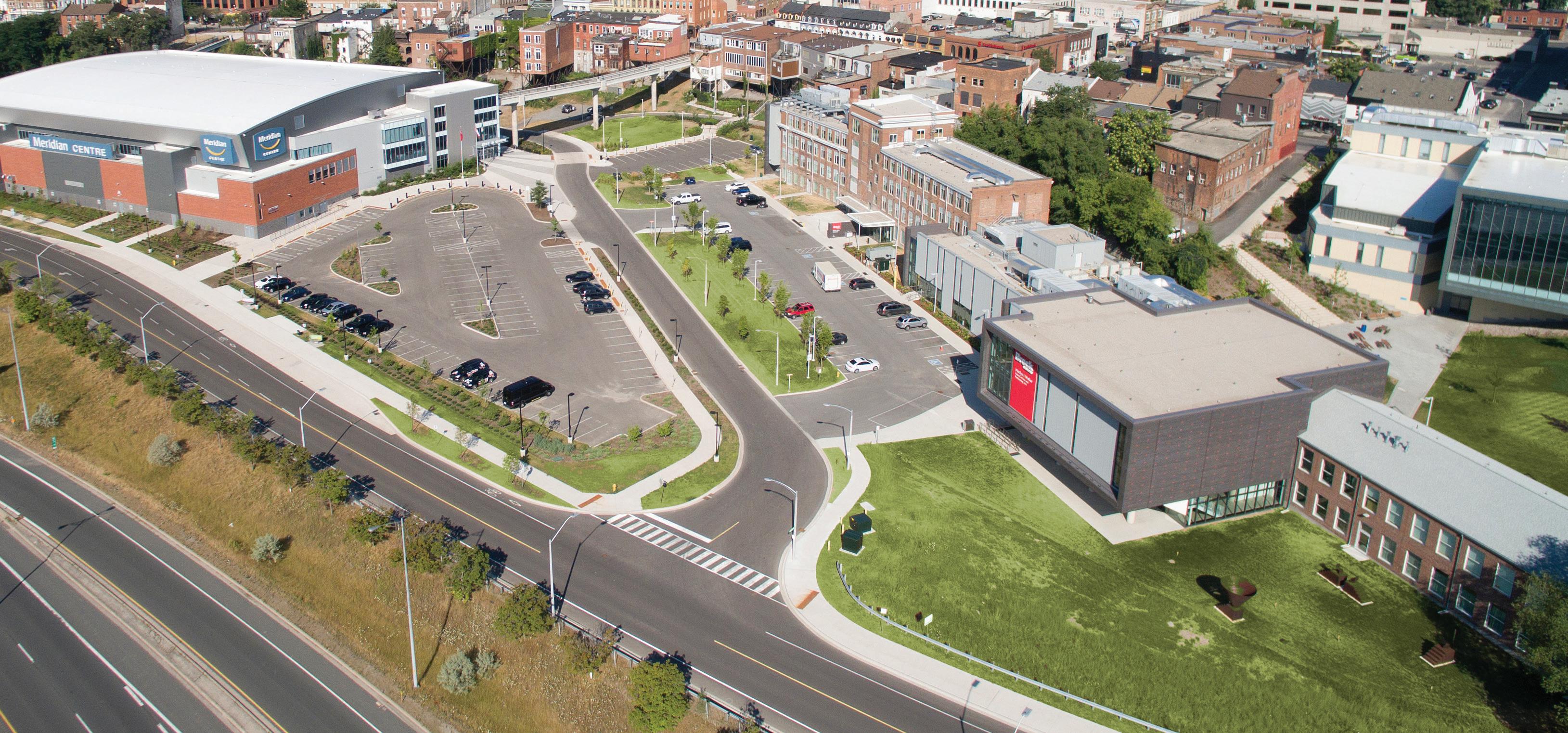
In total, the University purchased $10.1 million in capital additions during 2023-24. These additions represent investments in facilities and information technology supporting a number of projects, including the Village Residence renewal, District Energy Water Supply Replacement and Mackenzie Chown A Block renovation, as well as other smaller capital items such as furniture and computers. Typically, one of the main sources of funding for these projects, other than external debt, donations and government grants, is from the capital and infrastructure projects and reserves fund (capital fund). As detailed in Figure 75, $19.1 million of funding from the capital fund supported the information technology purchases ($1.9 million) and facilities management purchases ($17.2 million) during the year.
Figure 75 illustrates the 2023-24 activity of the capital fund, which makes up a component of the internally restricted net asset balance in the audited NFPS Financial Statements. During 2023-24, $12.7 million was transferred into the fund from operating. In year, an additional $2.7 million in funding was added to the fund from other reserves including the encumbrance reserve and the strategic reserve, $0.03 million from endowments and $1.3 million from internal research and operating projects.
The key to the capital and infrastructure projects and reserves fund is that funding transferred into it is held in reserve at year-end for spending the following year. This recognizes that capital and related projects can often span one or more years and could have timing delays due to planning or regulatory requirements.
Enterprise Risk Management (ERM) continues to evolve and mature at Brock. ERM helps inform decision-making and support the achievement of the University’s strategic objectives and priorities through the identification, assessment and management of principal risks. Brock’s ERM program does not seek to eliminate risk. Rather, the aim of ERM is to identify and understand both risks and opportunities and develop appropriate strategies –including mitigation and optimization – to help achieve the University’s goals.
Adapted from best practices and international standards, Brock’s principal risk assessment process below facilitates a structured approach for risk-informed decision-making and promoting innovative and collaborative solutions in support of Brock’s strategic plan. ERM must be fluid to adapt to the ever-changing environment and complex University landscape. Through the leadership and commitment of the University, ERM is positioned to continue to support the University in achieving objectives.

The Administration of Brock University is responsible for the preparation of the financial statements, the notes and all other financial information contained in this annual report.
The Administration has prepared the financial statements in accordance with Canadian accounting standards for not-forprofit organizations. The Administration believes that the financial statements present fairly the University’s financial position as at April 30, 2024 and the results of its operations for the year then ended.
In fulfilling its responsibilities and recognizing the limits inherent in all systems, the Administration has developed and maintains a system of internal control designed to provide reasonable assurance that University assets are safeguarded from loss and that the accounting records are a reliable basis for the preparation of the financial statements.
The Board of Trustees is responsible for ensuring that the Administration fulfills its responsibilities for financial reporting and is ultimately responsible for reviewing and approving the financial statements. The Board of Trustees carries out its responsibility for review of the financial statements principally through the Audit Committee. The members of the Audit Committee are not officers or employees of the University. The Audit Committee meets with the Administration, as well as the external auditors, to discuss the results of audit examinations and financial reporting matters and to satisfy itself that each party is properly discharging its responsibilities. The auditors have full access to the Audit Committee with and without the presence of the Administration.
The financial statements for the year ended April 30, 2024 have been reported on by KPMG LLP, Chartered Professional Accountants, Licensed Public Accountants, the auditors appointed by the Board of Trustees. The auditors’ report outlines the scope of their audit and their opinion on the financial statements.

Lesley Rigg, Ph.D. President and Vice-Chancellor

Joshua Tonnos, MBA, CPA, CGA Chief Financial Officer & Associate Vice-President Financial Services
KPMG LLP
Vaughan Metropolitan Centre
100 New Park Place, Suite 1400 Vaughan, ON L4K 0J3
Canada
Telephone 905 265 5900
Fax 905 265 6390
To the Trustees of Brock University
Opinion
We have audited the financial statements of Brock University (the University), which comprise:
the statement of financial position as at April 30, 2024
the statement of operations for the year then ended
the statement of changes in net assets for the year then ended
the statement of cash flows for the year then ended
and notes to the financial statements, including a summary of significant accounting policies (Hereinafter referred to as the "financial statements").
In our opinion, the accompanying financial statements present fairly, in all material respects, the financial position of the University as at April 30, 2024, and its results of operations, its changes in net assets and its cash flows for the year then ended in accordance with Canadian accounting standards for not-for-profit organizations.
Basis for Opinion
We conducted our audit in accordance with Canadian generally accepted auditing standards. Our responsibilities under those standards are further described in the "Auditor's Responsibilities for the Audit of the Financial Statements" section of our auditor's report.
We are independent of the University in accordance with the ethical requirements that are relevant to our audit of the financial statements in Canada and we have fulfilled our other ethical responsibilities in accordance with these requirements.
We believe that the audit evidence we have obtained is sufficient and appropriate to provide a basis for our opinion.
Management is responsible for the preparation and fair presentation of the financial statements in accordance with Canadian accounting standards for not-for-profit organizations, and for such internal control as management determines is necessary to enable the preparation of financial statements that are free from material misstatement, whether due to fraud or error.
In preparing the financial statements, management is responsible for assessing the University's ability to continue as a going concern, disclosing as applicable, matters related to going concern and using the going concern basis of accounting unless management either intends to liquidate the University or to cease operations, or has no realistic alternative but to do so.
Those charged with governance are responsible for overseeing the University's financial reporting process.
Our objectives are to obtain reasonable assurance about whether the financial statements as a whole are free from material misstatement, whether due to fraud or error, and to issue an auditor's report that includes our opinion.
Reasonable assurance is a high level of assurance, but is not a guarantee that an audit conducted in accordance with Canadian generally accepted auditing standards will always detect a material misstatement when it exists.
Misstatements can arise from fraud or error and are considered material if, individually or in the aggregate, they could reasonably be expected to influence the economic decisions of users taken on the basis of the financial statements.
As part of an audit in accordance with Canadian generally accepted auditing standards, we exercise professional judgment and maintain professional skepticism throughout the audit.
We also:
Identify and assess the risks of material misstatement of the financial statements, whether due to fraud or error, design and perform audit procedures responsive to those risks, and obtain audit evidence that is sufficient and appropriate to provide a basis for our opinion.
The risk of not detecting a material misstatement resulting from fraud is higher than for one resulting from error, as fraud may involve collusion, forgery, intentional omissions, misrepresentations, or the override of internal control.
Obtain an understanding of internal control relevant to the audit in order to design audit procedures that are appropriate in the circumstances, but not for the purpose of expressing an opinion on the effectiveness of the University's internal control.
Evaluate the appropriateness of accounting policies used and the reasonableness of accounting estimates and related disclosures made by management.
3
Conclude on the appropriateness of management's use of the going concern basis of accounting and, based on the audit evidence obtained, whether a material uncertainty exists related to events or conditions that may cast significant doubt on the University's ability to continue as a going concern. If we conclude that a material uncertainty exists, we are required to draw attention in our auditor's report to the related disclosures in the financial statements or, if such disclosures are inadequate, to modify our opinion. Our conclusions are based on the audit evidence obtained up to the date of our auditor's report. However, future events or conditions may cause the University to cease to continue as a going concern.
Evaluate the overall presentation, structure and content of the financial statements, including the disclosures, and whether the financial statements represent the underlying transactions and events in a manner that achieves fair presentation.
Communicate with those charged with governance regarding, among other matters, the planned scope and timing of the audit and significant audit findings, including any significant deficiencies in internal control that we identify during our audit.

Chartered Professional Accountants, Licensed Public Accountants
Vaughan, Canada
June 27, 2024
As at April 30, 2024, with comparative information for 2023 (in thousands of dollars)
Liabilities and Net Assets
Commitments (note 13) Contingencies (notes 14 and 15)
The accompanying notes are an integral part of these financial statements.
On behalf of the Board:


Trustee Trustee
Year ended April 30, 2024, with comparative information for 2023 (in thousands of dollars)
The accompanying notes are an integral part of these financial statements.
Year ended April 30, 2024, with comparative information for 2023 (in thousands of dollars)
April 30, 2024
Year ended April 30, 2024, with comparative information for 2023 (in thousands of dollars)
Cash provided by (used in): Operating activities: Excess of expenses over
(deduct) non-cash items:
(241)
The accompanying notes are an integral part of these financial statements.
Year ended April 30, 2024 (in thousands of dollars)
Incorporated in 1964, Brock University (the “University” or “Brock”) flourishes through the scholarly, creative, and professional achievement of its students, faculty and staff. Offering a range of undergraduate and graduate programs, Brock fosters teaching and research of the highest quality. As a diverse and inclusive community, the University contributes positively to Canada and beyond through our imagination, innovation and commitment.
These financial statements reflect the assets, liabilities, net assets, revenue, expenses and other transactions of all of the operations controlled by the University. Accordingly, these financial statements include the academic, administrative and other operating expenditures funded by fees, grants and other general revenue; restricted purpose funds, including endowment, research and trust; and the ancillary operations, such as residence and parking.
The University is a charitable organization and, as such, is exempt from income taxes under the Income Tax Act (Canada).
These financial statements have been prepared in accordance with Canadian Accounting Standards for Not-For-Profit Organizations in Part III of the CPA Canada Handbook. The financial statements include the financial results of the University and its investment in a joint venture (note 1(o) and note 19).
(a) Cash and cash equivalents:
Cash equivalents are held for the purpose of meeting short-term commitments and are readily convertible to a known amount of cash and are subject to an insignificant amount of risk of changes in value. Cash equivalents include money market funds and investments with maturities of three months or less from the date of acquisition. Cash and cash equivalents are valued at fair value.
(b) Inventories:
Inventories are stated at the lower of cost, which is determined using the weighted average cost approach and net realizable value.
(c) Investments:
Investments are recorded at fair value.
(d) Capital assets:
Purchased capital assets are recorded at cost less accumulated amortization. Contributions of capital assets are capitalized at fair market value at the date of contribution. Capital assets are amortized on a straight-line basis using the following annual rates:
to 33 1/3%
Construction costs are capitalized as work progresses and amortization commences as work is substantially completed. The carrying amount of capital assets is tested for recoverability whenever events or changes in circumstances indicate that the carrying amount may not be recoverable. An impairment loss is recognized in the Statement of Operations when the asset’s carrying amount is not recoverable and exceeds its fair value.
(e) Works of art:
Contributed works of art are recorded as revenue and expense, at fair market value, at the date of contribution. If the fair market value is not determinable, the contribution is recorded at a nominal amount. Artwork purchases are expensed as acquired.
(f) Endowments:
Contributions restricted for endowments consist of restricted donations received by the University and donations internally designated by the Board of Trustees, in the exercise of its discretion. The endowment principal is required to be maintained intact. The investment income generated from endowments must be used in accordance with the various purposes established by donors or the Board of Trustees. The University ensures, as part of its fiduciary responsibilities, that all funds received with a restricted purpose are expended for the purpose for which they were provided.
Investment income on endowments that is available for spending at the discretion of the University or is available for spending as the conditions established by the donor have been met has been recorded in the Statement of Operations. University policy has been established with the objective of protecting the real value of the endowments by having an overall investment objective for endowments to earn, over time, a rate of return at least equal to the total of inflation plus spending and the costs of administering the funds. The spending rate is reviewed annually. Investment income in excess of administration costs and spending allocations will be added to capital. In the case of endowments where the original donation adjusted for inflation is higher than the market value of the fund, spending may be temporarily suspended in order to preserve donor capital.
(g) Internally restricted net assets:
The University internally restricts the use of portions of its unrestricted net assets for specific future use. Transfers to internally restricted net assets only occur once authorized by the Board of Trustees. When expenses are incurred, expenses are charged to the Statement of Operations and the balance of internally restricted net assets is reduced accordingly.
(h) Revenue recognition:
The University follows the deferral method of accounting for contributions. Unrestricted contributions are recognized as revenue when received or receivable, if the amount to be received can be reasonably estimated and collection is reasonably assured. Pledged donations are recognized on a cash basis since pledges are not legally enforceable claims. Contributions externally restricted for purposes other than endowment are deferred and recognized as revenue in the year in which the related expenses are recognized. Contributions restricted for the purchase of capital assets are deferred and amortized into revenue on a straight-line basis at a rate corresponding with the amortization rate for the related capital asset. Endowment contributions are recognized as direct increases in net assets in the year in which they are received. Student fees are recognized as revenue when courses and seminars are held. Sales and services and ancillary revenue is recognized at the point of sale or when the service has been provided.
(i) Employee future benefits:
The University provides pension benefits to employees primarily through a hybrid pension plan. Under this arrangement, the University and employees are required to make contributions based on a specific percentage of the employee’s earnings. The amount of pension benefits provided to
employees is based on the accumulation of contributions and investment earnings thereon, when the employee retires, subject to a guaranteed minimum benefit amount. Certain faculty are also members of the Teacher’s Superannuation Fund, a multi-employer defined benefit plan.
The University provides other non-pension benefits to most of its employees, including retiree medical and dental benefits until the age of 65, accumulating sick leave benefits, pre-retirement leave benefits and for specific employees a health-care spending account.
The University accrues its benefit obligations for these employee future benefits as the employees render the services necessary to earn them. The actuarial determination of the accrued benefit obligations for these employee future benefits uses the projected benefit method prorated on service. For purposes of measuring the benefit obligations, the funding valuation is used for the pension and the accounting valuation is used for the non-pension benefits.
The University recognizes the amount of benefit obligations net of the fair value of plan assets in the Statement of Financial Position. Current service and finance costs are expensed during the year, while remeasurement and other items, representing the total of the difference between actual and expected return on plan assets, actuarial gains and losses, and past service costs, are recognized as a direct increase or decrease in net assets within the employee future benefits fund. In years between valuations, a roll-forward technique is used to estimate the accrued benefit obligations.
The most recent actuarial valuation of the pension plan for funding purposes was as of July 1, 2022 and the next required valuation will be as of July 1, 2025.
The most recent actuarial valuation of the non-pension benefits for accounting purposes was as of April 30, 2024.
(j) Derivative financial instrument and hedge accounting:
The University is party to interest rate swap agreements used to manage the exposure to market risks from changing interest rates. The University applies hedge accounting for its interest rate swaps. Payments and receipts under the interest rate swaps are recognized as adjustments to interest expense on long-term debt.
The University’s policy is not to utilize derivative financial instruments for trading or speculative purposes.
(k) Pledges:
Pledges are recorded as revenue on a cash basis and accordingly are not recognized as an asset in the Statement of Financial Position. The total amount of pledges outstanding is approximately $18,106 (2023 – $16,755) and is expected to be received as follows:
(l) Contributed services and materials:
Volunteers contribute an indeterminable number of hours per year as well as various materials used by the University in carrying out the provision of services. Because of the difficulty of determining their fair value, contributed services and materials are not recognized in these financial statements.
(m) Financial instruments:
Financial instruments are recorded at fair value on initial recognition. Freestanding derivative instruments that are not in a qualifying hedging relationship and equity instruments that are quoted in an active market are subsequently measured at fair value. All other financial instruments are subsequently recorded at cost or amortized cost, unless management has elected to carry the instruments at fair value.
Transaction costs incurred on the acquisition of financial instruments measured subsequently at fair value are expensed as incurred. All other financial instruments are adjusted by transaction costs incurred on acquisition and financing costs, which are amortized using the effective interest rate method.
Financial assets are assessed for impairment on an annual basis at the end of the fiscal year if there are indicators of impairment. If there is an indicator of impairment, the University determines if there is a significant adverse change in the expected amount or timing of future cash flows from the financial asset. If there is a significant adverse change in the expected cash flows, the carrying value of the financial asset is reduced to the highest of the present value of the expected cash flows, the amount that could be realized from selling the financial asset or the amount the University expects to realize by exercising its right to any collateral. If events and circumstances reverse in a future period, an impairment loss will be reversed to the extent of the improvement, not exceeding the initial carrying value.
(n) Use of estimates:
The preparation of financial statements in conformity with Canadian Accounting Standards for Not-For-Profit organizations requires management to make estimates and assumptions that affect the reported amounts of assets and liabilities and the disclosure of contingent assets and liabilities at the date of the financial statements and the reported amounts of revenue and expenses for the period reported. Items subject to such estimates and assumptions include the carrying amount of capital assets, valuation allowances for receivables, valuation of derivative financial instruments, accrued liabilities and obligations related to employee future benefits. Actual results could differ from those estimates. These estimates are reviewed periodically, and, as adjustments become necessary, they are reported in income in the year in which they become known.
(o) Joint ventures:
Joint ventures are accounted for under the proportionate consolidation method. The University accounts for its interest in the joint venture on a line by line basis in the financial statements and eliminates any inter-organizational transactions and balances. Accounting policies of the joint venture are conformed to those of the University before it is proportionately consolidated.
The fair values of the cash and cash equivalents are comprised of:
Included in buildings and furnishings and equipment is $3,160 (2023 –$2,626) of construction in progress that was not amortized during the year.
The increase in net book value of capital assets is due to the following:
Deferred contributions represent unspent externally restricted grants and donations for research and other restricted purposes. The changes in the deferred contributions balance are as follows:
Fixed rate instruments:
Earp student residence:
7.2% loan with certain residences and investments pledged as security, with monthly blended payments of principal and interest of $91, due October 1, 2028
Lowenberger student residence:
7.2% loan with certain residences and investments pledged as security, with monthly blended payments of principal and interest of $72, due October 1, 2028
Student Experience Projects:
2.49% interest only payments with the principal repayable in full on or before June 3, 2024
3401 Schmon Parkway:
Serial mortgage with fixed monthly principal payments of $129 and interest at 3.91%, due on June 28, 2027
Debt maturities:
The following are the future minimum annual debt principal repayments due over the next five fiscal years and thereafter:
Thereafter$34,532
(a) Bank credit facility:
The University has available operating line of credit of $20,000 that was not utilized at April 30, 2024. The interest rate on the operating line of credit, when drawn, is the Bank’s Prime lending rate from time to time minus 0.75% (the prime rate at April 30, 2024 was 7.20%). Amounts are due on demand.
(b) Interest rate swap:
The University has entered into interest rate swap agreements to manage the volatility of interest rates.
The University converted a net notional of $14,400 of floating rate longterm debt relating to the Student Experience Projects. The fixed rate paid under the interest rate swap is 2.49%. The maturity date of the interest rate swap is the same as the maturity date of the associated long-term debt of June 3, 2024.
The University converted a net notional of $15,500 of floating rate longterm debt relating to the acquisition of 3401 Schmon Parkway. The fixed rate paid under the interest rate swap is 3.91%. The maturity date of the interest rate swap is the same as the maturity date of the associated longterm debt of June 28, 2027.
The notional and fair values of the interest rate swap agreements is as follows:
The fair value of the swaps are determined using the benchmark valuation methodology without consideration for non-performance or counterparty risk.
Series A debenture payable, bearing interest at 4.967%, $2,309 payable interest only semi-annually, due December 14, 2045
Deferred refinancing expenses (2,444) (2,505)
Series B debenture payable, bearing interest at 3.033%, $1,896 payable interest only semi-annually, due May 17, 2060
The fair value of the debenture payable due December 14, 2045 (Series A) is $90,502 (2023 – $98,387). Fair value has been determined using the market quote of the debenture which as at April 30, 2024 was $97.31 (2023 – $105.79).
The fair value of the debenture payable due May 17, 2060 (Series B) is $82,794 (2023 – $90,589). Fair value has been determined using the market quote of the debenture which as at April 30, 2024 was $66.24 (2023 –$72.47).
The University has established two internal sinking funds for each of the Series A and Series B debentures and purchased units in the Mawer Balanced Fund with a market value of $9,613 (2023 – $8,954) and $4,876 (2023 – $3,136) respectively. It is the University’s policy to annually review the sinking fund investment structure and required contributions so that the ultimate proceeds of the investments will be applied against the Series A and B debenture payable.
Deferred capital contributions represent the unamortized amount of donations and grants received for the purchase of capital assets. The amortization of deferred capital contributions is recorded as revenue in the Statement of Operations. The changes in the deferred capital contributions balance are as follows:
Balance, beginning of year $214,400 $216,335
Less amortization of deferred capital contributions (10,782) (9,464)
Add contributions restricted for capital purposes 7,169 7,529
Balance, end of year $210,787 $214,400
The balance of unamortized capital contributions related to capital assets consists of the following:
Unamortized capital contributions used to purchase assets $209,201 $214,228
Unspent capital contributions 1,586 172 $210,787 $214,400
(a) Pension benefit plan:
The University sponsors a hybrid pension plan, which contains both a defined contribution component and a defined benefit component. The defined contribution component of the plan is funded by University and member contributions and provides a benefit to members based on their accumulated account balance. The defined benefit component of the plan is funded by University contributions and provides for a guaranteed minimum benefit. The latest actuarial funding valuation was performed as at July 1, 2022. The next required actuarial funding valuation will be completed on or before July 1, 2025.
The University measured its accrued benefit obligation and fair value of plan assets for accounting purposes as at April 30, 2024. A summary of the financial status of the plan is as follows: 2024 2023
The principal actuarial assumptions adopted in measuring the University’s employee future benefits obligation are as follows:
The contribution and the amount expensed for the University’s pension benefit plans are as follows:
Current service cost (defined contribution) $14,172 $13,256
Current service cost (defined benefit) 839 1,313
Unfunded liability (going concern) 611 1,463
Total $15,622 $16,032
(b) Other benefit plans:
The University has a number of non-pension future benefits that are available to most of its employees. These non-pension benefits include retiree medical and dental benefits until the age of 65, accumulating sick leave benefits and pre-retirement leave benefits and, for specific employees, a health-care spending account. The latest actuarial accounting valuation was performed as at April 30, 2024.
A summary of the financial status of the plans is as follows:
The University established an internally restricted reserve (note 12) for employee future benefits of $8,742 (2023 – $8,252).
The principal actuarial assumptions adopted in measuring the University’s employee future benefits obligation are as follows:
The expense for the University’s other benefit plans is as follows:
(a) Change in endowment net assets: The following were recorded directly to endowment net assets:
It is the University’s policy to endow any amounts not made available for spending during the fiscal year. These amounts are recorded as a direct increase to endowments as preservation of capital.
(b) Contributions restricted for endowments consist of the following:
(c) Ontario Student Opportunity Trust Fund, Phase One:
Externally restricted endowments include grants provided by the Government of Ontario from the Ontario Student Opportunity Trust Fund (“OSOTF”) matching program, Phase One to award student aid as a result of raising an equal amount of endowed donations. The OSOTF represents a portion of the endowment fund.
Schedule of Changes in Expendable Funds Available for Awards:
Schedule of Changes in Endowment Balance based on book and market value:
(d) Ontario Student Opportunity Trust Fund, Phase Two:
Externally restricted endowments include grants provided by the Government of Ontario from the OSOTF matching program, Phase Two to award student aid as a result of raising an equal amount of endowed donations. The OSOTF represents a portion of the endowment fund.
Schedule of Changes in Expendable Funds Available for Awards:
Schedule of Changes in Endowment Balance based on book and market value:
(e) Ontario Trust for Student Support:
Externally restricted endowments include grants provided by the Government of Ontario from the Ontario Trust for Student Scholarship (“OTSS”) matching program to award student aid as a result of raising an equal amount of endowment donations to an allocated ceiling. The OTSS represents a portion of the endowment fund.
Schedule of Changes in Expendable Funds Available for Awards:
Schedule of Changes in Endowment Balance based on book and market value:
(a) Net assets invested in capital assets consist of the following:
(b) The change in net assets invested in capital assets is calculated as follows:
Internally restricted net assets for allocation and spending in subsequent years consist of the following:
(a) As at April 30, 2024, the estimated costs to complete approved capital and renovation projects are approximately $33,503 (2023 – $1,397), which will be funded by government grants, donations, debt and operations.
(b) The following are the future minimum annual operating lease payments due over the next five fiscal years and thereafter:
The University is a member of the Canadian Universities Reciprocal Insurance Exchange (CURIE). CURIE is a pooling of the property damage and public liability insurance risks of its members. All members pay annual deposit premiums that are actuarially determined and are subject to further assessment in the event members’ premiums are insufficient to cover losses and expenses. No assessment has been made for the year ended April 30, 2024.
The nature of the University’s activities are such that there may be litigation pending or in the prospect at any time. With respect to claims at April 30, 2024, the Administration believes that the University has valid defenses and appropriate insurance coverage in place. In the event any claims are successful, Administration believes that such claims are not expected to have a material effect on the University’s financial position. No provision has been accrued in these financial statements.
Included in accounts payable and accrued liabilities are government remittances payable of $5,174 (2023 – $347), which includes amounts payable for payroll-related taxes.
The Statement of Operations consolidates all the revenue and expense activity of the University. The schedule below separates externally restricted research revenue and expense by financial statement line item for increased transparency of research grant activity.
Financial risks have not changed significantly as compared to the prior year.
(a) Credit risk:
Credit risk refers to the risk that a counterparty may default on its contractual obligations resulting in a financial loss. The University deals with creditworthy counterparties to mitigate the risk of financial loss from defaults.
The carrying amount of accounts receivable is valued with consideration for an allowance for doubtful accounts. The amount of any related impairment loss is recognized in the statement of operations. Subsequent recoveries of impairment losses related to accounts receivable are credited to the statement of operations. The balance of the allowance for doubtful accounts at April 30, 2024 is $6,996 (2023 –$5,519).
(b) Interest rate risk:
The University is exposed to interest rate risk on its fixed and floating interest rate financial instruments. Fixed-interest instruments subject the University to a fair value risk while the floating-rate instruments subject it to a cash flow risk.
The University mitigates interest rate risk on its term debt through derivative financial instruments (interest rate swaps) that exchange the variable rate inherent in the term debt for a fixed rate (see note 6). Therefore, fluctuations in market interest rates would not impact future cash flows and operations relating to the term debt. There have been no changes in interest rate risk exposure as compared to the prior year.
(c) Currency risk:
The University is exposed to foreign currency risk with respect to its investments denominated in foreign currencies, including underlying investments in pooled funds denominated in foreign currencies because the fair value and future cash flows will fluctuate due to the changes in the relative value of the foreign currencies against the Canadian dollar. The University manages currency risk through monitoring activities and adherence to the investment policy. The University currently holds forward contracts to hedge 50% of its exposure to US dollar equity investments held in the endowment fund. At year end the University had forward foreign exchange contracts to sell currency with an aggregated value of $16,394 USD (2023 – $14,530 USD). At April 30, 2024 there is an approximate $411 unrealized foreign exchange loss resulting from the mark to market of foreign exchange contracts.
(d) Liquidity risk:
Liquidity risk is the risk of being unable to meet cash requirements or to fund obligations as they become due. Accounts payable and accrued liabilities are generally paid shortly after year end. For longterm debt, the University has established investments to provide for cash flow requirements (notes 6 and 7).
(e) Market risk:
Market risk is the risk that the fair value of future cash flows of a financial instrument will fluctuate as a result of market factors. The University’s investment policies detail the objectives, management and guidelines of investment, as well as providing for an appropriate risk tolerance strategy.
The University entered into a Consortium agreement with the Niagara Region, City of St. Catharines and City of Thorold (together with the University, the “Consortium”) for the construction of Canada Games Park, which was substantially complete on February 11, 2022. The facility is located on lands owned by the University and leased to the Consortium for a nominal fee until February 2060. A decision to either renew the land lease or transfer facility ownership to the University is scheduled for year 30 of the agreement in 2052. The University has a 25% ownership in the Canada Games Park facility and is a one-third operating partner of the facility. The financial results of the Canada Games Park are proportionately consolidated with those of the University.
The amounts included in these financial statements are as follows:
Capital assets of the Canada Games Park proportionately consolidated include the following:
30, 2024
April 30, 2023
The University will contribute annually its proportionate share of an amount equal to 1.5% of the initial hard costs of constructing the facility into a capital reserve fund held by the Niagara Region for future capital repairs and improvements. The balance of the capital reserve as of April 30, 2024 is $783 (note 3).

Brock University Niagara Region
1812 Sir Isaac Brock Way St. Catharines, ON L2S 3A1 Canada
905 688 5550 annualreport@brocku.ca brocku.ca/finance